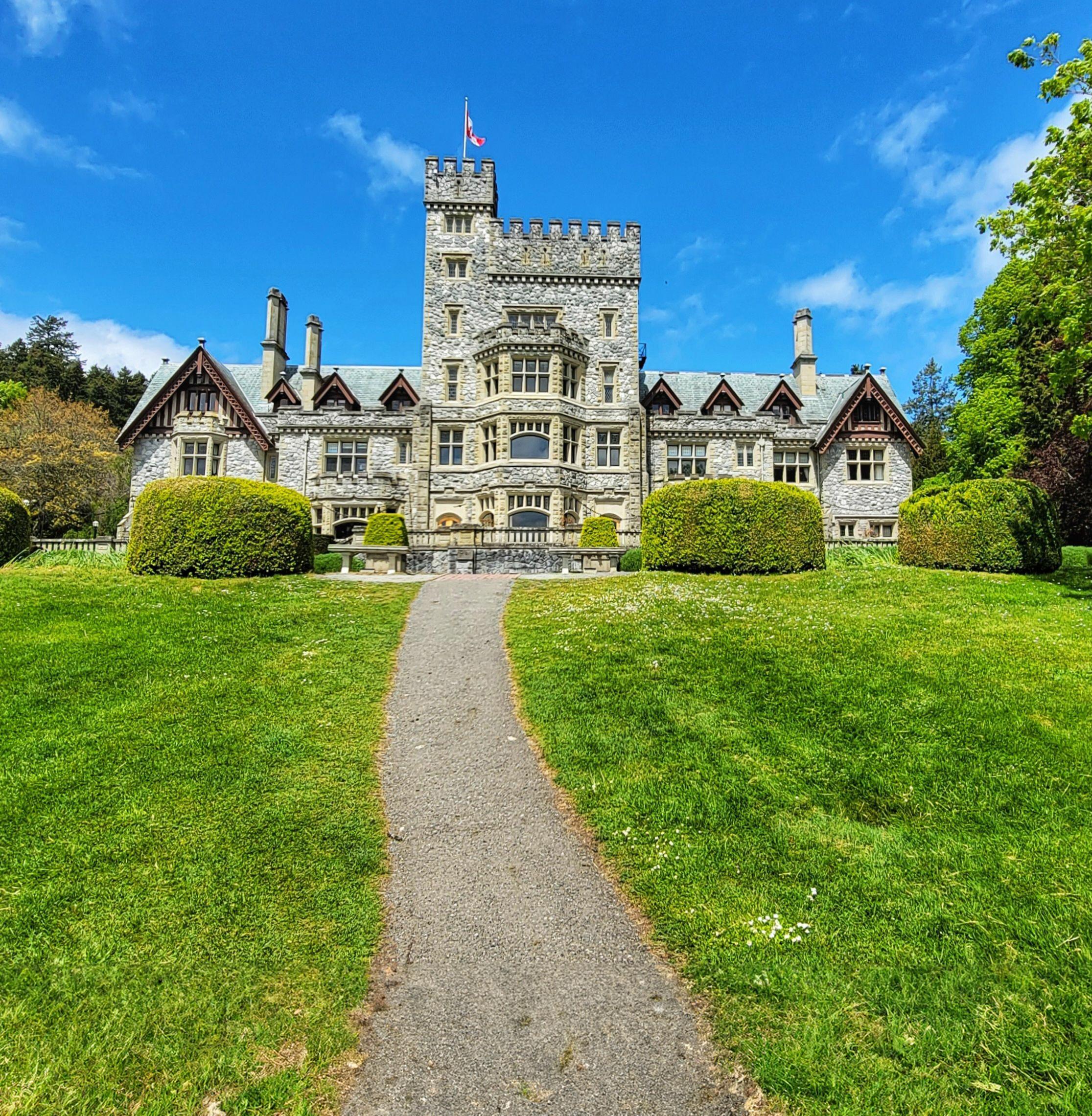
VICTORIA’S CASTLES
TASTE OF SPRING FIVE FORAGING FAVOURITES SPOTTING GIANTS WHALE WATCHING 101 BCMAG.CA DESTINATION GREENWOOD SPRING/2024 THE NISGA'A POLE RETURNS HOME
A TOUR BACK TO BC'S AFFLUENT PAST
A
TAKE

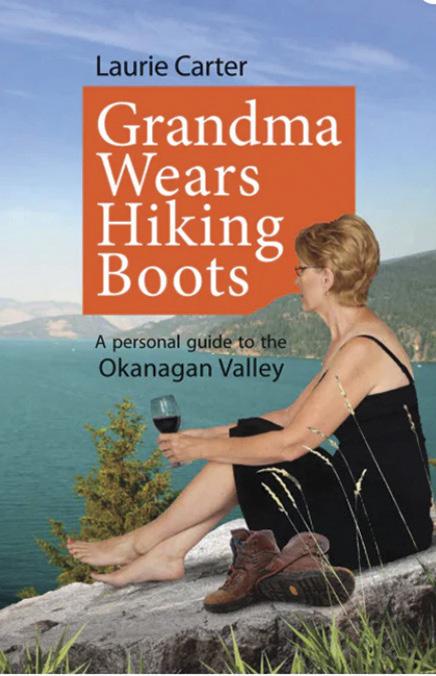

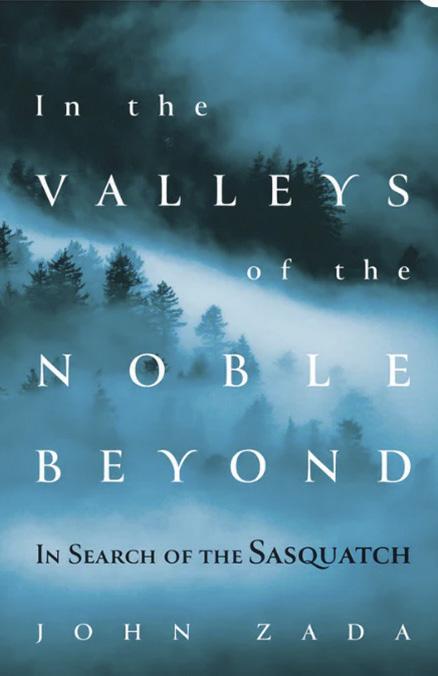
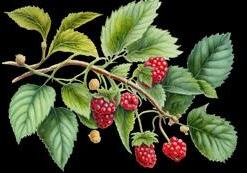


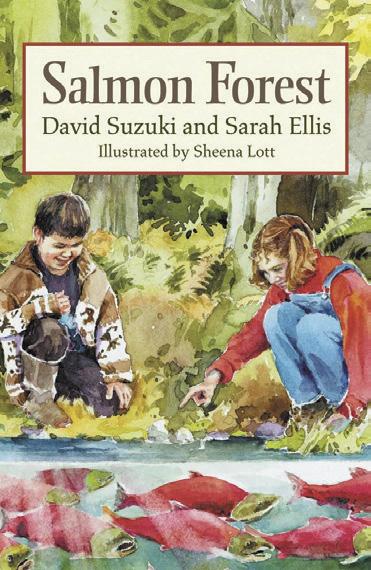

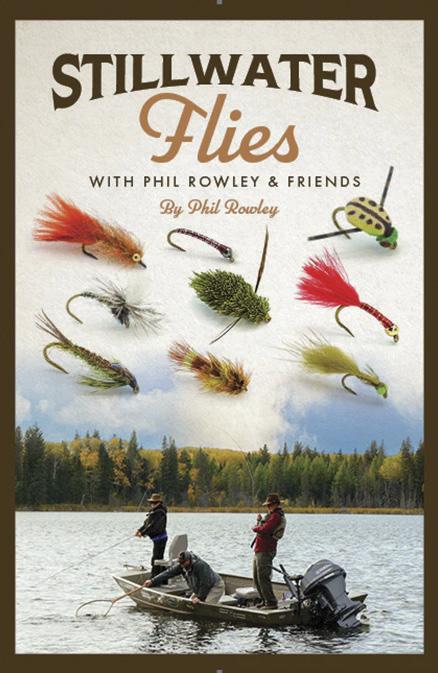
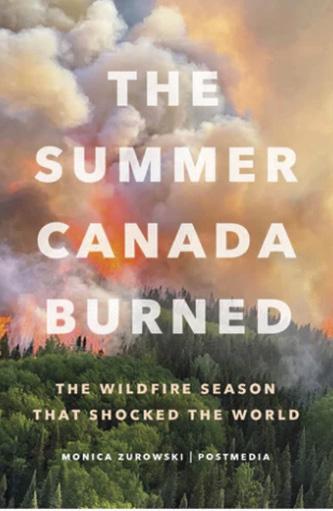
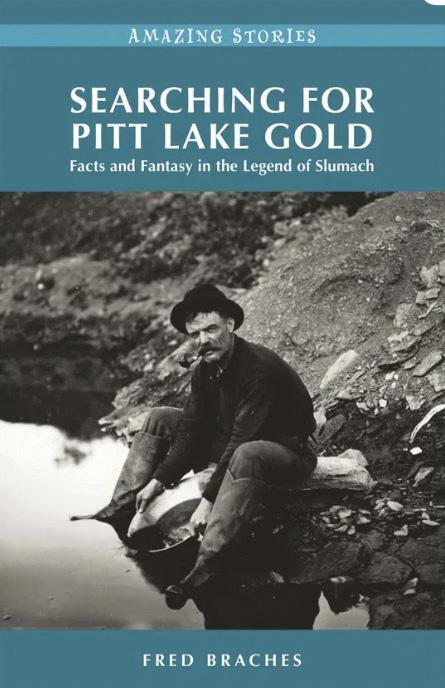
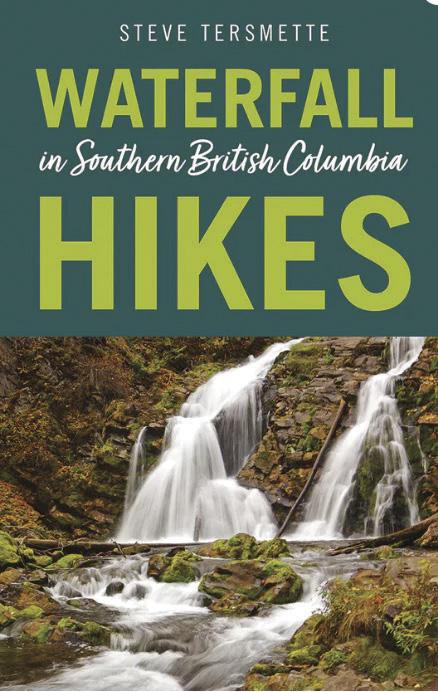
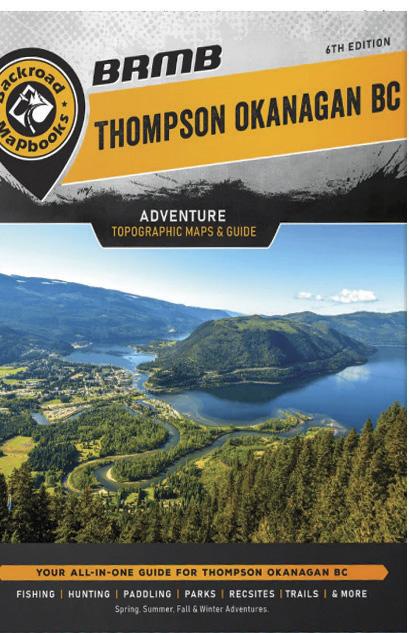

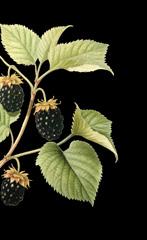
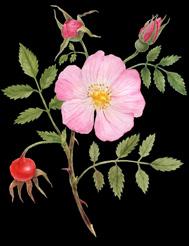

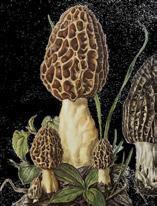


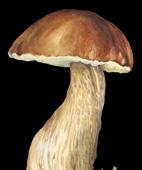


Outdoors LOCAL AUTHORS • LOCAL TOPICS Family Adventures Nature Hotspots Whimsical Fishing Because you Love British Columbia Magazine, you may also enjoy these titles: W Harvest BC A FORAGER’S GUIDE TO EDIBLE PLANTS OF BRITISH COLUMBIA 71 71 W ild Harvest BC BY LINDA GABRIS $24.95 ISBN: 978-1-7778764-2-5 www.opmediagroup.ca Linda Gabris has been venturing into the outdoors to harvest wild edibles for over 60 years. The lessons taught to her by her grandparents, of responsibility, sustainability and a connection to the land are as important today as they were then. This book shares those lessons as well as tips and practical advice in personal, easy-to-read style. Combined with scientific field guide, Wild Harvest BC is the perfect companion book to take with you on your outdoor adventures. Over 70 recipes ranging from Wild Cream of Asparagus Soup to Hazel’s Hazelnut Brittle will help you turn your foraging finds into delicious, hearty meals. So get out there and enjoy the bounty of Mother Nature. Wild Harvest BC thebookshack.ca Visit Our Bookstore For More Great Reading! 1-800-663-7611 NEW
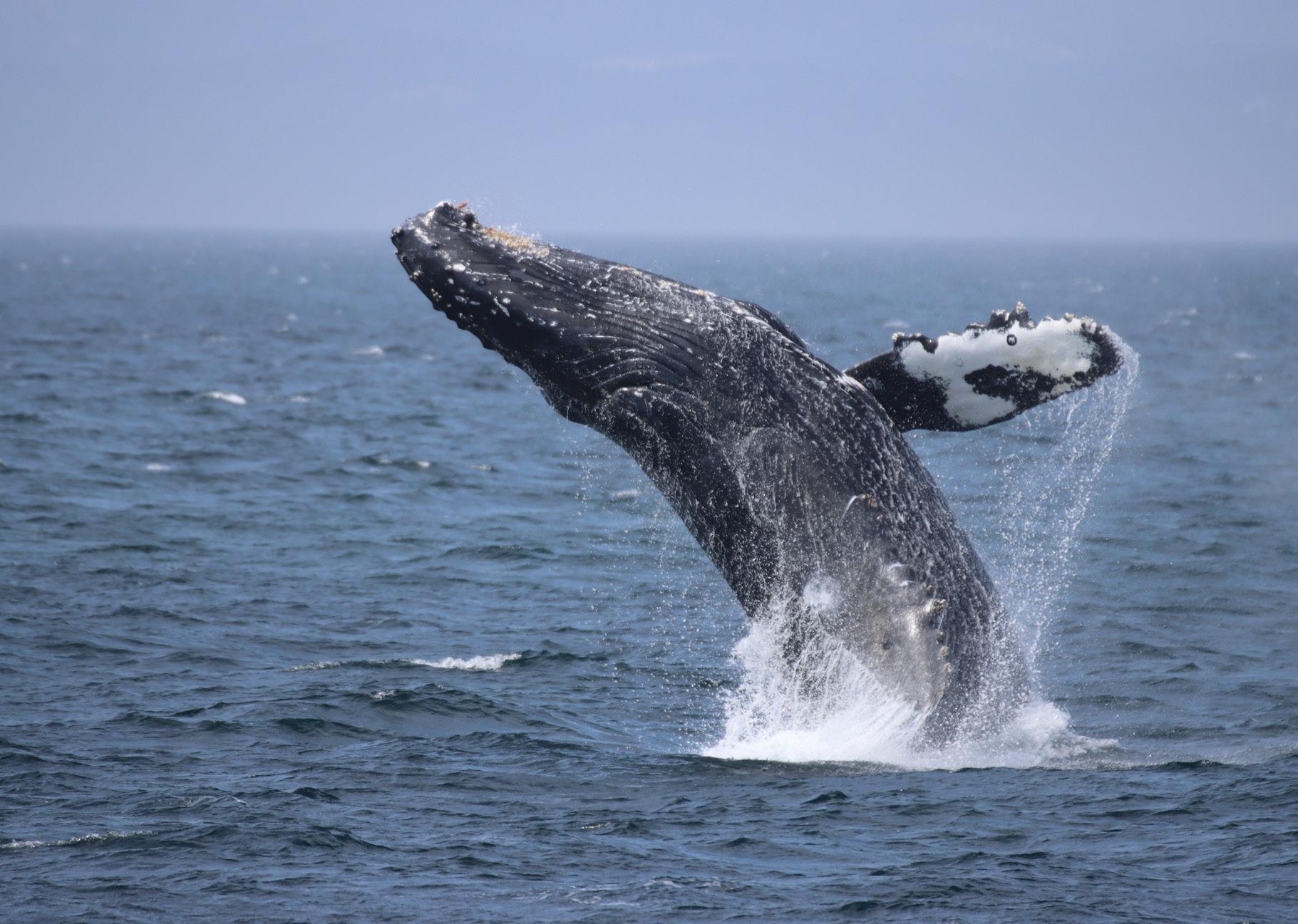
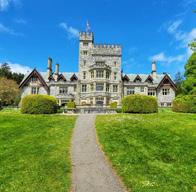
BC MAG • 3 Contents 24 Gulf Island Goodies Jump on the Gulf Islands ferry and treat yourself with this unique dine-around adventure, featuring six delights that you won’t find in the city 30 Spotting Giants A guide to whale watching in BC 42 The Long Journey Home After being stolen and sent to a Scottish museum in 1929, the Ni’isjoohl Memorial Pole makes its long way home to the Nass Valley 50 Ready for Ts’zil Two Indigenous BC teens ski a mountain that defines their people 58 BC’s Top Five Forageable Foods of Spring A beginner’s guide to foraging 66 Hummingbirds at Risk The flying jewels of British Columbia are on the decline, but there are things you can do to help 4 Editor’s Note 6 Mailbox 8 Due West 16 Destination Greenwood 74 Person and Place Bruce McLellan 82 Tales of BC A Dogfish Bonanza IN EVERY ISSUE Cover Photo Anna70/Wirestock Creators/Adobe Stock VOLUME 66 - ISSUE 01 SPRING 30 Hatley Castle FEATURES 16 10 24 50 42 14
EDITOR’S NOTE
THIS PAST MONTH we’ve received letters from residents in a remote valley expressing concern over visitors to their area not respecting private property. Specifically, some residents experienced visitors entering their yards, wandering through their homes and taking pictures. This is of particular concern to the owners of properties devastated by wildfire, who are worried that they will see more of the same on their properties this upcoming summer.
I think everyone can agree that nobody has the right to enter someone’s home or property without permission, especially if it’s clearly livedin or recently used. I’m honestly shocked to hear that someone would have the gall to enter a person’s yard or home in the middle of a community and start taking pictures.
even so, should you do it?
One of the many charms of travelling the backroads of BC is checking out abandoned sites. Whether they are marked on a map, or just something you stumbled across, these sites can be the highlight of any road trip. But like with everything in the great outdoors, there is an unwritten rule to take only pictures, and leave only footprints. That is, go ahead and look but leave it exactly how you found it.
This rule has generally worked for generations. Certainly, the more accessible sites will get vandalized and wrecked by partiers, but the really remote stuff is most often treated with respect and common sense.

But what about a remote cabin that is falling down and clearly abandoned. Or the ruined foundations of a building and an overgrown mine site in the middle of a forest. What if there are no fences or signs? Is this private property, and if you visit these sites, is that considered trespassing? This is where things get a little more complicated.
I’m not going to pretend to know all of the laws here, and please send us a letter to correct what I write next, but the BC Trespass Act defines a trespasser as “A person found inside enclosed land without the consent of its owner, lessee or occupier.” Enclosed land being defined as surrounded by a natural boundary or lawful fence, or having posted signs prohibiting trespass. So, by this legal definition, checking out an old building along a trail or public road is not, in fact, considered prosecutable trespassing. But
Recently though, with the huge uptick in people exploring the more remote parts of BC since Covid and with the advent of social media, it’s easy to see how this “unwritten rule” is no longer being followed in bold and disturbing ways, and how these once secret and remote sites are now being overrun with tourists.
So what can we do about it? I honestly don’t know. Unfortunately, along with the masses also come the people who lack common sense and respect for other people’s stuff, and there’s not much we can do about that except lead by example and call out bad behavior when we see it.
But I am curious to hear what our readers have to say on the subject. This is clearly an issue for residents in remote communities and is only going to get more serious. And if things don’t improve, then our opportunities to explore remote areas is only going to become more restricted. And nobody wants that.
—Dale Miller


4 • BC MAG The Concept of Private Property SPRING EDITOR Dale Miller editor@bcmag.ca ART DIRECTOR Arran Yates ASSOCIATE EDITOR Sam Burkhart COPY EDITOR Margaux Perrin GENERAL ADVERTISING INQUIRIES 604-428-0259 ACCOUNT MANAGER Tyrone Stelzenmuller 604-620-0031 ACCOUNT MANAGER (VAN. ISLE) Kathy Moore 250-748-6416 ACCOUNT MANAGER Meena Mann 604-559-9052 ACCOUNT MANAGER Katherine Kjaer 250-592-5331 PUBLISHER / PRESIDENT Mark Yelic MARKETING MANAGER Desiree Miller GROUP CONTROLLER Anthea Williams ACCOUNTING Angie Danis, Elizabeth Williams DIRECTOR - CONSUMER MARKETING Craig Sweetman CIRCULATION & CUSTOMER SERVICE Roxanne Davies, Lauren Novak, Marissa Miller DIGITAL CONTENT COORDINATOR Mark Lapiy SUBSCRIPTION HOTLINE 1-800-663-7611 SUBSCRIBER ENQUIRIES: cs@bcmag.ca SUBSCRIPTION RATES FREE with your subscription: the British Columbia Magazine wall calendar. 13 months of glorious landscape and wildlife photography. 1 year (four issues): $19.95 / 2 years: $34.95 / 3 years: $46.95 Add $6 for Canadian, $10 for U.S., or $12 for International subscriptions per year for P&H. Newsstand single-issue cover price: $8.95 plus tax. Send Name & Address Along With Payment To: British Columbia Magazine, 802-1166 Alberni St. Vancouver, BC, V6E 3Z3 Canada British Columbia Magazine is published four times per year: Spring (March), Summer (June), Fall (September), Winter (December) Contents copyright 2024 by British Columbia Magazine. All rights reserved. Reproduction of any article, photograph or artwork without written permission is strictly forbidden. The publisher can assume no responsibility for unsolicited material. ISSN 1709-4623 802-1166 Alberni Street Vancouver, BC, Canada V6E 3Z3 PRINTED IN CANADA Canadian Publications Mail Product Sales Agreement No. 40069119. Return undeliverable Canadian addresses to Circulation Dept., 7261 River Pl. #201A, Mission, BC V4S 0A2 Tel: (604) 428-0259 Fax: (604) 620-0245 WWW.BCMAG.CA
WILD HARVEST
A forager’s guide to edible plants of British Columbia
By Linda Gabris
Linda Gabris has been venturing into the outdoors to harvest wild edibles for over 60 years. The lessons taught to her by her grandparents, of responsibility, sustainability and a connection to the land are as important today as they were then. This book shares those lessons as well as tips and practical advice in a personal, easy-to-read style. Combined with a scientific field guide, Wild Harvest BC is the perfect companion book to take with you on your outdoor adventures. Get

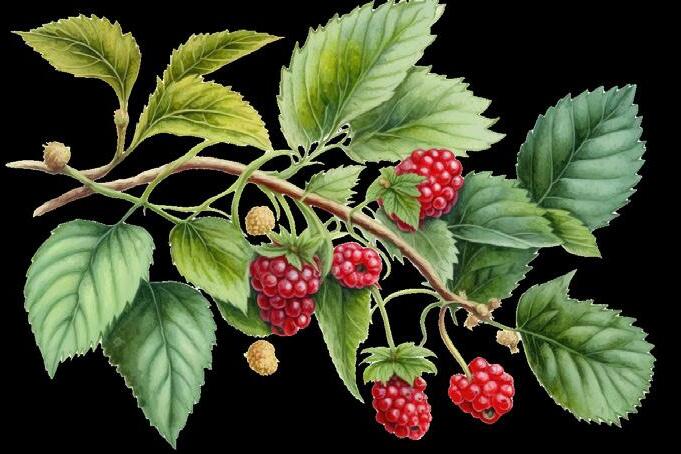

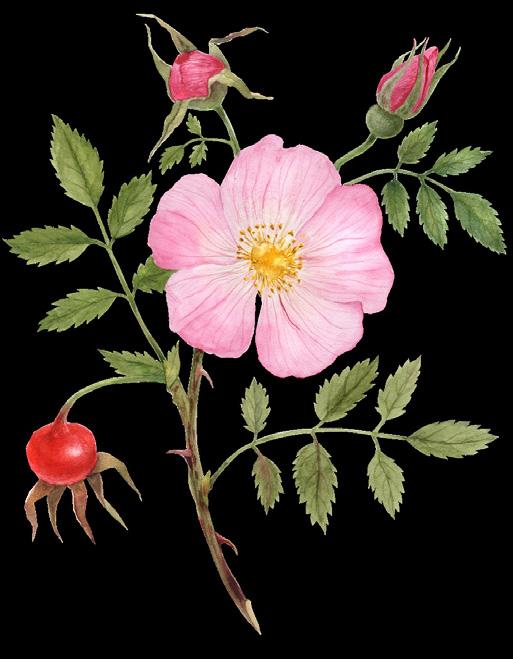
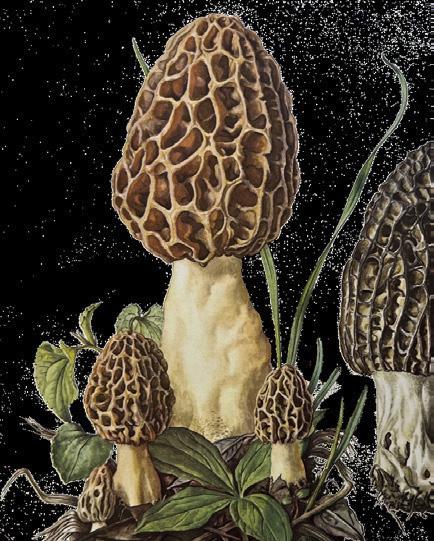

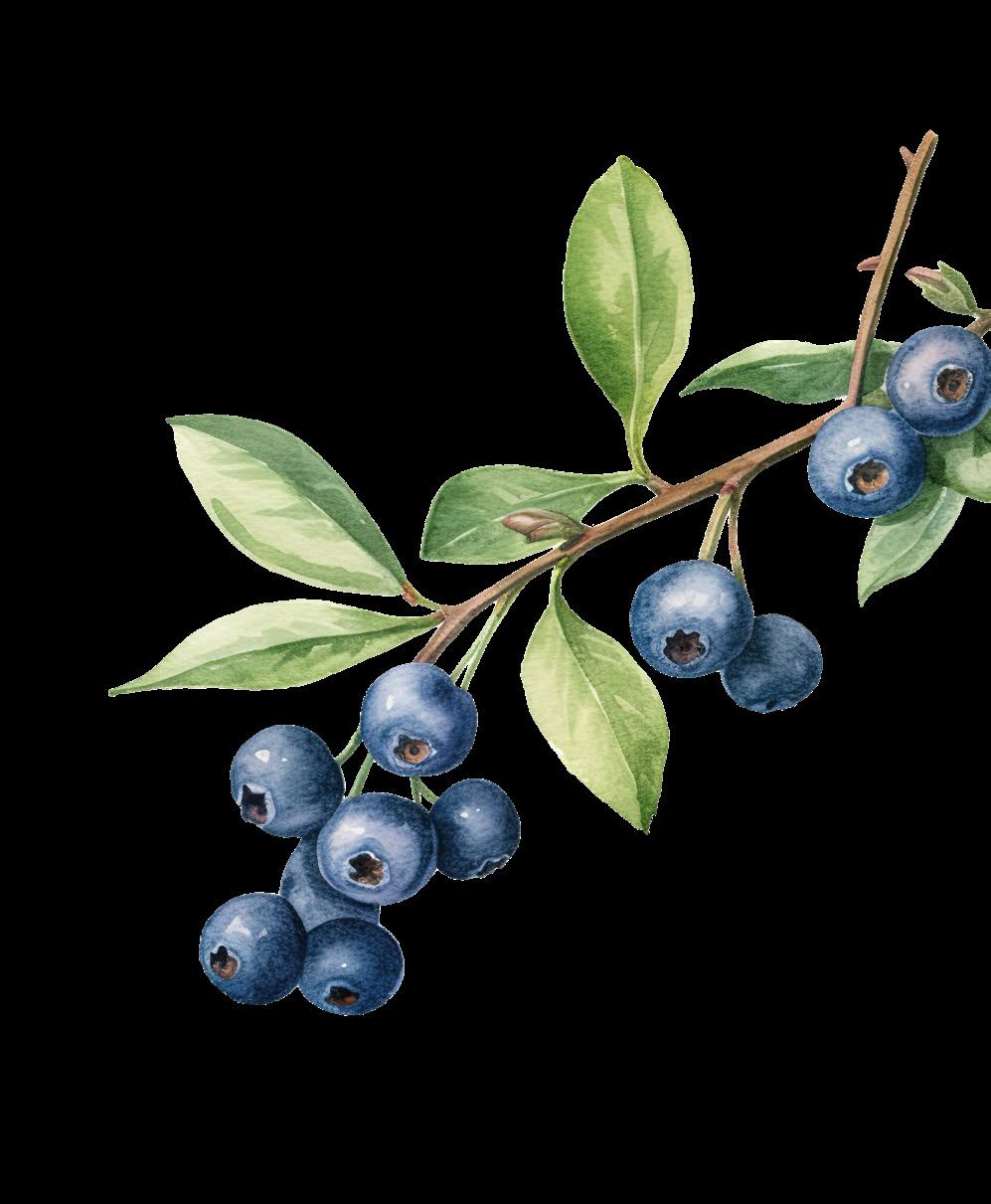

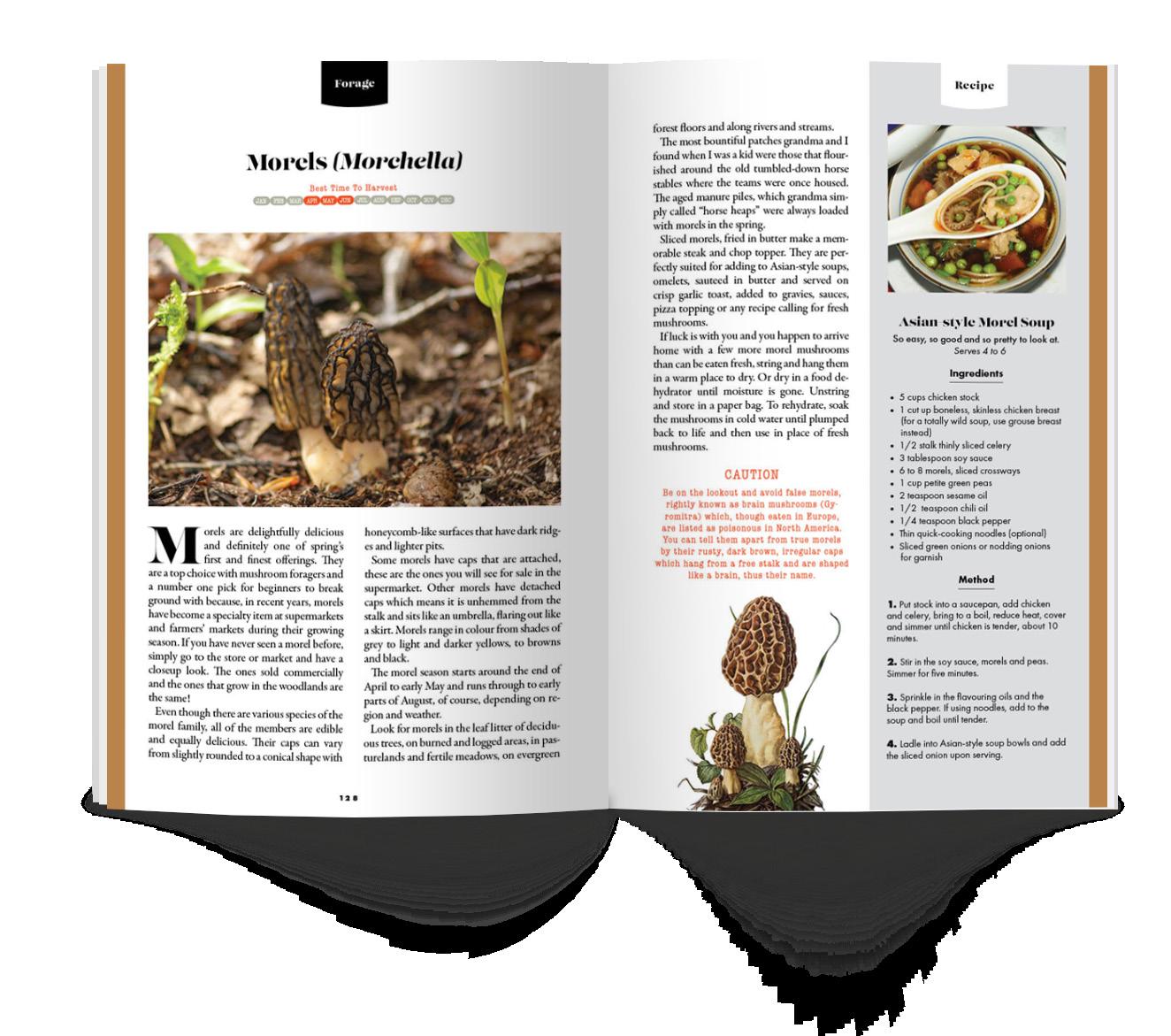



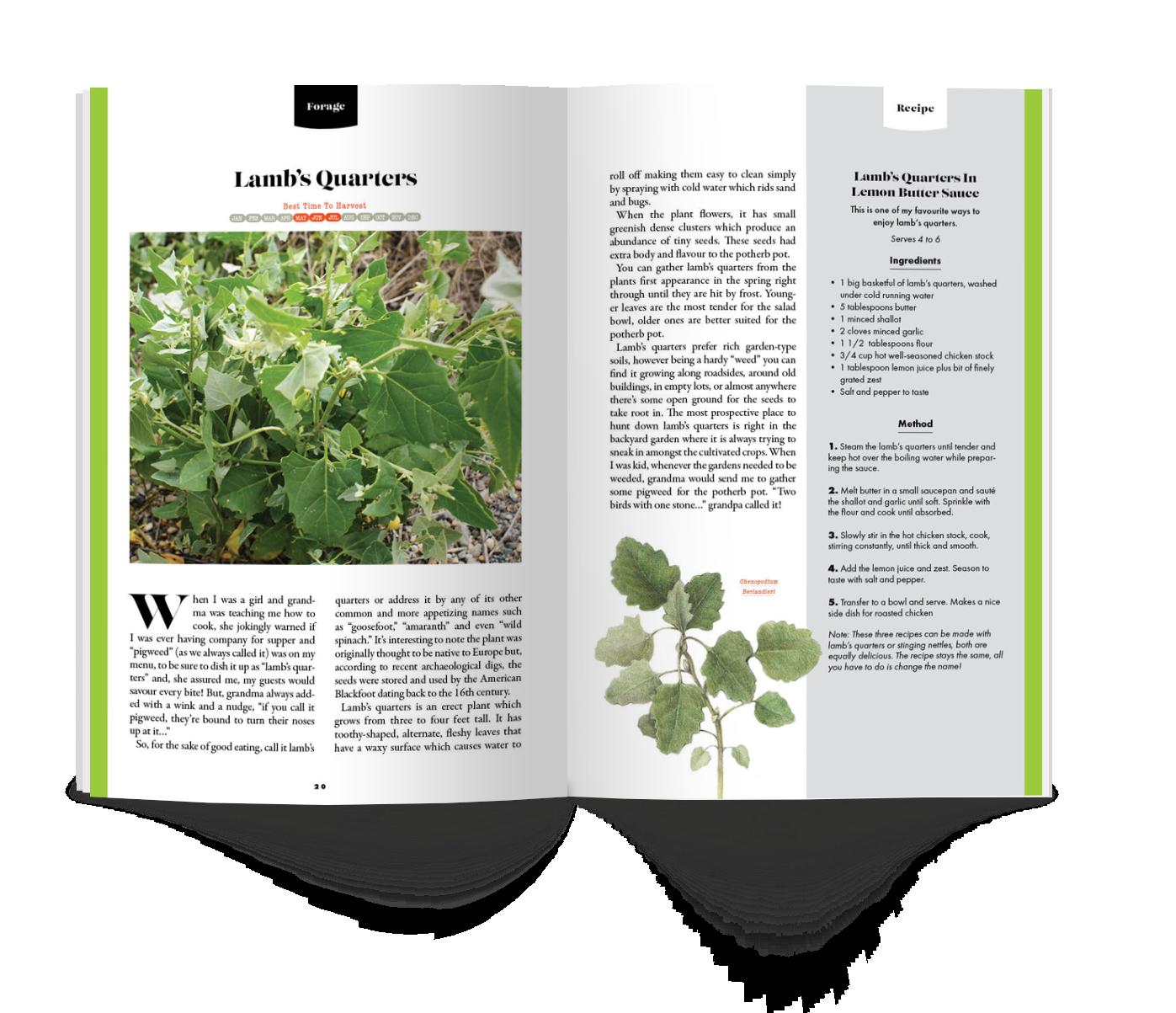
BC A FORAGER’S GUIDE TO EDIBLE PLANTS OF BRITISH COLUMBIA 71 71 71 W ild Harvest BC BY LINDA GABRIS $24.95 ISBN: 978-1-7778764-2-5 www.opmediagroup.ca has been venturing into the outdoors to edibles for over 60 years. The lessons taught grandparents, of responsibility, sustainabiliconnection to the land are as important today as then. This book shares those lessons as well as practical advice in a personal, easy-to-read style. with a scientific field guide, Wild Harvest BC companion book to take with you on your adventures. Over 70 recipes ranging from Wild Asparagus Soup to Hazel’s Hazelnut Brittle turn your foraging finds into delicious, So get out there and enjoy the bounty of Nature.
BC INCLUDES OVER 70 RECIPES
W Harvest
Wild Harvest
$24 95 SHOP NOW NEW RELEASE
your copy from our online bookstore: thebookshack.ca Call1.800.663.7611
Mailbox
MAP MISTAKE
I have been enjoying reading your latest issue of British Columbia Magazine and the article on Nelson was very informative. However, I felt it my duty, in the interest of accuracy, to point out that your map on page 27 has Nelson marked in two places.
I suspect the inhabitants of Golden have already pointed this out to you. Imagine being wiped off the map.
I love your magazine. Keep up the good work.
W. J. Ross, Nanaimo
ARSON LOCATION CORRECTION
While reading the article “Doukhorbors In The Kootenays,” I noticed an error or misprint on page 77. It stated that Mary Braun was charged in 2001 with setting fire to Selkirk College in Castlegar, BC. In fact, she set fire to the Learning Centre of Selkirk College which was located in a portable that is the property of the Crescent Valley Community Hall Society in Crescent Valley, BC.
After Mary Braun set the fire, she knocked on my dad’s door to tell him that she had set the fire. Richard Carl Catton lived at the time next door to the Crescent Valley Community Hall.
Elizabeth Ellis
POWDER HIGHWAY MAP
Always enjoy my time with the magazine and I LOVE the Kooteneys! Thanks for highlighting this part of our beautiful province… especially in the winter.
I believe there is an error in your Powder Highway article, the map of the loop specifically. You have only seven resorts captured and Nelson’s is of course Whitewater with Kicking Horse outside of Golden, which actually isn’t on the this map.
I am sure you will have several folks
who will spot & alert you to the omission/error.
Cheers for a wonderful “snow fun filled holiday season.” Keep the great outdoors just that for us all to explore and enjoy in 2024.
Sue Kennedy
LACK OF RESPECT FROM VISITORS
We appreciate travel media writing about our area very much, particularly now that we are contending with recovering from the Downton Lake wildfire.
That said, the piece on the “Backroads of the Bridge River Valley” on your website has many of the same challenges for our community that many similar blogs/ articles by travel media do.
To give some sense of what we mean:
Description of the historic nature of the town, some of the aspects of that history and then this statement accompanied by a photo of Bradian.
Quote: “Of particular interest for us was the ghost town of Bradian (which lies close to Bralorne and is currently for sale) and the old Pioneer Mine. We spent a couple hours exploring these sites and the surrounding areas.”
Because these travel writers tend to have rose coloured glasses on and want to write an interesting story, they do not think twice about the fact that when
they are exploring the old mine site or the Bradian property, they are actually on private property, it is not a matter of looking for No Trespassing signs, it is about understanding property in our area belongs to someone, it is not all public land.
I do not go to Vancouver and walk all over a property without permission of the owner that may have buildings in disrepair because I know they are private property.
The challenge we have with this sort of thing is that, for example, private property owners of houses in Bralorne actually find people in their yards, wandering around houses and taking pictures! There just seems to be some kind of illinformed attitude because they appear to be in wilderness they can do stuff they would never think of doing in a city or town. We have a similar issue on Gun Lake, where people in boats putt around at slow speed and gawk at our property and us. This year that activity is going to be painful for the 56 properties that lost their structures in the Downton Lake Wildfire, who have had their burnt trees removed and now own a moonscape exposed to dust, their neighbours, noise and disrespectful lookie loos.
What this sort of behavior leads to is a real “anti tourism” feeling with residents
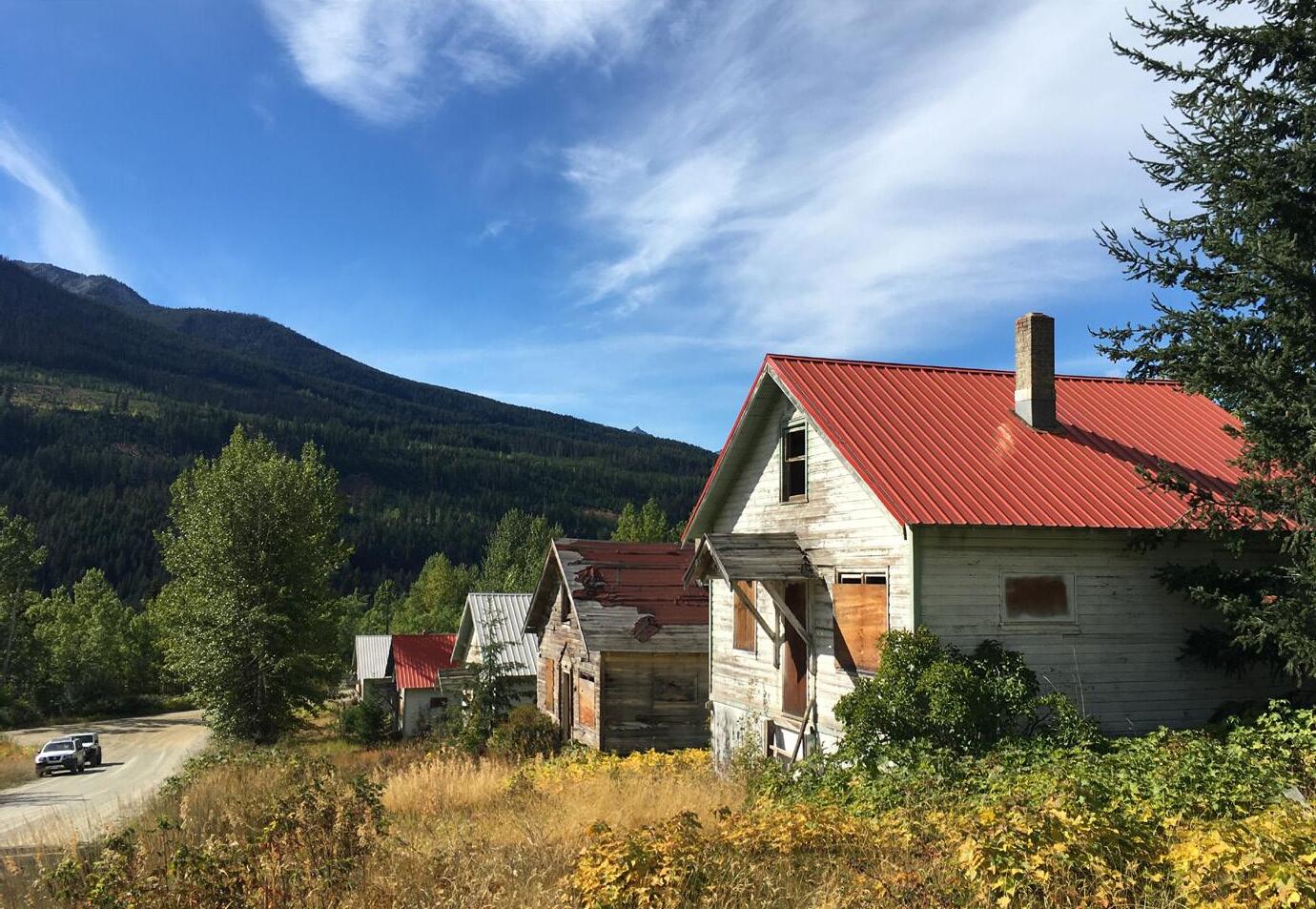
6 • BC MAG 6 MAILBOX SPRING
The abandoned townsite of Bradian is now for sale.
and that also hurts our community by creating division and impacting other sectors so important to our area economically such as mountain biking and tourism.
We simply must get through to the travel media sector they need to actually demonstrate themselves appropriate respectful behavior in areas that are very different for example than large and small markets and also translate that into their writing.
From our side of it, we continue to communicate with visitors and I thought when I read this, I think we need to res urrect our Respect for the BRV program from the Covid period, and use various ways and means to get through to visitors how to properly visit our community.
We love this attention by writer/maga zines but we just need to get through
that that travel articles without the proper demonstration of respectful behaviors cause much distress and impact in terms of the individual community members attitudes to tourism and to be fair, the impact on community members themselves of the disrespectful behavior.
Debbie Demare
Thanks for the note Debbie, we absolutely agree on the need to respect private property when exploring BC. The article you mentioned has a note saying that if you choose to explore abandoned sites, to respect all
body of water, though there is a difference between peacefully enjoying it and gawking at people on the shore. Unfortunately there are always going to be some who lack common sense. —Eds

Send
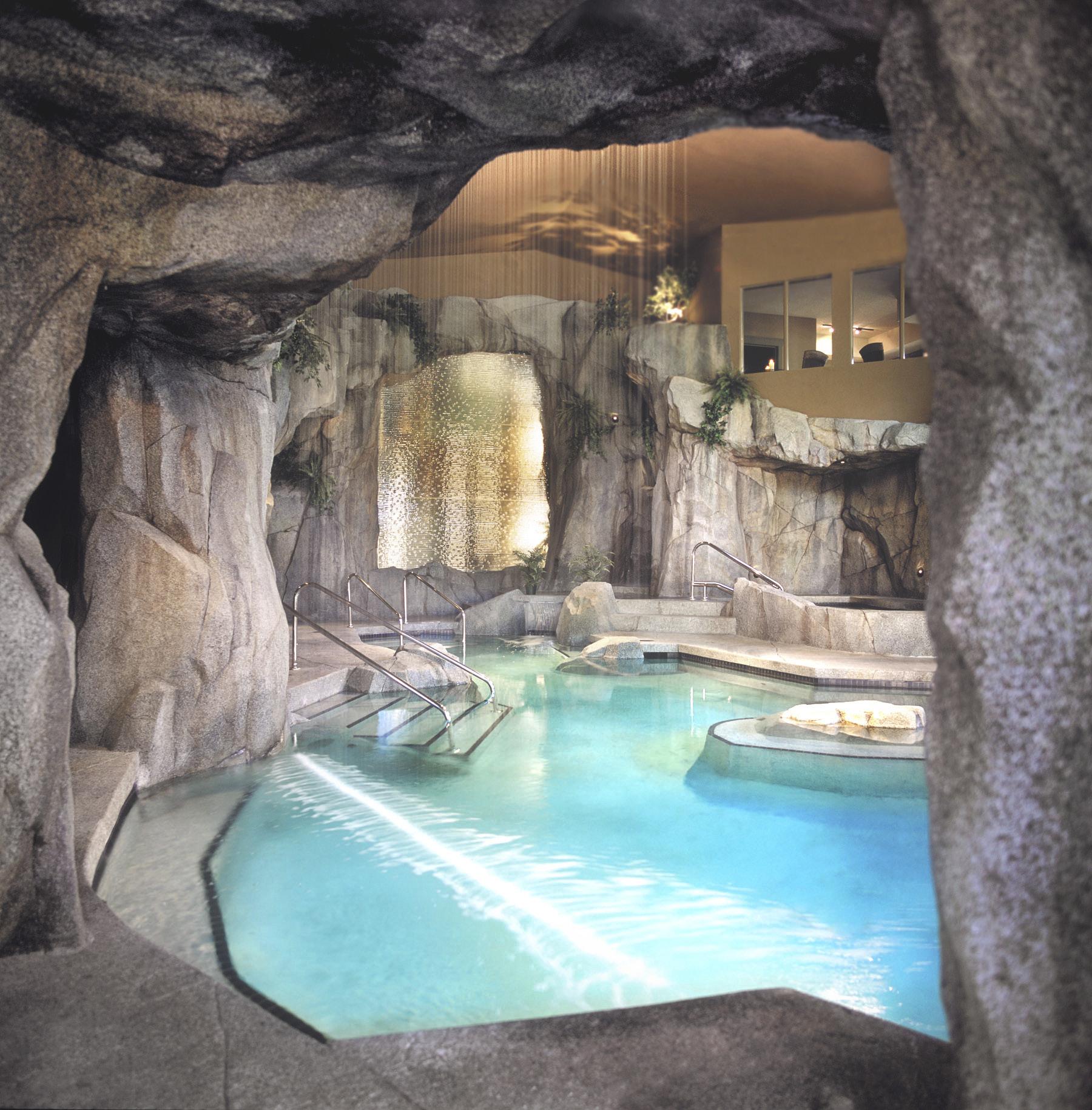
BC MAG • 7
British Columbia Magazine
EMAIL US
email to mailbox@bcmag.ca or write to
, 1166
250-248-1838 | Grottospa.com | Embark on a 2-hour journey through the new cedar barrel sauna patio, the warm inviting mineral pool, invigorating waterfalls, and soothing whirlpool. Enhance your visit with spa treatment(s) and our one-of-a-kind tapas dining. Reach out today to book your Grotto experience.
Due West
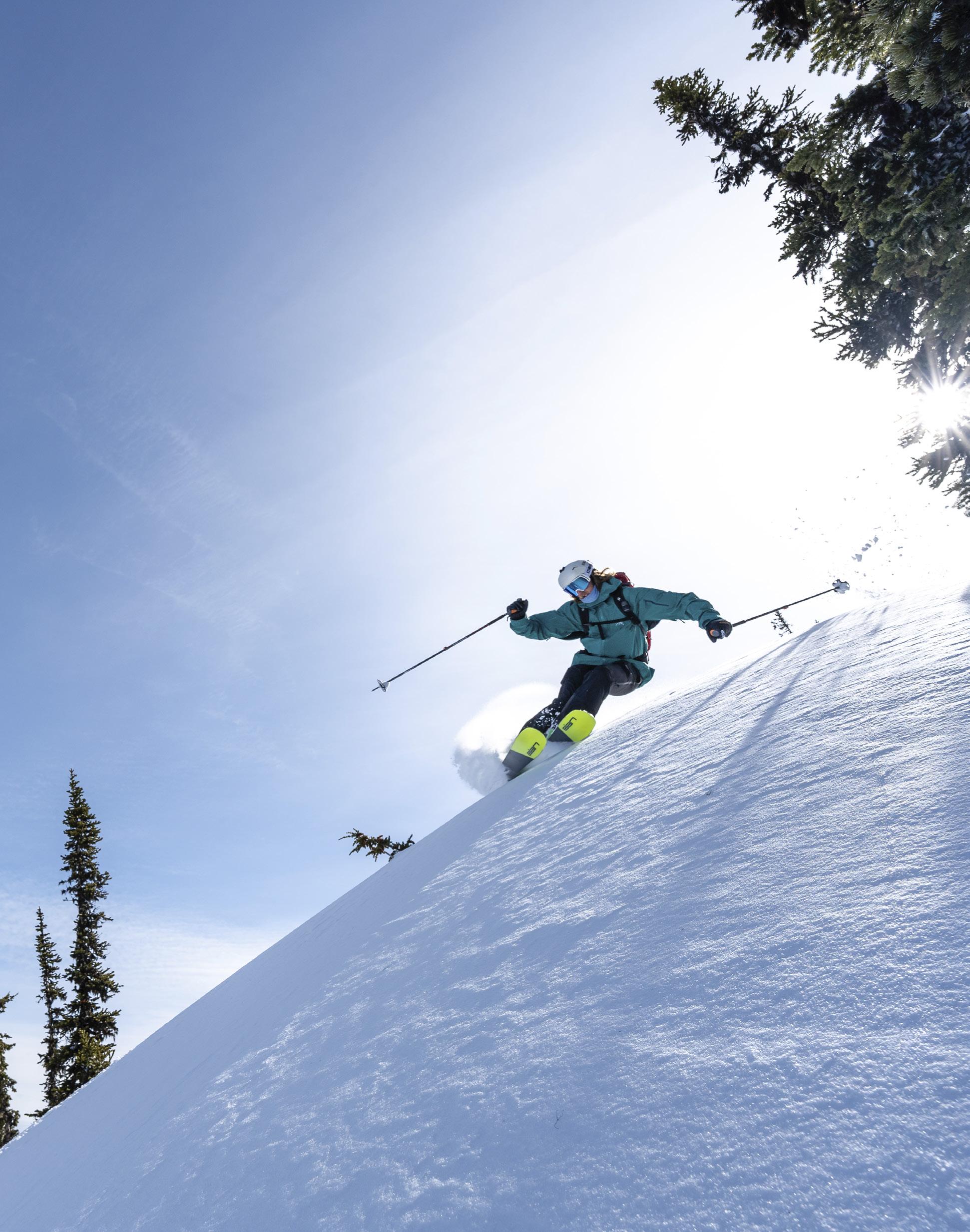 SPORTS
SPORTS
Spring Skiing
BY LESLIE ANTHONY
ALTHOUGH MANY skiers and snowboarders see winter powder days as a ne plus ultra, most rank spring conditions second—some even elevating it to top choice. That’s because something magical happens to the snowpack this time of year—the phenomenon of “corn snow.” This glorious, ego-boosting surface of sifting beads is formed by snow
crystals that melt during warm, sunny days then re-freeze during cold, clear nights. When this vernal weather loop sets in many are hooked for life. But just so you don’t completely lose the powder plot, March in Interior BC still sees plenty of storms and late-season pow days.
I’ve been a spring-ski aficionado since my teen years
in Ontario, where the moment local lifts shuttered we headed for the larger closed ski areas of Quebec and New England to climb and ski moguls—which were generally abundant, large and delightfully soft. One of my main reasons for moving to Whistler was being able to ski somewhere that reliably stayed open until late May, shut down for a couple weeks,
8 • BC MAG
DUE WEST
Tourism Thompson Okanagan
then re-opened for summer glacier skiing (back when the glacier was still there…).
I’ve also spent a lot of time spring skiing abroad. While most in North America are done with sliding by April, the circumpolar season is just beginning, and international airports bustle with folks dragging ski bags northward for ski touring, boat-based skimountaineering and heli-skiing in Baffin Island, Greenland, Iceland, Sweden and Norway, lured by something captured in the delightful Swedish term vårvinter (or “spring-winter,” pronounced vōar-vinter). Emblematic of the far north, this long, slow dissolve from one season to another is also loosely seen in the alpine areas of most BC mountain ranges—a definitive transition time that sees no prolonged typical winter weather, yet no prolonged spring weather either, making for a happy set of alternating conditions. Sweden’s national weather service even celebrates vårvinter as a de facto fifth season. You can experience your own version by getting into the high-alpine or backcountry with friends or even by heli-skiing at one of BC’s two-dozen operations, where prices often come down for spring sessions.
But back to BC’s resorts
Did we mention impeccable grooming? Spring skiing is possible—indeed made more fun—by resorts’ teams of expert snowmakers and cuttingedge technology. Speaking of which, should you be so disposed spring is also prime time in the terrain park. With dialed features and forgiving landings, laps in the park are de rigeur
Because soft snow tends to harden-up overnight and require morning sun or warmer temps to soften, you should always consider when and where sun hits different aspects of the mountains and follow it like a puppy. Depending on the location, elevation and size of the resort, spring skiing in BC
lasts into mid-April and even late-May at Whistler Blackcomb (this year, in a reversal of the usual, Whistler Mountain will stay open until season end as work commences on a new chairlift on Blackcomb). Of course, good skiing extends into June on the summits and backcountry glaciers around Whistler, though climate change has made that window much smaller.
People often forget about the deeply discounted accommodation at ski resorts in spring popping up through the snow like crocuses, but they shouldn’t, for these are the ways and means to enjoy a surprising range of activities. After all, the snow still stands at winter depths so dog-sledding, snowshoeing and cross-country skiing have yet to be shoved away in a closet with Arctic-rated down puffies. For cross-country skiers and snowshoers spring is the perfect time to take advantage of trails, track-set or otherwise. Late-season also offers the opportunity for snow-free springtime valley activities like mountain biking or golf.
When it comes to après, the Austrian Alps might have a stranglehold on the global prize for oompah madness, but BC resorts have an abundance of patio real estate given over to the pursuit of more civilized gemütlichkeit. More importantly are the growing raft of springtime events in ski country (see sidebar: Spring Flings), a mix of music, art, family fun and long-running local favourites like slush-cups and pond-skims featuring costumes, t-shirts and even bathing suits to help chase away winter’s blue-toe blues.
With the closing bell at many resorts extending to 4:00 p.m. in spring, you can make the most of that warm, afternoon alpenglow no matter how you’ve spent the day, kicking back with a cold one and surveying the mountain realm you’ve just enjoyed. The kind of sunset activity that makes for alpine memories.
SPRING FLINGS
Whistler — The benchmark World Ski & Snowboard Festival (April 8 to 14) includes onsnow competition like the Saudan Couloir Race Extreme, the steepest ski and snowboard race in the world, and a costumed Slush Cup. Music, art, nightlife and some of the best skiing and après in the province combine with signature photo/film events like Intersection, 72-hour Filmmaker’s Showdown, and Sea to Sky Photo Challenge to make the WSSF a must-do.
Sun Peaks — The new Sip, Savour & Ski Sun Peaks Culinary Festival (March 28 to 31), features a full slate of events with dishes crafted with locally sourced ingredients paired with artisanal brews, cocktails and wines. It joins the Hub International Nancy Greene Festival (March 23, 24), “What the Huck” Knuckle Huck and Rail Jam (March 22), Easter Eggsgtravaganza (March 31), and season-closing Wonder Weekend (April 6, 7).
Revelstoke — Watch great deeds of alpine derring-do during the King & Queen of the Mountain competition (March 31) then say sayonara to winter at the Revy Beer Festival (April 5, 6).
Kicking Horse — The Whitetooth Grill Live Concert Series runs throughout March and April, and other events include the Marc Andre Memorial Banked Slalom (March 30, 31), the mountain’s first snowboardonly event, and 2024 Sunsplash Funkfest Dummy Downhill & Slush Cup (April 13, 14).
Silver Star — Seismic Fest (March 29 to April 7)
is a 10-day celebration of mountain culture with live music, art, craft, culinary and family-friendly activities, plus skiing and boarding events.
Big White — AltiTunes Music Festival (April 5, 6) is Canada’s biggest après ski music festival, a weekend that features live music, skiing, snowboarding and an array of outdoor activity.
RED Mountain — Kickoff spring at the Canadian National Alpine Championships (March 15 to 21) then roll right into the third annual Wiener Takes All dog race (April 1), Slush Cup (April 6) and Retro Day Deck Party (April 7), fuelled by live bands, cold beer and local mountain legends.
Fernie — The annual Fernival (April 13, 14), commemorates the resort’s final weekend of skiing and riding with blow-out live rock concerts, wacky contests, and silly costumes.
Whitewater — Check out the Blast Beerfest (March 23, 24), Passholder Appreciation Day (April 6) and Beach Party Sunday (April 7).
Panorama — Swing into spring with Panorama’s first-time Pride & Ski Fesitval (March 22 to 24) and events like the 2024 NORAM Cup (April 1 to 11). Then send off the season with a splash at the Red Bull Slopesoakers rail jam and pond skim (April 13) and Superhero Pond Skim (April 14).
Mt. Washington
— Schuss or cross-country in the morning and golf in the afternoon. Otherwise, end the season with a Dummy Downhill (April 6) and Slush Cup (April 7).
BC MAG • 9
DUE WEST
CULTURE
Victoria’s Castles
BY JANE MUNDY
THINK ABOUT CASTLES
and maybe fairy tales come to mind. Or perhaps you dream of exploring an ancient Scottish fortress or an opulent Bavarian palace. But you don’t have to travel far to visit castles: Victoria is home to three grand buildings, rich with history and architecture, thanks to a19th century mania for castle-building that captured Canada’s affluent elite. They are all open to the public and are a fascinating glimpse into Canadian history, particularly with a guided tour.
Craigdarroch Castle
Built as a comfy, albeit extravagant home for the Dunsmuir family, Craigdarroch towers over Rockland, a residential neighbourhood in Victoria. Just a 30-minute walk (some of it uphill) from Victoria’s Inner Harbour will transport you back in time to the late 1800s, when coal baron Robert Dunsmuir built this massive estate.
Most of the estate was sold in 1908 but some furnishings and knick-knacks (many bought back via auction records) and windows are original, as is the exterior. Before starting the guided tour, we were instructed to scrape our shoes on the carpet next to the antique shoe cleaner and warned not to touch anything, including original oak walls and staircase.
There’s a button under the


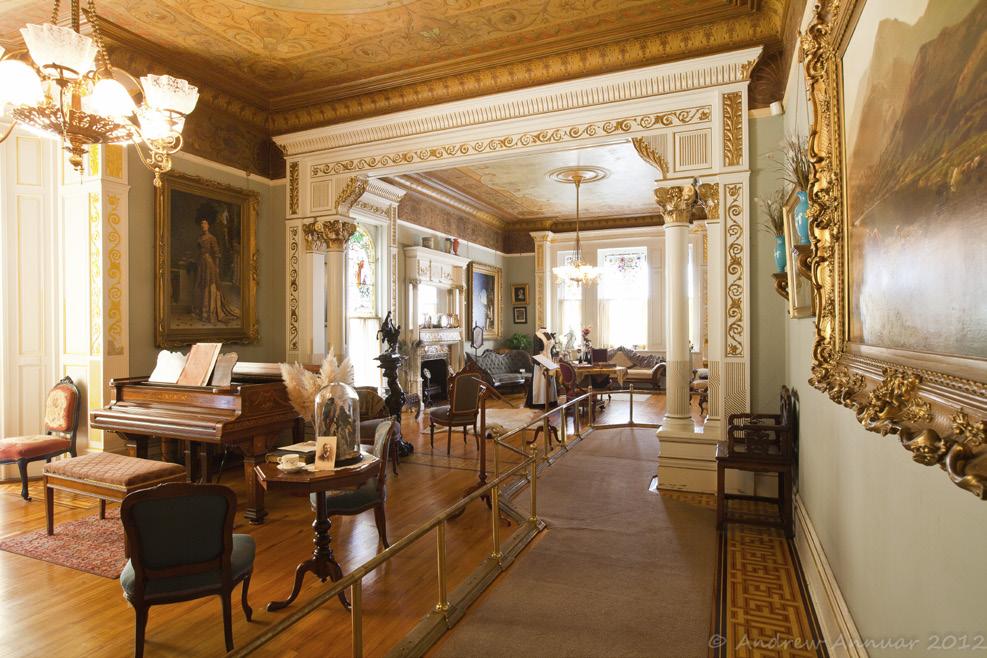
dining room carpet to press with your foot to call servants, or yell orders from one of 12 speaking tubes throughout the house—a step up from Downton Abbey’s bells. Other labour-saving devices include a laundry chute and dumbwaiter (note to self, is that PC?) More obvious signs of wealth are mounted elk, goat and deer heads throughout the castle, and PETA would not approve of the taxidermy squirrel perched above a bed. Creepy. And the massive English billiards table on the fourth floor must have cost a pretty penny. Here too is the dance hall: perhaps because guests had to walk through the house to get way up here, Joan Dunsmuir had an opportunity to show off all their stuff.
During the Victorian era it was believed that home interiors could “exert moral influences on the inhabitants,” and Joan was likely a believer: the library speaks volumes, and the fireplace in the entry hall has a quote carved into it: “Reading maketh a full man.”
10 • BC MAG
Location Craigdarroch Castle, 1050 Joan Crescent (named after Joan Dunsmuir). thecastle.ca
Courtesy Craigdarroch Castle X3; Right: Tourism Vancouver Island
Well, maybe not the smoking room, featuring Sir Walter Raleigh in stained glass. Each room is staged with Victorian accessories and a few mannequins—it’s like Scottish Baronial style meets Gothic Revival architecture—think Harry Potter.
The castle was later converted into a military hospital, college and music conservatory before being restored to what it is today—a National Historic Site of Canada. What isn’t on display is how the Dunsmuir fortune was built on deadly mine conditions and racist fearmongering. It was the miners who called Robert the “robber baron.”
Hatley Castle
James Dunsmuir tended the fortune amassed by his father. He was BC’s premier (19001902) and lieutenant governor (1906-1909) and spared no expense building the lavish Hatley Castle. A combina-
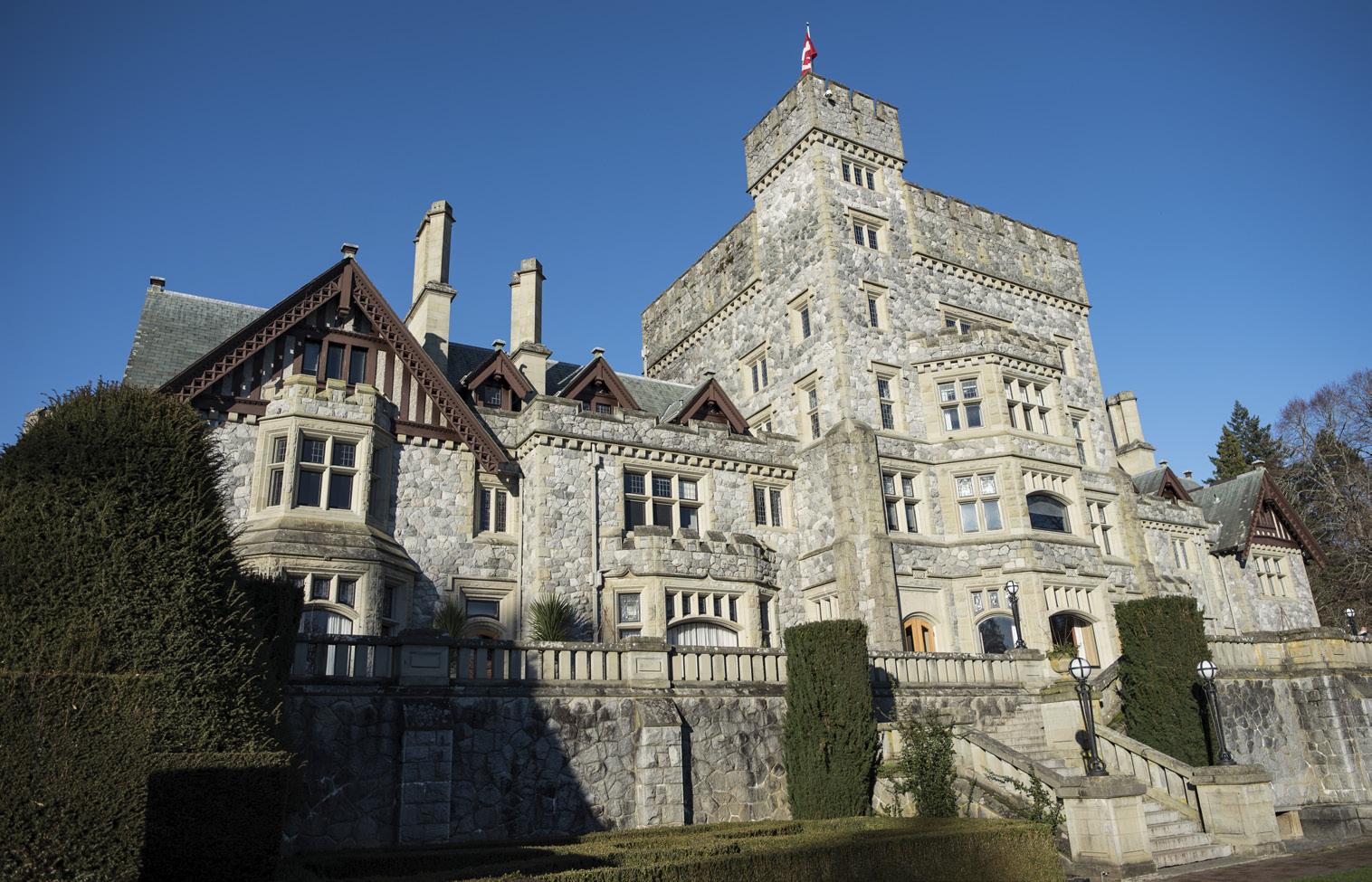
tion of Norman and Renaissance styles, this 15th-century Edwardian manor designed by Victorian architect Samuel Maclure comprises 40 rooms with views of Esquimalt’s seaside lagoon, old growth forests and palatial gardens—565 acres in total.
In 1995 the entire mansion was designated a National
Historic Site of Canada. These days, Hatley Park (named in the tradition of the private estates of Britain and Europe) is associated with Royal Roads University, so it doesn’t get as many visitors as Craigdarroch, but you may have seen it on the silver screen. Hatley Castle made its film debut over 80 years ago and was featured in
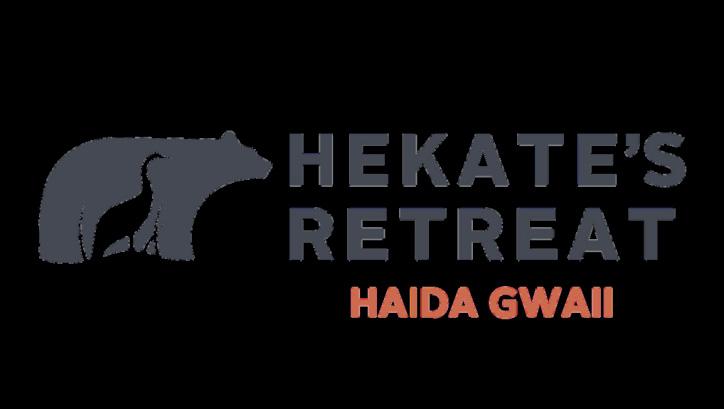
“The X-Men” movie series, as Professor Xavier’s School for Gifted Youngsters.
Hatley Castle offers guided tours of just a few rooms on the first floor, but ghosts have a free pass everywhere: A strong smell of cigar smoke can be sensed while inside, according to Erin Limacher, Royal Roads University spokesperson. According to reviews on

Finding yourself at the edge of the world is surprisingly easy, leaving here is much harder.


BC MAG • 11 Accommodations Restaurant + Café Golf Course Local Adventures
hekatesretreat.ca
Location
Hatley Castle, 2005 Sooke Road. hatleycastle.com
DUE WEST
Location
The Empress Hotel, 721 Government Street. fairmont.com/ empress-victoria
Tripadvisor, the tour isn’t worth the price of admission, but you can view the exterior’s ornate stone masonry work, extensive use of battlements and elaborate gardens from 10:00 a.m. to dusk. And like Craigdarroch’s dining room, a tiny little metal lever on the dining room floor was used by Laura Dunsmuir to summon kitchen help. There is also a secret passage in the castle, which husband James purportedly used to escape his guests.
Time it right and you could stroll parts of the grounds surrounding Hatley Castle without a soul in sight, even though these fine Edwardian gardens have been around for almost a century. While most visitors come to see the castle and maybe stroll the Italian and Rose Gardens, venture further to the Japanese Garden, the woodland garden and down a path flanked by 26 elms to the lower lake and the bog garden. The gardens remain largely intact since designed in 1913. “I don’t care what it costs, just build it,” said James, referring to his gardens and Hatley Castle.


Location Government House, 1401 Rockland Avenue. ltgov.bc.ca
The Empress Hotel
Designed by architect Francis Rattenbury and built by a division of the Canadian Pacific Railway, the Empress Hotel opened her doors in 1908 as a “luxury castle on the coast.” Now, the chateau-style Fairmont Empress—in recognition of her architectural and historical importance—is a designated National Historic Site. Named after Queen Victoria, as the ‘Empress of India,” her Edwardian-era exterior boasts intricate stonework, decorative moldings and beautiful

12 • BC MAG
Empress in 1910.
Top: Courtesy Empress Hotel; Above Courtesy Government House X2; Right: Royal BC Archives
stained-glass windows.
Inside, start at the reception lobby. In 2017, the hotel underwent a $60-million-dollar renovation including a chandelier comprising 250,000 crystal beads finely woven together to refract light in rainbow colours. It makes for a grand entrance. Ask the concierge for directions to the “Heritage Hall,” which is
reminiscent of a train caboose. Its walls are lined with vintage photographs capturing the hotel’s early days and a timeline of construction. Back upstairs, check out the magnificent stained-glass ceiling dome in the Palm Court and next door, the ladies at the little Fairmont store will gladly share stories about famous events held
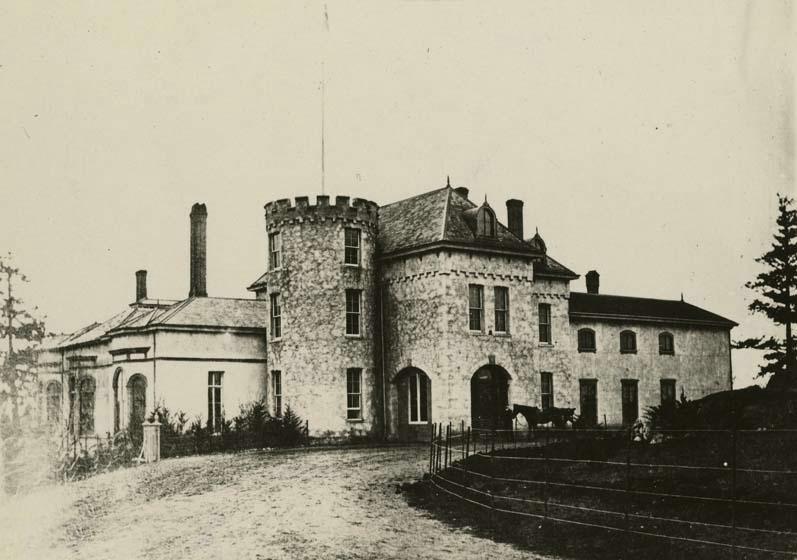
there. Not to be missed are the huge pop art-style portraits of Queen Victoria in the Q Bar. Its makeover in 2017 perfectly balances Edwardian architecture with modern design and best viewed with a Martini Royale made with Empress 1908 gin.
Government House
The official residence of the Lieutenant Governor and the ceremonial home of all British Columbians, the third Government House opened in 1959—the two previous buildings were destroyed by fire. Cary Castle, the first official residence, was built in 1859 but only stood for 40 years. Architects Francis Rattenbury and Samuel Maclure were hired to design a new house on the same site and it opened in 1903. The only remaining structure after it too succumbed to fire is the stone porte-co-
chere at the front entrance. The latest home has an interesting architectural style, fondly described as “Mad Men meets Downton Abbey” with Victorian décor and 1950s style bathrooms complete with ballerina wallpaper (most popular for selfies) in the basement.
The building is huge: 55,000 square feet spread over four stories and an attic. Sign up for a free tour beforehand as guides ask that you please don’t just show up. There’s a lot to see, including the dining room, ballroom, drawing room and a French drawing room, hallway and foyer. You’ll learn a smattering about history and architecture, art and artists, including a collection of First Nations art and other BC artists,such as Bill Reid. The grounds and gardens are open from dawn to dusk, 365 days a year. Be sure to visit the rose garden and when combined with Rudi’s tea room, you’ll be transported back in time to Victorian England.

BC MAG • 13
Cary Castle was destroyed by fire in 1899.

Knocking Haida Gwaii off the Bucket List
DAWN POSTNIKOFF
Haida Gwaii has always seemed slightly out of reach as a travel destination. In my mind it was difficult to get to, complicated to get around and a destination reserved primarily for fishing or high-end boating expeditions. In fact, my daughter worked for several years on a ship which sailed through Gwaii Haanas National Park Reserve, helping visitors to explore the beauty, culture and abundant wildlife of the region.
And yet, little did I know!
When the opportunity finally came for my husband and I to visit Hekate’s Retreat on Haida Gwaii, we weren’t quite sure what to expect.
For starters, it’s actually quite easy to get to. Air Canada has daily flights directly from Vancouver into K’il Kun (Sandspit) on Moresby Island, which is only a few minutes from Hekate’s Retreat. Pacific Coastal
also flies to Haida Gwaii, landing at the Masset airport on the north tip of Graham Island.
We arrived in Sandspit on a sunny Friday afternoon and rented a car right at the airport. My expectations so far had been easily exceeded. After a short drive through town and a pit-stop to grab some snacks and a bottle of wine for later, we found our way to Hekate’s Retreat. Originally a sheep and cattle farm owned by the Mathers family in the late 1800’s, the homestead was converted to the Willows Golf Course in 1972.
And what a beautiful course it is—nine holes with 18 tee boxes, located on the edge of the Pacific Ocean with incred-
ible views and challenging fairways. The course has been refurbished over the past few years, and is getting attention from across the province as a new destination golf experience. The newly renovated clubhouse restaurant offers casual bistro-style fare and
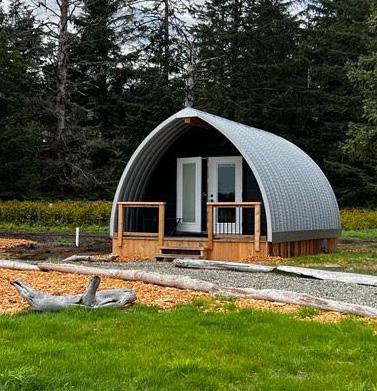

local Haida Gwaii specialties, with fresh seafood a regular feature on the menu. In fact, as we found out the following day, if you happen to bring some fresh salmon back after a day on the water, the chef will happily cook your catch for you.
We were able to tour the original Homestead House and would love to return with our families to stay there. It has been completely refurbished and is available as a vacation rental for small groups.
Our home-away-from-home was a modern cabin, located alongside the first fairway with a stunning view of the Pacific Ocean. The cabin was so cozy, and perfectly equipped for the two of us.
The thing we loved most about Hekate’s Retreat was the central location. Located at the north end of Moresby Island, it served as the perfect basecamp for all our adventures. We drove down to Gray Bay one day for a picnic, joined a fishing charter from the Sandspit marina, and jumped on the BC ferry to explore the rest of Haida Gwaii. So much to explore and so little time. We had three full days, and it wasn’t nearly enough.
If you’re interested in visiting Haida Gwaii, you can learn more about Hekate’s Retreat at hekatesretreat.ca.
14 • BC MAG
DUE WEST TRAVEL
The links / hybrid-style Willows Golf Course features 6,220 yards on nine holes and 18 tee-boxes.
X
Courtesy Hekate’s Retreat

CHARTERS
Seaplane Charters to Anywhere on the British Columbia Coast
SCENIC TOURS
Unique Experiences in Amazing Places
SCHEDULED
Up to 32 Flights Daily to Nanaimo and the Gulf Islands from Vancouver

Seair Seaplanes provides you with professional and personalized service specializing in flying charters and scheduled flights throughout Coastal British Columbia.
Seair Seaplanes are leaders in providing fast, safe, and convenient transportation from the busiest urban centres to your favourite great escape. Celebrating over 30 years of operating Canada’s fastest, quietest and most modern seaplane fleet.
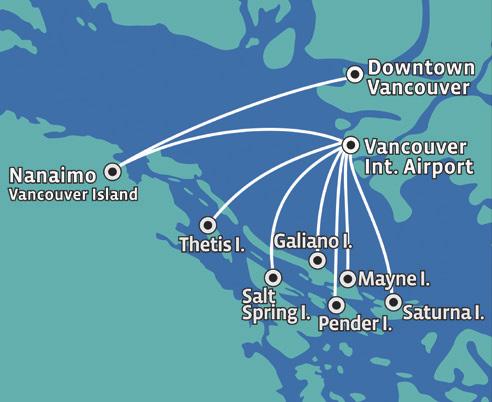
BC MAG 15
| 604-273-8900 | seairseaplanes.com
1-800-447-3247
DESTINATION GREENWOOD
Canada’s biggest small city has lots of history and charm
BY JANE MUNDY
GGreenwood may be Canada’s smallest city, but its roots are huge. Nestled in Boundary Country in south central BC, Greenwood can trace its history back to the 1800s, when it hosted prospectors and miners. Its population soared again when 1,200 Japanese were interned here, and it skyrocketed in 1999 when a film crew arrived to shoot “Snow Falling on Cedars.”
Greenwood holds the title of Canada’s smallest city because it was incorporated in 1897 and its population peaked two years later with over 3,000 habitants, most of whom came here for copper mining and smelting.
The little city decided not to morph into a town or village, even though only 700 people reside here year-round these days, along with a few ghosts.
There’s nothing about Greenwood that Doreen MacLean doesn’t love, so it’s fitting

16 • BC MAG DESTINATION SPRING
X
 Copper Eagle Bakery & Cappuccino—a favourite stop on Copper Street.
Adobe Stock/edb3_16
Copper Eagle Bakery & Cappuccino—a favourite stop on Copper Street.
Adobe Stock/edb3_16
that she works at the museum. I was told that she has been instrumental in development of both the museum and the community, but she won’t admit to it. “My grandfather bought the Windsor Hotel during Greenwood’s diminished mining boom and my family ran it until the 1950s,” she says. “Prospectors had no place to go so they lived in the hotel and ate at the hotel’s café—a captive audience.”
MacLean was born in Vancouver and worked in the big city until she was 26 years old. “I’m not a big city girl, so I moved back to Greenwood to be with my family and worked at the sawmill in Midway, just down the road.” Now, she’s a small city girl.
When you visit, don’t be put off by its suburb’s name: Anaconda. The local newspaper Midway Advance wrote in December 1896: “Greenwood City and Anaconda are booming. New buildings are being built daily. Newcomers are arriving every week, and
several families are camping near the town in tents...” Back in its heyday, Anaconda boasted four hotels, two general stores, a post office, bakery, shoemaker, sawmill, lawyer and its own newspaper, the Anaconda News. Anaconda’s name has nothing to do with snakes. Rather, it was named after the huge Anaconda copper mine and smelter in Montana. According to another newspaper, the Nelson Star, Anaconda’s streets were named after English authors and the avenues were named after smelters, such as Butte, Everett and Denver. The street names didn’t survive. “Lots of Americans came here prospecting for copper and to a lesser extent gold and silver, and
Right: The Greenwood Courthouse served as the Supreme Court of Yale from 1902 to 1953. Below: The Greenwood Museum and Visitor Centre, where a warm welcome awaits all visitors.


18 • BC MAG
DESTINATION


a smelter was here too,” says MacLean, “all the trade came through Spokane because the road to Vancouver didn’t exist; the stage lines went north-south until the Columbia and Western Railway came here and trade travelled east to west.” The railroad was crucial to move the ore and to this day “junior” mining companies are still exploring the area, but it costs a lot of money— and a large deposit—to put a mine into production. The city boomed with a smelter but after the First World War, the price of copper dropped and it shut down.
JAPANESE INTERNMENT
Chuck Tasaka is another resident. His parents were interned here after Pearl Harbor was bombed and they lived in an old abandoned hotel—not the Windsor—along with 200 Japanese internees. There was one stove and one toilet per floor and they had a 10x10foot room to accommodate his mother and three young daughters. Greenwood Mayor W.E. McArthur requested that 300 Japanese move to Greenwood to help revive the local economy. He wasn’t expecting 1,200, but they saved Greenwood from becoming a ghost town (more about ghosts later.)
BC MAG • 19
Greenwood was chosen as the location for the 1999 movie Snow Falling on Cedars
Ciel Sander X2
“Dad was sent to forced labour camps but because he was a barber, classified an essential service, he returned to Greenwood and lived in a house with two other families,” says Tasaka. In January 1942, all male Japanese Canadians between the ages of 18 and 45 were taken to road camps in the interior.
“My brother Seiji was born in December 1942. It was one of the coldest winters in that area, reaching -39ºF in February 1943. My mother told me that a kind gentleman friend scoured all over town to find scraps of coal and wood to keep the place warm so that a six-week-old baby would not freeze to death.”
“By 1944, dad rented a house in Midway—nine miles west of Greenwood—shared with just one family, and I was born the following year,” Tasaka adds. “Dad took the bus or train to Greenwood to cut hair and after the war he set up a barber shop here. Even though the feds disallowed Japanese Canadians to own a business, Mayor McArthur allowed it and after the war the mayor and the Greenwood community encouraged their Japanese friends and neighbours to stay. The town thrived, with over 50 percent owned and operated by Japanese Canadians.” Today, many of them or their descendants call Greenwood home.
Tasaka has fond memories of his childhood. “Greenwood was one big outdoor playground. At Sacred Heart school, the Franciscan Sisters of the Atonement never had a clock, so kids had to go outside and check at the post office clock to call lunch and recess time,” he remembers. “Because there were 364 students in four-rooms, children had to attend school in shifts. We made skis out of kindling and candlewax and played hockey on Government Street in the winter, marbles in the spring. And we loved fishing along Boundary Creek…”
The BC Copper Company smelter stack, standing 36 metres tall, was the highest chimney in the province when built in 1904. Made from 250,000 bricks.
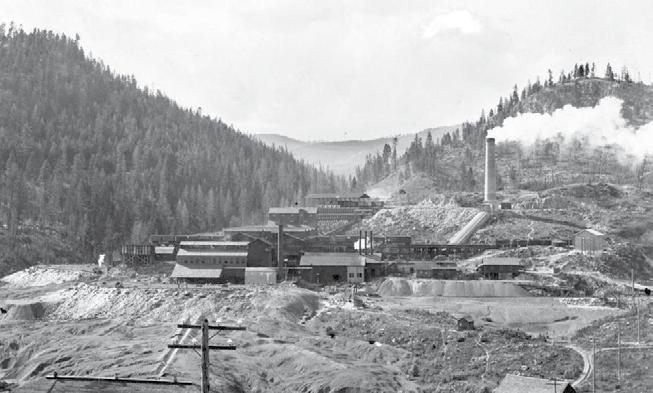
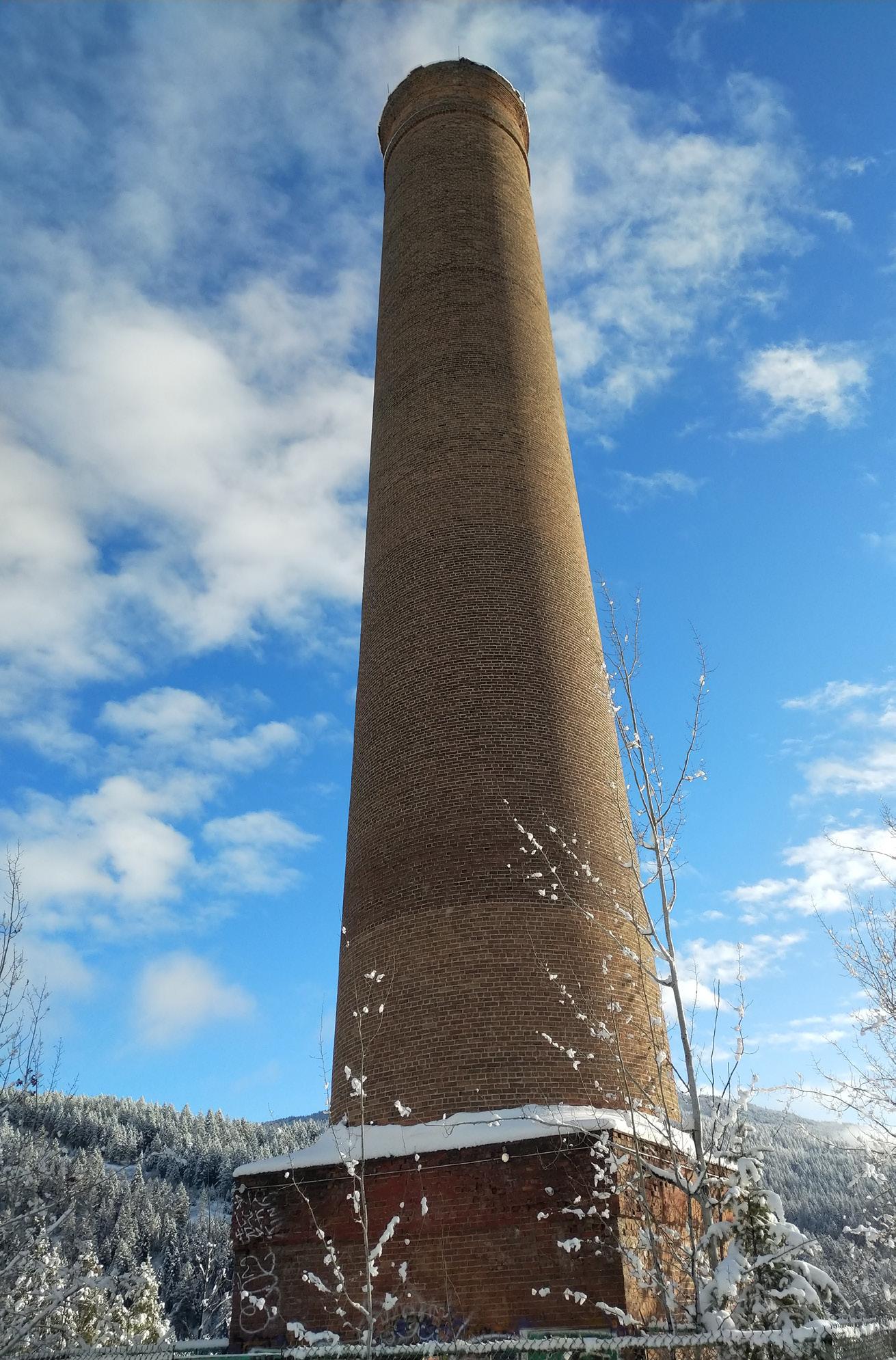
20 • BC MAG
DESTINATION
Top: Royal BC Museum E-03983141
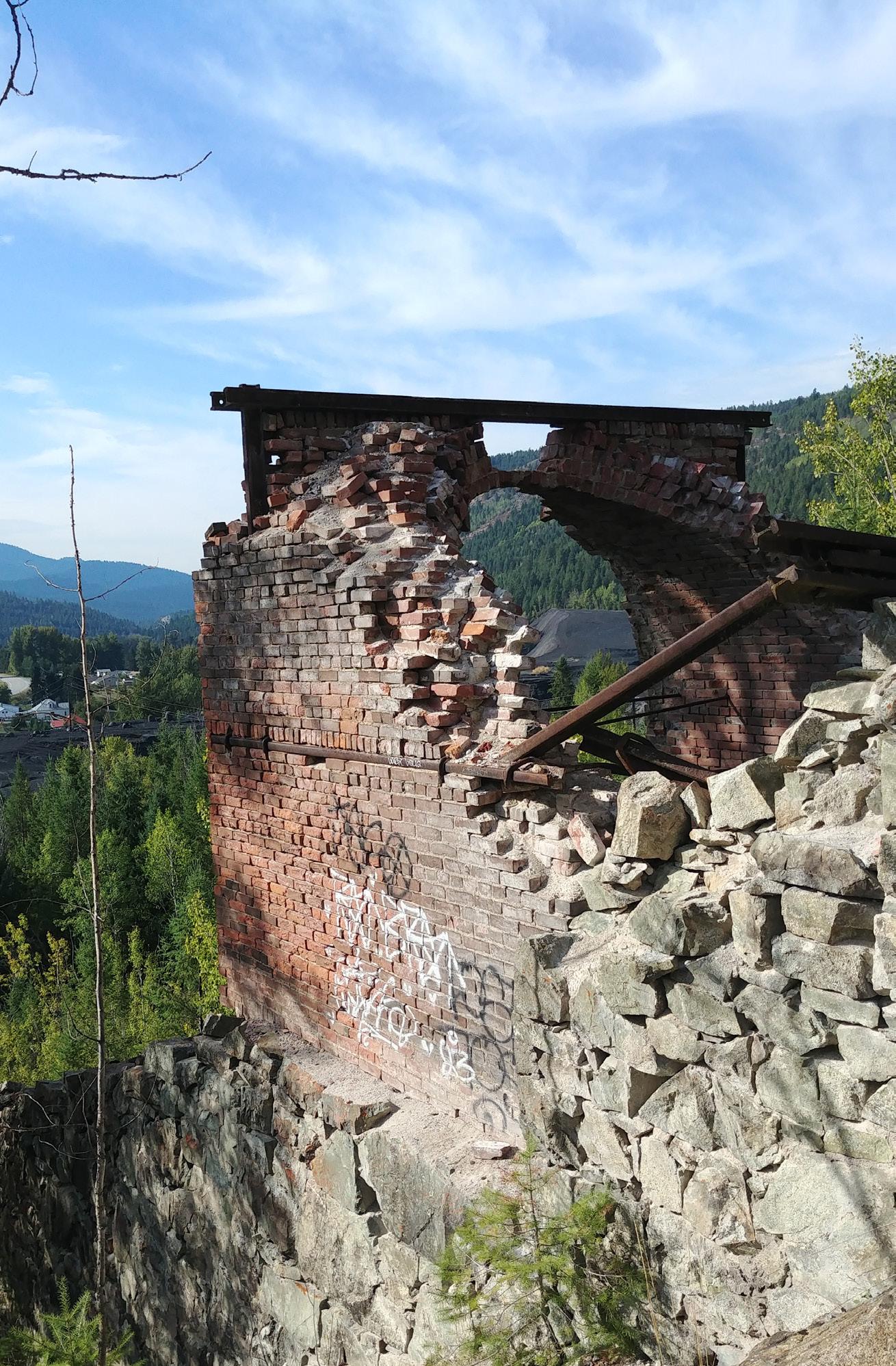
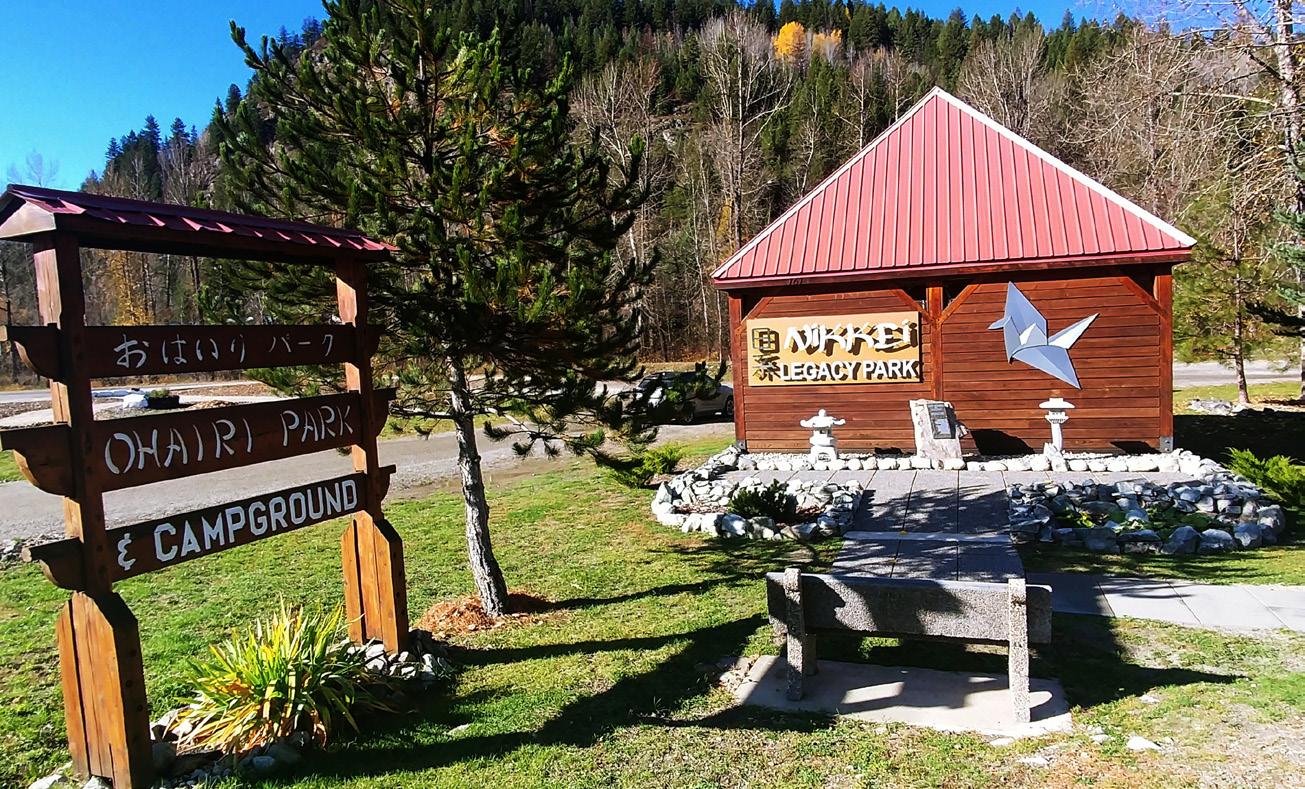
Left: What remains of the BC Copper Company smelter building, a Greenwood icon. Below: Nikkei Legacy Park.
Fast forward to 2014. Tasaka discovered Ohairi Park, which amounted to a picnic area with a little wooden bridge and a Japanese lantern representing the Japanese internment history. He had to do something. “I wanted to emphasize integration and harmony and change the name to Nikkei, which means ‘of Japanese lineage’. He started the Nikkei Legacy Park project that includes family plaques. Tasaka now has over 100 plaques, most of which are internment families. And when he wasn’t combing Boundary to find each and every living surviving senior, in his spare time Tasaka wrote two books on Greenwood.
GHOSTS
Maureen Grant’s grandparents came to Greenwood in the late 1890s. Her grandfather was superintendent of the Sunset Copper Mine and her father was born here. “I spent three summers in Greenwood working at the Pacific and Windsor Hotels, and during that time discovered a rich history, more relatives, and a few ghosts,” says Grant.
With so many tales and anecdotes to tell, she began Greenwood Tours, including “The Ghosts of Greenwood” walking tour. “Charlie hangs out at City Hall and a lot of people see him coming and going. Some janitors who work there see a little girl on the stairs. A girl was killed when a rock from the mine fell on her house and we thought it could be her but the True North Paranormal TV Show came here and said the girl was older. The janitors left toys for her and they move around at night. I leave a toy on my tour.”
Grant believes in ghosts ever since people told her about their ‘experiences’ at the Windsor Hotel. “All the doors had been removed during a restoration project, but a workman kept hearing a door slamming. Ghosts are mischievous, they can come and go and hang out where they feel most
BC MAG • 21
Ciel Sander X3
comfy,” quips Grant. As part of her tour, she takes you into the courthouse, built in 1903 and now the City Hall, and downstairs to the jail cells.
“There were three separate murder trials held in the courthouse and one of the murderers, Joshua Bell, lived with his paramour Annie Allen in Spokane. He stabbed her there and did time for it, and she moved to Grand Forks. Bell followed her, but Allen left him to work in a bawdy house in Phoenix, a few days before he killed her in the street. Bell tried to escape south of the border but he was hanged and his bones were given to the University of the North and used for god-knowswhat…” Ghost tours this year start in May through September.
AND THERE’S MORE to do in Greenwood, especially if you like the great outdoors. There’s golf, fishing, hiking and biking, an outdoor swimming pool and a lake nearby in the summer. In the winter, there’s ice fishing, downhill skiing and cross country, and there’s the Trans Canada trail to snowshoe. Doreen MacLean says put your skis on at your front door. Her neighbour circles around the ball field and she is good at it.
And if you want to live here, MacLean says Greenwood is a wonderful place to grow up, where people are kind to each other. “In our small community you drive by and wave to everyone—it’s also a great place to retire and we have some snowbirds six months a year,” MacLean adds. “Real estate is reasonable although it went up like everywhere else. The climate is not harsh but it helps to like winter sports.
“We have three motels and encourage tourists to stay for at least a few days to explore old mine sites and of course the museum where you’ll find me seven days a week from May 1 to October 31,” says MacLean. There’s a lot to keep you active, but I’m waiting for the indoor and outdoor pickleball courts.

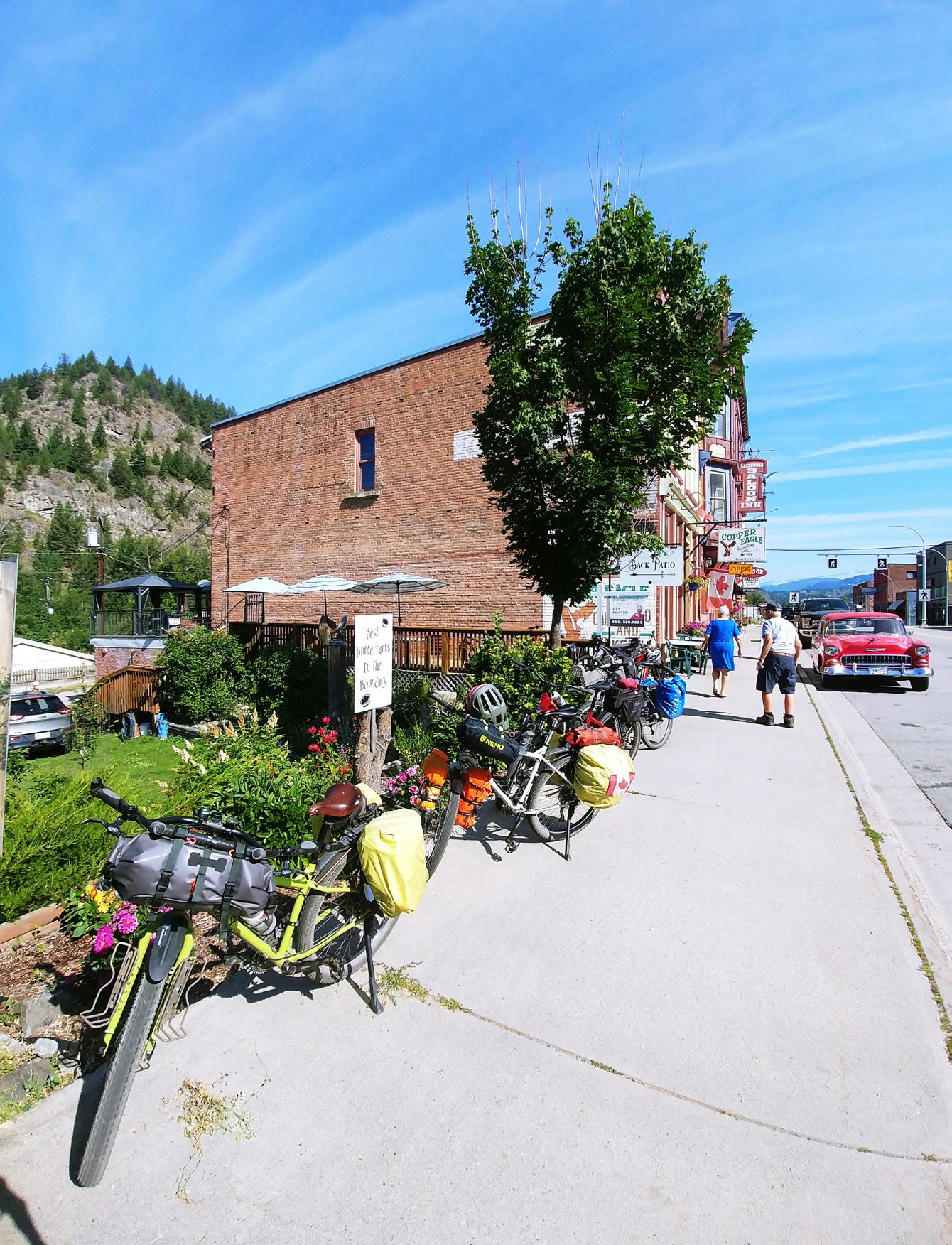
22 • BC MAG
DESTINATION Top: Courtesy Phoenix Mountain Ski Area
Right: In the winter season, good skiing can be found at nearby Phoenix Mountain.

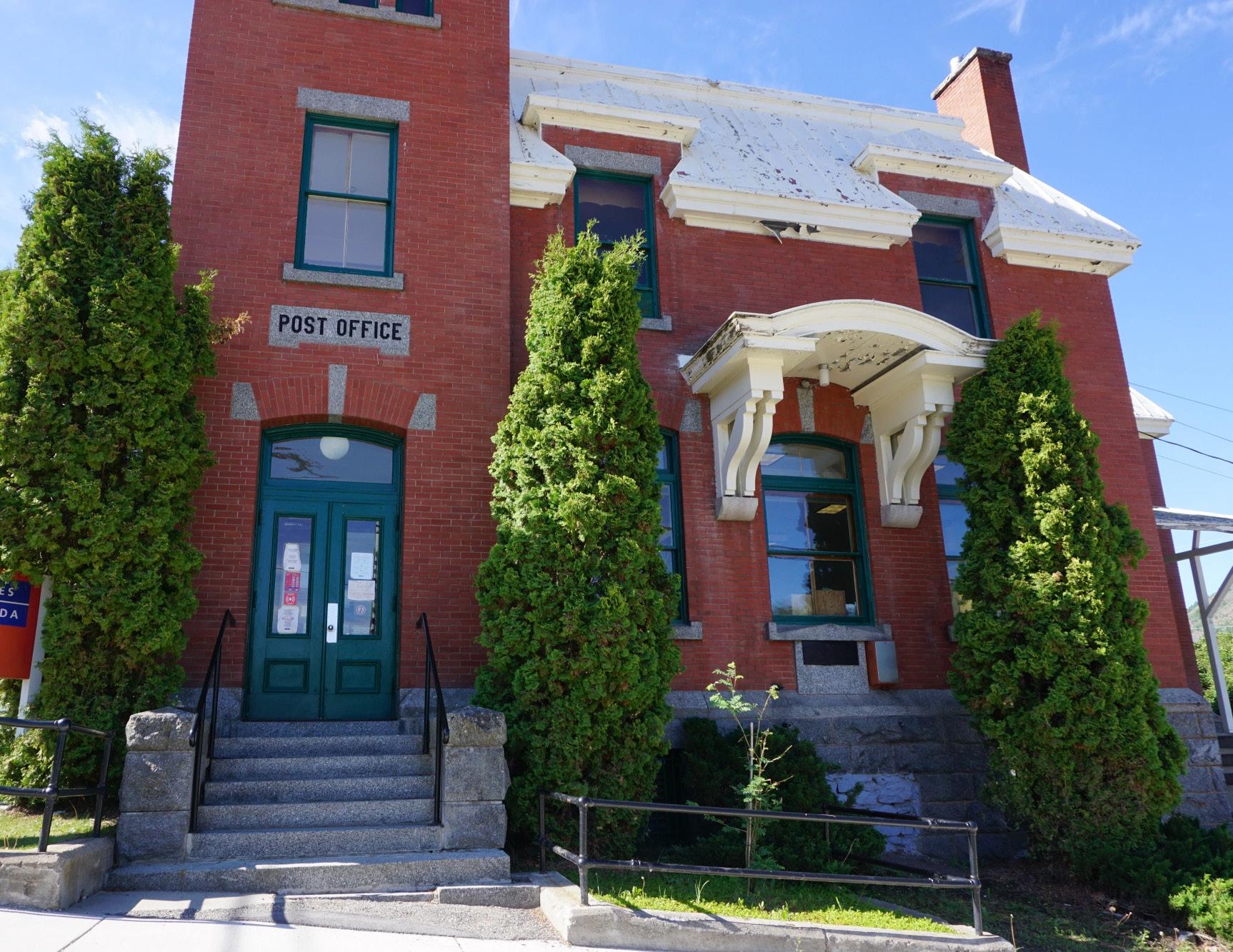
IF YOU GO
STAY
Evening Star Motel Just a 15-minute drive from Jewel Lake Provincial Park, Evening Star Motel offers a family-friendly environment just minutes away from Downtown Greenwood. eveningstarmotel.net
Barrel Cabins at Jewel Creek
Organic Farm Located 1.6 kilometres outside of Greenwood, these charming and rustic cabins are the perfect option for the outdoorsy visitor.
Greenview Motel & RV Park Set conveniently in central Greenwood, Greenview Motel & RV Park is one of Greenwood’s three motels. greenviewmotel.com
EAT & DRINK
Keg & Kettle Grill A short 10-minute drive outside of Greenwood, you will come across Keg & Kettle Grill where you can find staple meals such as burgers and soups that won’t disappoint. keg-kettle-grill.business.site
Copper Eagle Cappuccino & Bakery Enjoy a warm cup of coffee and a sweet treat at this hidden gem located in one of the town’s heritage buildings. yelp.ca/biz/copper-eagle-cappuccino-and-bakery-greenwood
PLAY
BC Copper Company Smelter Built in 1901 and used until 1918, the BC Copper Company Smelter has been abandoned ever since but still offers an impressive site with its tall brick chimney. greenwoodcity.com/city-info/ project-heritage-smelter-preservation/
Jewel Lake Provincial Park
Enjoy a walk and a swim at Jewel Lake Park, located east of Greenwood. bcparks.ca/boundarycreek-park/
Greenwood Tours Take one of Maureen’s tours through town to learn more about Greenwood’s history and its ghosts! greenwoodtours.ca
BC MAG • 23
Ciel Sander X3
GOODIES Gulf Island
JUMP ON THE GULF ISLANDS FERRY AND TREAT YOURSELF WITH THIS UNIQUE DINE-AROUND ADVENTURE, FEATURING SIX DELIGHTS THAT YOU WON’T FIND IN THE CITY
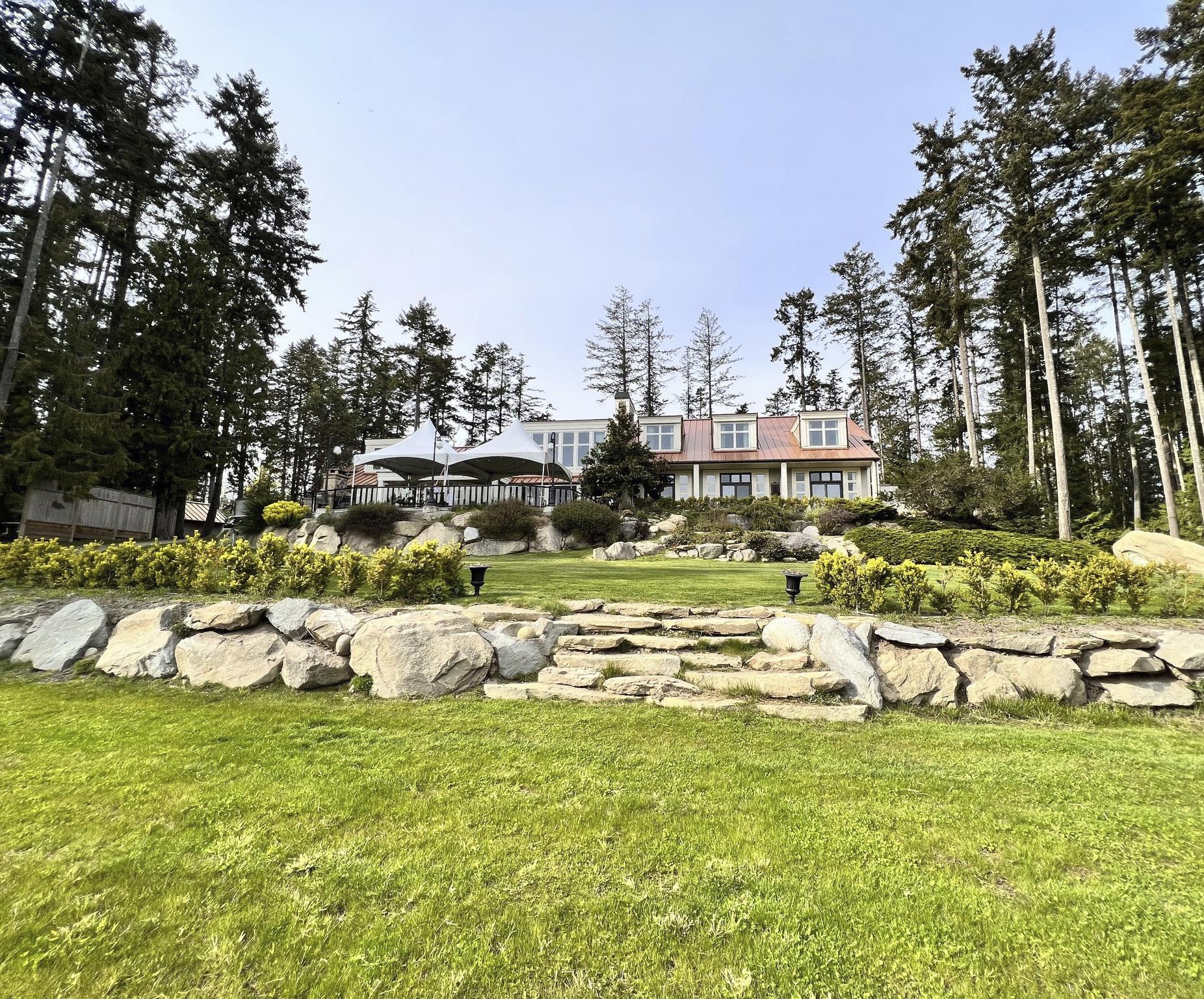 BY Cherie Theissen
BY Cherie Theissen
24 • BC MAG


Galiano Island’s Woodstone Inn
European luxury
No, we’re not in Europe, although the 12-room boutique hotel radiates that certain glow. Located on nine acres and overlooking pastures where horses graze, the inn originally opened in 1992 and was recently renovated by third owners Stephan and Roxanne Orlitzky, who bought it in 2017. Although it closes for the winter season, the opening of the inn and its sumptuous dining room
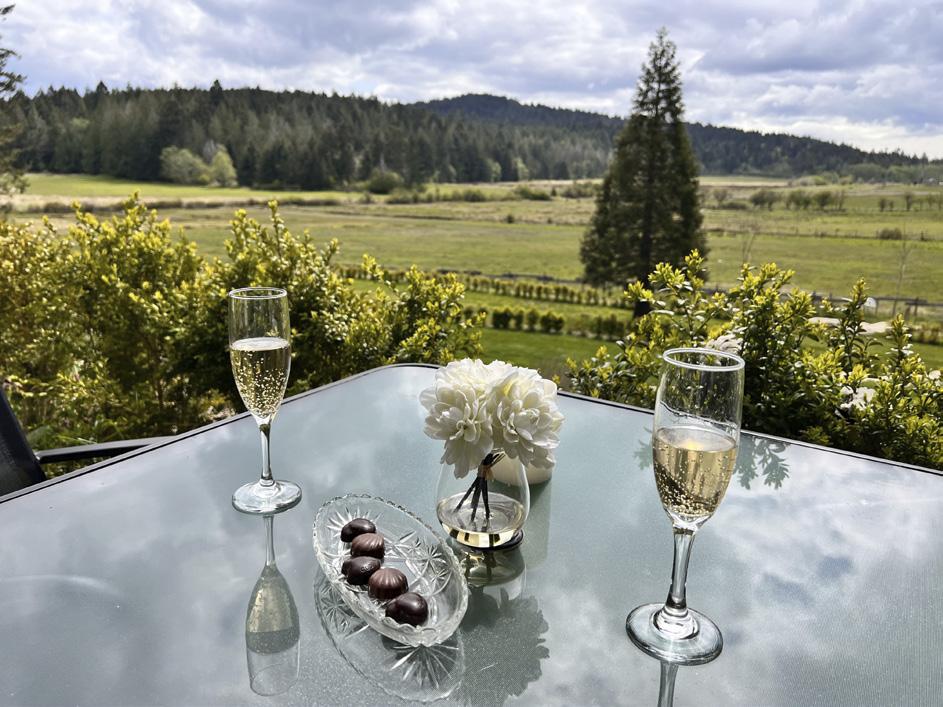
is always eagerly awaited. The Orlitzkys, who are world travellers, have been generous with sharing the antiques they have acquired on their travels. The bar in
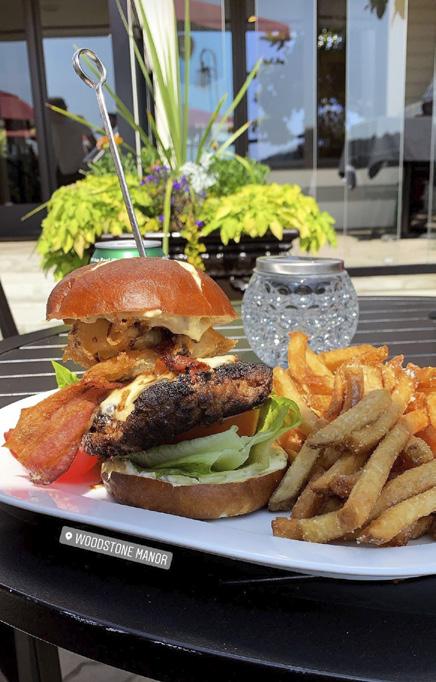

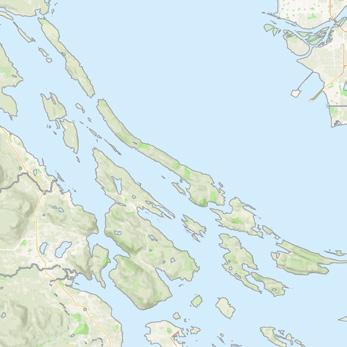
the dining room was originally a French side buffet from San Diego and the nearby six-foot cloisonné vase is from China, to mention only a few notables.
The menu itself is not to be upstaged by the elegant surroundings. I added prawns to my golden beet carpaccio salad while my partner David opted for a caesar salad and a seafood-laden cioppino, both of which were further enhanced by glasses of crisp sancerre. While menus will change in the upcoming season, there is every reason to believe the chefs will continue to outdo themselves and the old-world ambience and charm will never go away. Check their website for opening dates and special events. Brunches can sometimes be on offer too. By the way, inn staff will pick up diners to and from the ferry.
woodstonegaliano.com
BC MAG • 25 MP Studio
1
Top: Liam/Adobe Stock; Courtesy of Woodstone Inn
X5
Galiano Island
X
Mayne Island’s Montrose Local
Fun and games
Good news travels fast in the Gulf Islands, so when Stephanie McBurney and Jeff McPherson opened up Montrose Local in Mayne’s Fernhill Centre two years ago, we were there for lunch. Now it’s one of our regular trips and with a BC Ferry cruise through the Salish Sea and the Gulf Islands thrown in, what’s not to love?
Can you imagine coming into a place, choosing some music you like, sitting down with the chef and discussing food issues and then letting the culinary team go to work to prepare the whole experience from start to finish? This unique idea has now appeared on the menu under Chef Experience, a multi course dinner for those who can’t decide or love the idea of being surprised.
Chef McPherson, who has a long history in the culinary arts, says he loves creating different ethnic
foods with his two other chefs, Mike Smith and Jan Gumbmann, ensuring that the dishes are constantly changing. “I have an outstanding team. We have a lot of fun in the kitchen and there’s a lot of collaboration. We feature freshness and quality—everything comes in fresh except for the prawns and everything is made from scratch.”
I’d swear that the fun they have in the kitchen finds its way into the food too.
The owners are always coming up with fun themes like their popular family nights, for example. “We’d never tackle this in the city,” MacPherson laughs. “But it works here. And the culinary theme nights, where our chefs collaborate, is very popular.”
This is always going to be a place for families, locals and visitors with local knowledge to hang out, and when the warm ambience is paired up with food that will probably never be tasted again, we think it’s a very good thing.
facebook.com/themontroselocal
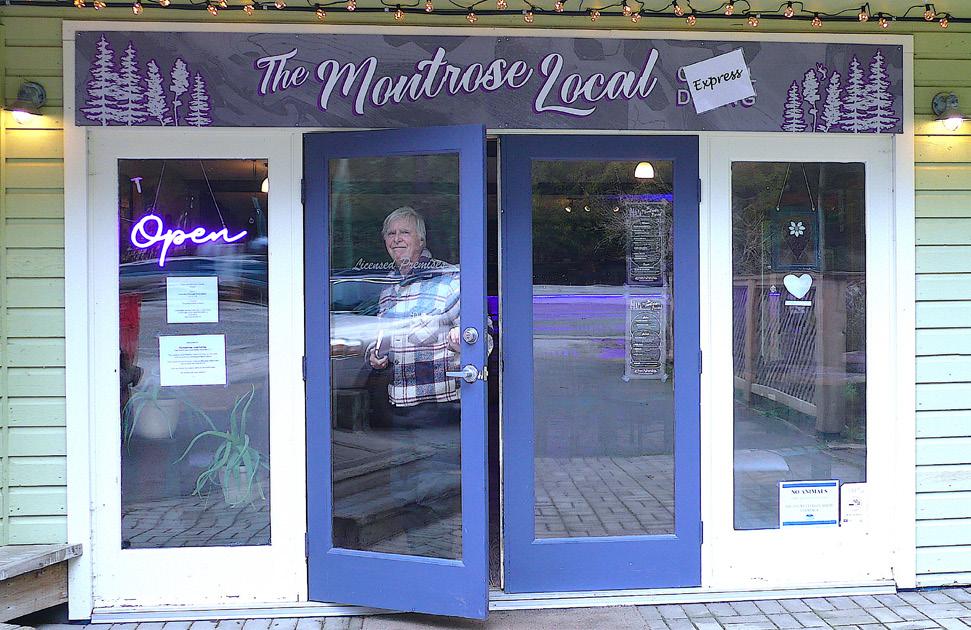
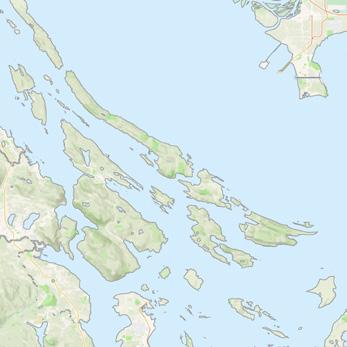
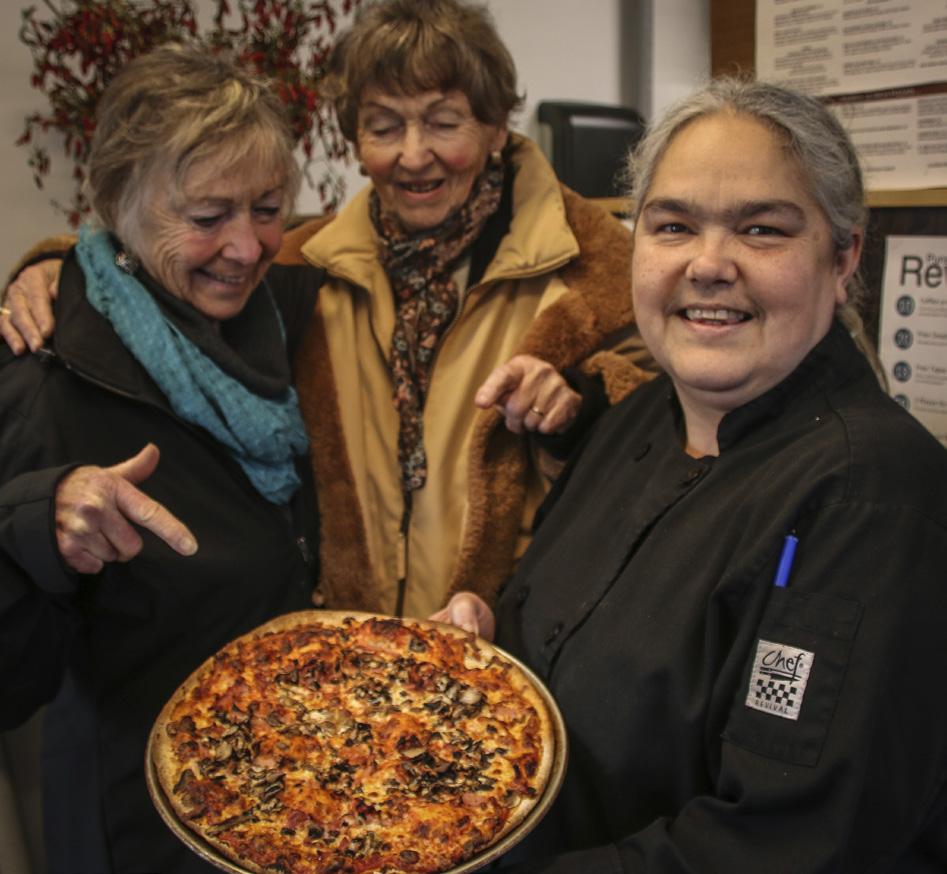
Galiano Island’s Babes in the Woods
Pizza queen
Since 2014, a determined single mother of two has been creating culinary magic and the locals can’t get enough. It’s a love affair that’s reciprocated. “Galiano kept me and my family safe. I don’t know how the story will end but that’s OK when you can trust and lean into the community around you,” Lisa Gauvreau says as she sprinkles cilantro over caramelized red onions, her own barbecue sauce and roasted chicken.
This is my pizza I’m talking about, and I won’t be sharing with my companions either. A peanut satay pizza with curried vegetables is waiting in the warming oven and the barbecue salmon will be next up.
Because she has recently moved locations and now cooks up a storm in her own building, there are currently no indoor din-

ing facilities. However, there are lots of comfortable tables outdoors, or you can always do what we did and feast in your car at the ferry. The surroundings may not be classy, but this pizza eclipses any background.
Hard to believe this pizza queen does it all, with a very busy Warren Arcand at front of house and two occasional helpers.
And to make it all the more amazing, it’s not just out of this world pizzas she creates. Islanders have been ordering soups, salads, dijon glazed salmon dinners, tacos, and appies since we arrived. Definitely Gauvreau’s 35 years in the food business is a big asset, but it’s still awesome.
She tells me she makes 10,000 pizzas a year and trust me, it is honestly worth the ferry trip just to have one of them. (Babes in the Woods is only a block away from the terminal too.)
facebook.com/babesinthewoodseatery
26 • BC MAG
Galiano Island X
X 2 3
Mayne Island
Left: Cherie Theissen; Above: Hans Tammemagi
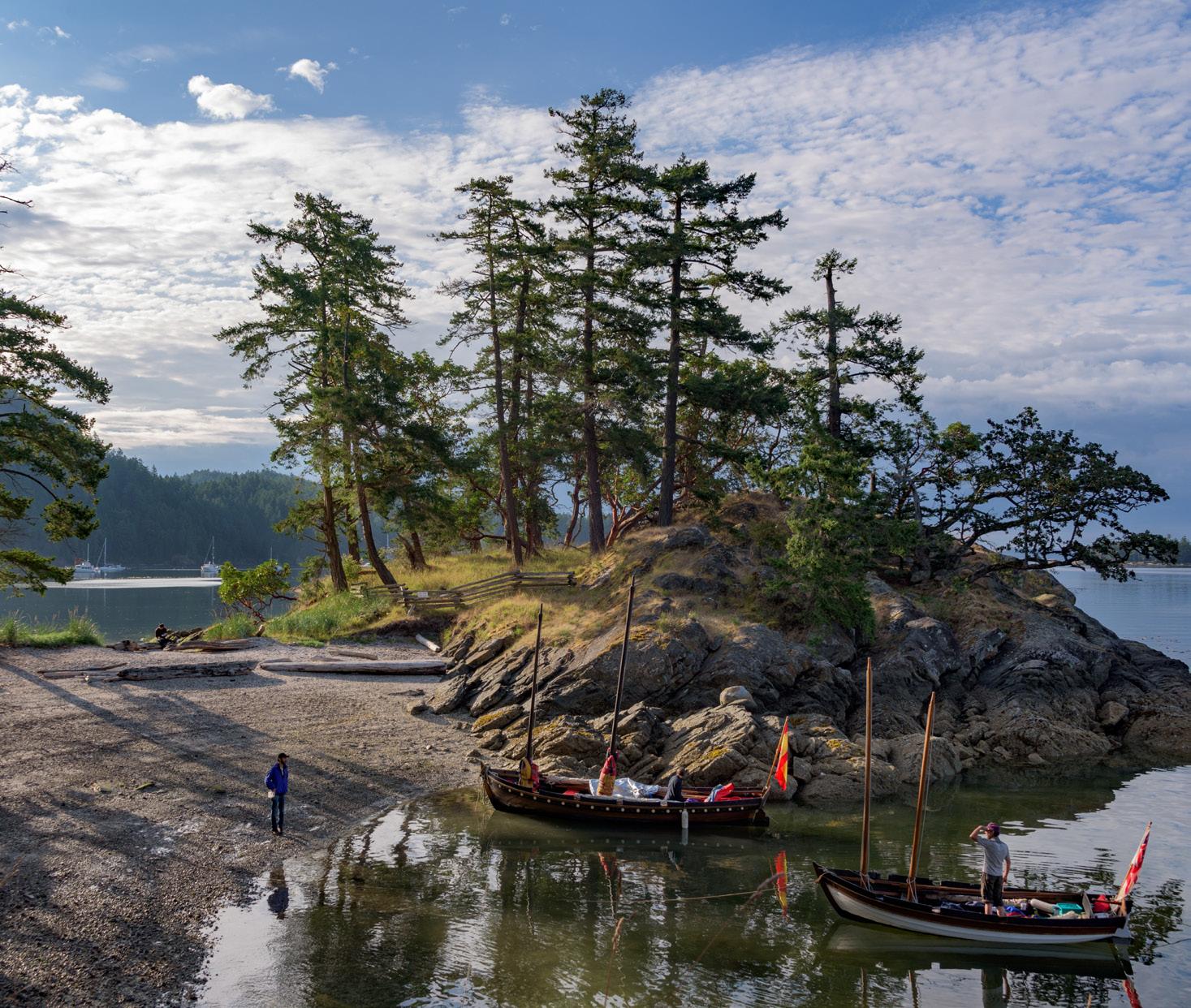
Pender Island’s Slow Coast Coffee
If you bake it, they will come
It isn’t easy for small businesses to survive on the Gulf Islands, with their small permanent populations and seasonal summer visitors, but given the fact that Alison Feargrieve and her partner Rob McCallun have operated this 300 square-foot Pender Island hub in North Pender’s Medicine Beach for more than 10 years, you know they have to be doing something right.
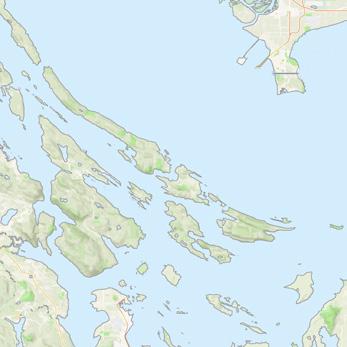


was comfortable and cozy and welcoming for folks to come.” They must really love what they do because even with the capable help of an assistant baker and assistant barista, they still can’t manage to take a twoweek holiday.
They survived Covid because they’re small, says Feargrieve, and because the locals refused to let
them die, ordering from the window and mingling and munching at the sheltered picnic table outside while also enjoying the Bedwell Harbour views. They also survived because they are just darn good at what they do! McCallun serves up lattes and cappuccinos that
look too good to drink, while his partner bakes delectable goodies like my favourite pecan toffee squares. “The relationship with Slow Coast and the community was cemented fairly quickly,” says the latter, “and that’s good because we both love community and wanted a great creative space that
Slow Coast opens early and closes mid-afternoon, which is just as well because the baking is pretty much gone by then. While Feargrieve says many locals come for the coffee and goodies, there is always a faithful crowd who wait for the ever-changing luncheon special. Today, we’ve been enjoying the popular buddha bowl but savouries like dosas, quesadillas and crepes are always on hand daily. Slow Coast cooks have dietary restrictions in mind so there are lots of vegan choices too.
Come in on a Sunday afternoon and you will be really into Gulf Island vibes. That’s when local talented musicians get together to jam in the cozy adjoining ‘reading room.’
facebook.com/PenderislandSlowCoastCafe
BC MAG • 27
X
Pender Island
4
Top: Liam/Adobe Stock; Above: Cherie Theissen
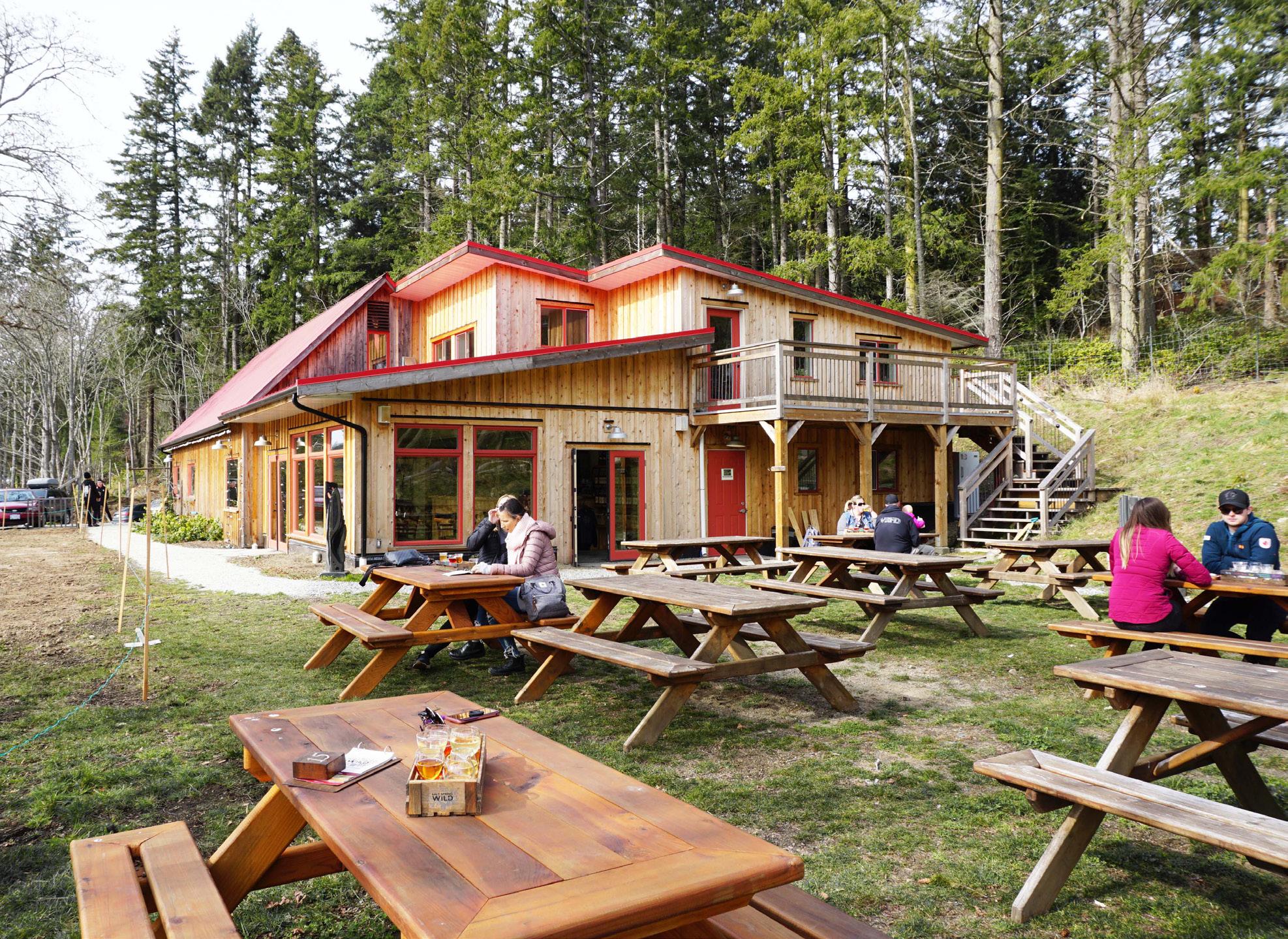
Salt Spring Wild Cider
Celebrating the apple in style
Production manager, Jesse Scott, is our server today. He has been here seven years and remembers those early days when he was virtually a ‘Boy Friday’, doing everything from greeting guests, bottling brew and selling ciders in what used to be the horse barn. We look out on fields, fruit trees, firs and tables adorned with colourful but droopy umbrellas, awaiting spring’s warmer weather. The ample choice of award-winning ciders ranges from rhubarb to rosemary, Saskatoon berry to scrumpy, elderberry to
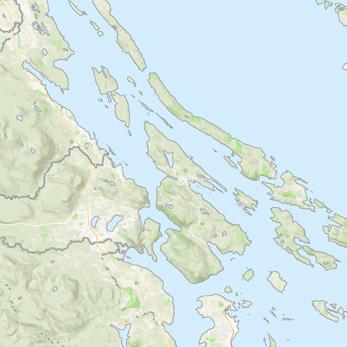

pear. We order a generous platter of charcuterie accompanied by a large flight of ciders while we enjoy the fully enclosed and warmly heated pergola that has recently been snugly enclosed. Wild
Cider is open year-round and is family and pet friendly. Seniors are treated pretty royally too.
Gerda Lattey, co-owner with Mike Lachelt, tells us there are more than 450 varieties of apples grown on Salt Spring, some over 100 years old. They won’t be running out of product any time soon then and that’s a really good thing.
saltspringwildcider.com

28 • BC MAG
X
Salt Spring Island
5
Stock
Courtesy of Salt Spring Wild Cider X2; Above: edb3_16Adobe
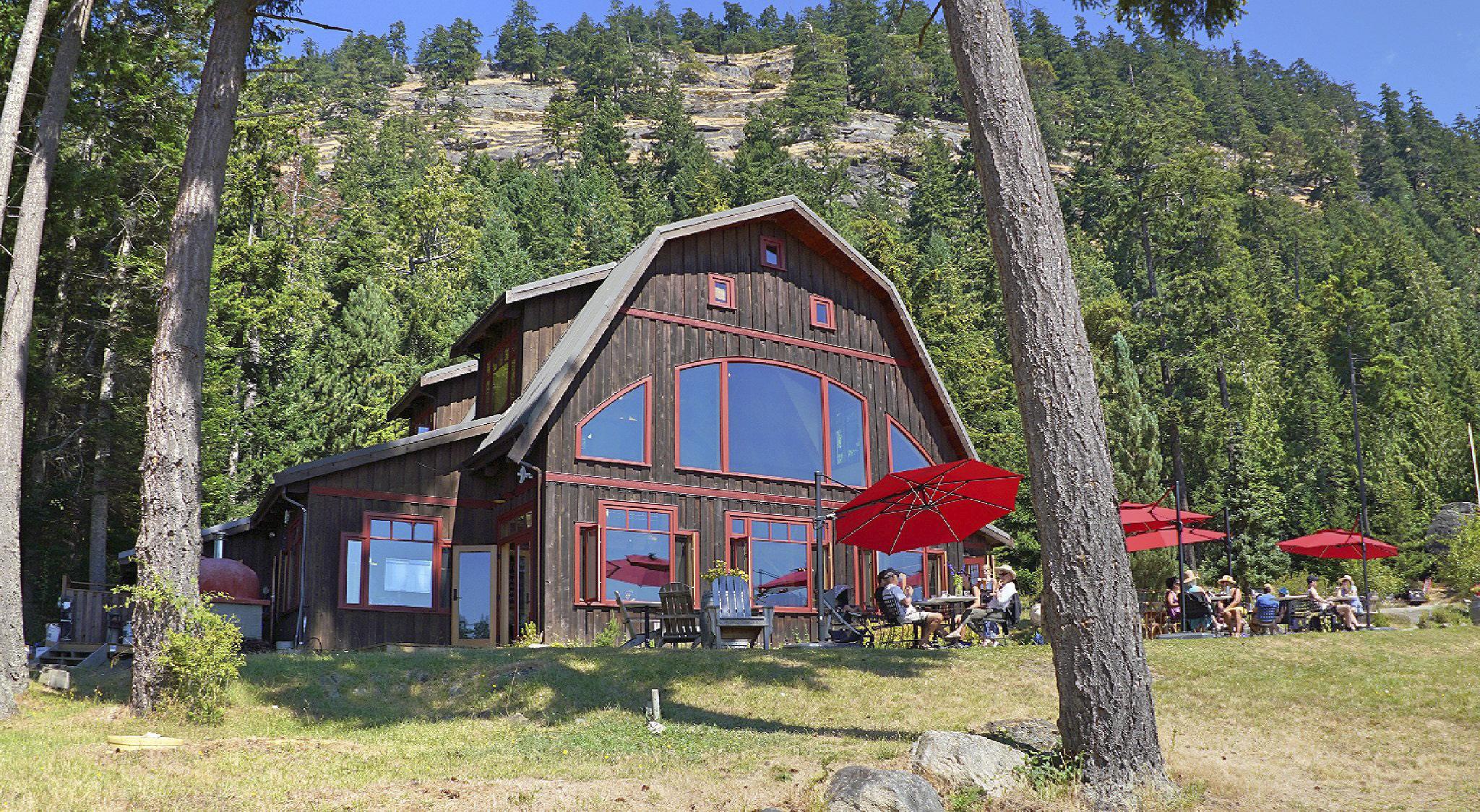

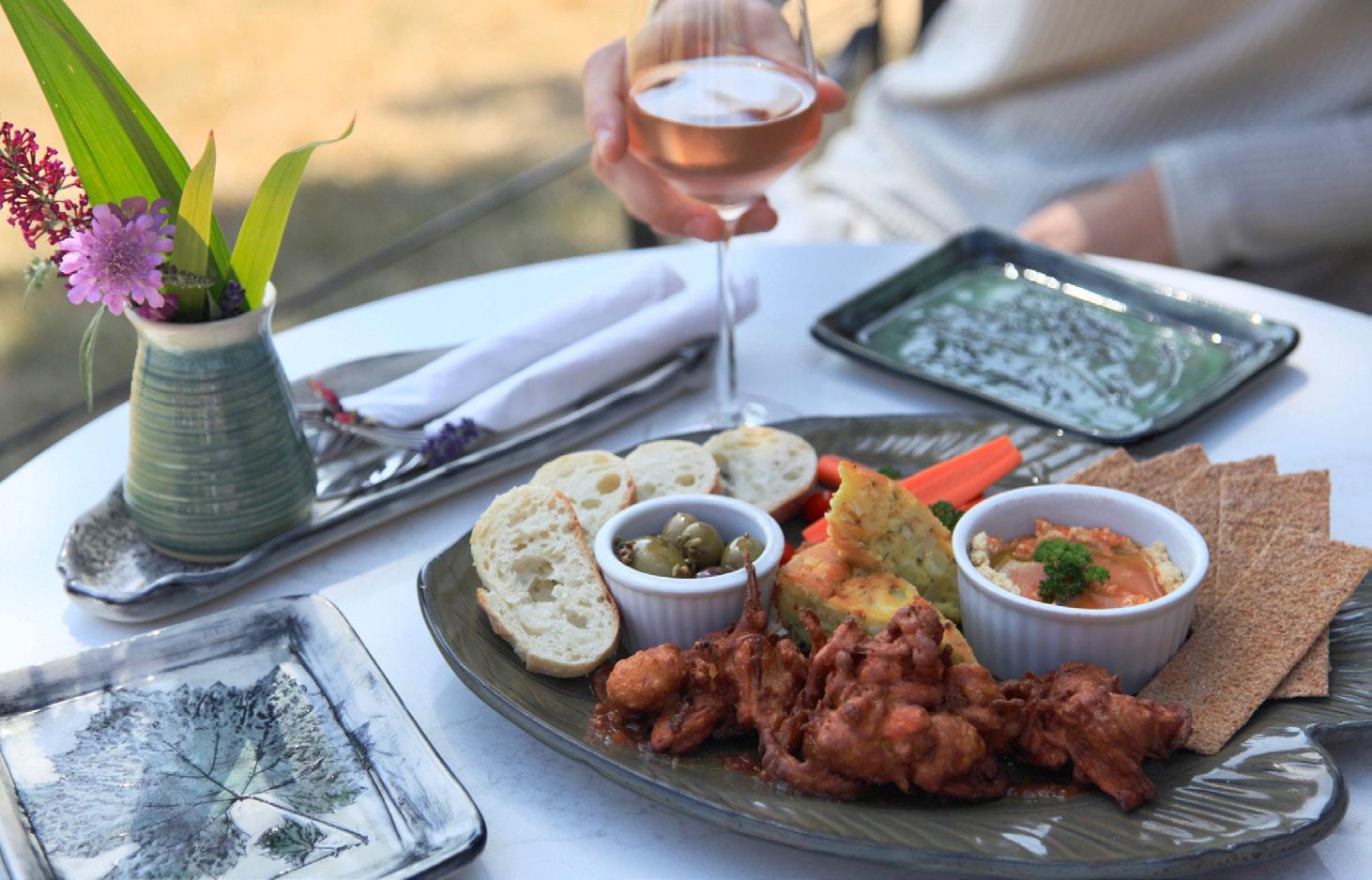
Saturna Island’s Feral Goat Bistro at Sage Hayward Vineyards
Grape meets gourmet
After sitting idle for three years, this 70-acre property with its 40 acres of grape vines was purchased by long-time Saturna islanders, Anne and Doug Hayward, along with Doug’s brother Ian and Ian’s wife, Wendy Sage-Hayward. There was much to be done, but luckily the combined family is a large one with multi talents; it was done and in a big way. We think one of
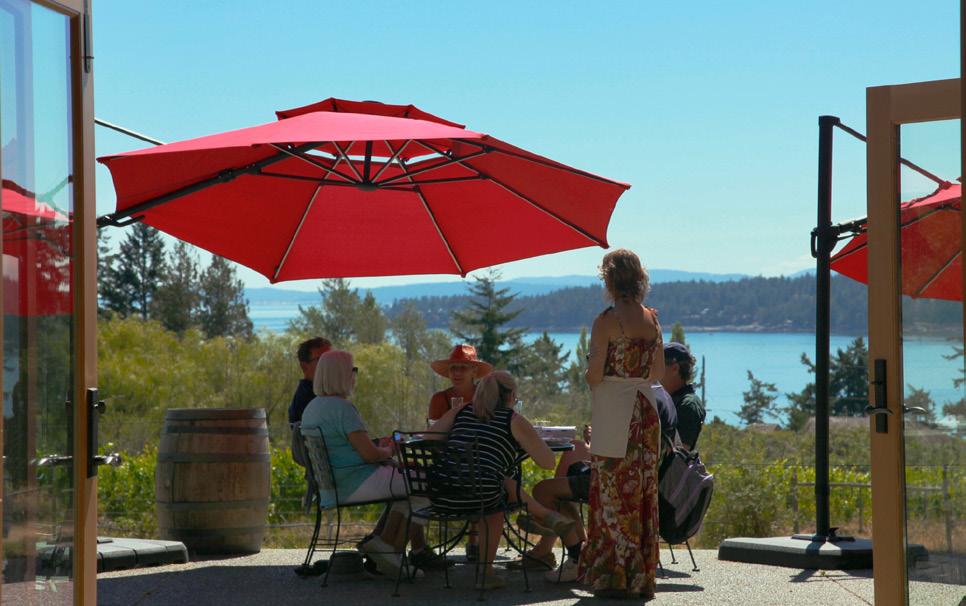
the best things they’ve done is to renovate and re-open the tasting room and bistro, bringing it back from its early days of dreaming big. When the original winery, which opened in 1995, started having its annual Harvest Festival, we would come by every third week-
end of September because we knew Saturna’s own food guru, Hubertus Surm, would be cooking magical dishes like his signature mussels in a tomato lime leaf curry. Surm’s culinary skills are a legend, and we’ve been forever grateful to Saturna for enticing him there
from Isadora’s on Vancouver’s Granville Island where he was executive chef. Surm thought the Saturna move was semi-retirement, but no chance. He was soon managing chef at the Saturna Café in the General Store as well as cooking up a storm for winery events and the local inn.
On the day we sail over from Pender Island, we sit outside absorbing the views over Plumper Sound while enjoying a flight of the winery’s offerings, finally deciding on a bottle of pinot gris to go with our lunches of scallop ceviche followed by a shared mezze platter. (House made pakoras, potato cakes and hummus served with tandoori chutney and pickled vegetables and crackers to scoop it all up.)
The scenery and ambience is 10 out of 10 and when you can get such a choice of wine and food like this on a small Gulf Island, why wouldn’t you come?
The bistro closes for the winter but will be opening on Mother’s Day and then operating Thursday thru Monday. West Coast dinners on Saturday and Sunday nights are highly recommended, but if you can only make it to Saturna once this year, definitely come by on August 31 when the Harvest Festival returns. It’s another experience you can only have on a Gulf Island.
sagehaywardvineyards. com
BC MAG • 29
X 6
Saturna Island
Courtesy of Feral Goat Bistro X3
GIANTS SPOTTING
A GUIDE TO WHALE WATCHING IN BC
BY MARGAUX PERRIN
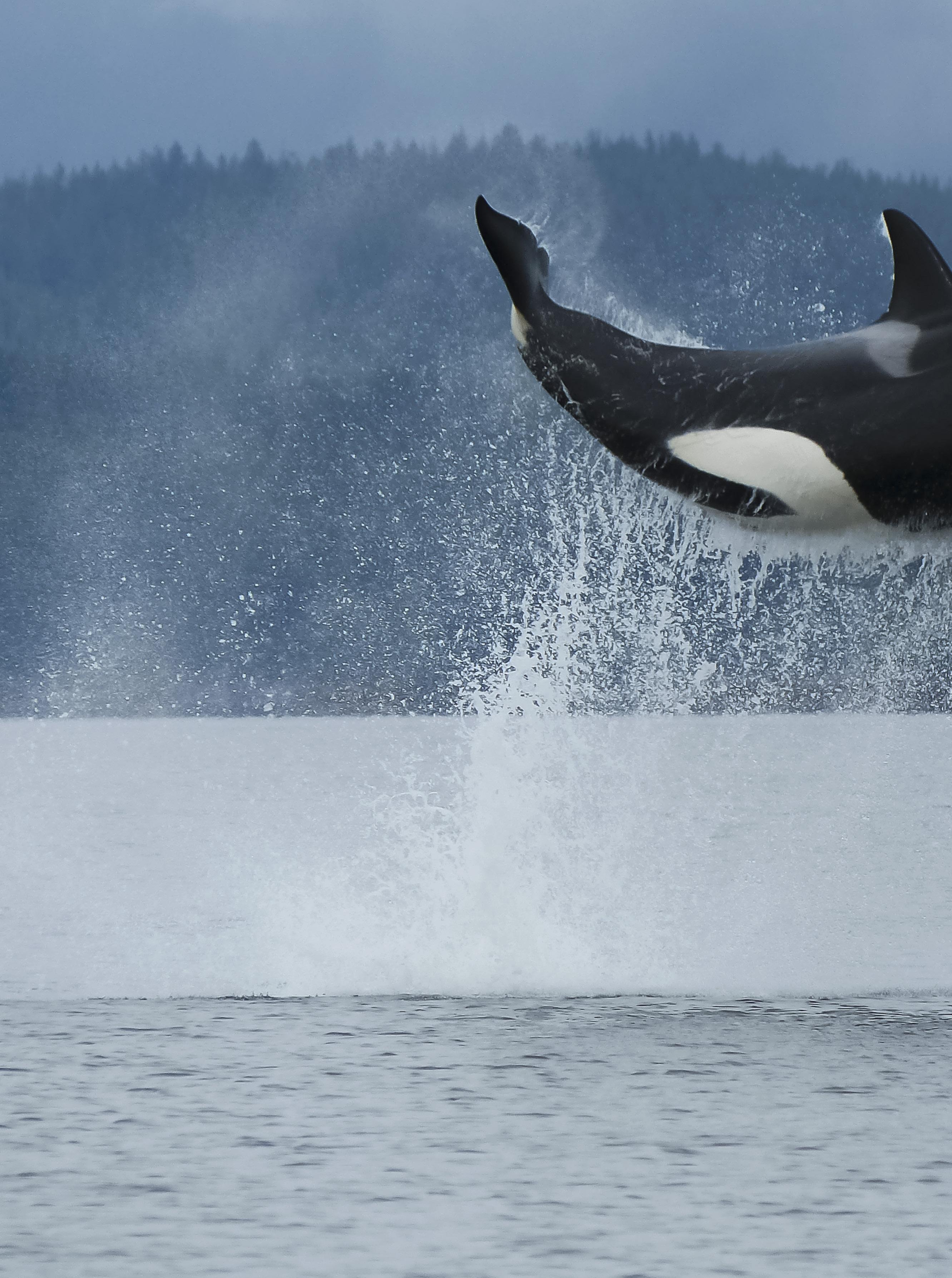

Destination BC/Garry Henkel
Orca breaching off the coast of Vancouver Island.
WWhales may be the largest animals on earth, but they disguise themselves from the surface impeccably. However, once in a while they rise up to inhale a breath of fresh air, and that is when lucky eyes can spot them and admire them from a safe distance.
Wilma Fuchs has been a professional whale spotter, more commonly known as a whale watching tour guide, or naturalist, at Prince of Whales for more than a decade. Prior to joining Prince of Whales, she volunteered for the Vancouver Aquarium for six years, which is where she fell in love with marine mammals. Determined to pursue a career that would allow her to work with marine mammals, she turned to whale watching companies. “12 seasons and 11 years later, I am still working on a whale watching boat and absolutely loving it!” says Fuchs.
Simon Pidcock, captain and owner of Ocean Ecoventures, is another person who was destined to have a career in the marine industry.
“Being able to spend time on the wa-
ter exploring the Salish Sea, seeing the waters around Vancouver Island and photographing the wildlife made me realize what a unique ecosystem and what an amazing place in the world that we live in, and I realized that I could actually share those experiences and the wildlife with people all around the world,” says Pidcock, who grew up in a wooden shipyard and got his first boat at four years old. “I really felt that it was a great way to inspire people to make personal change, to look after our local environment, and not even just our local environment, but as we see people from all around the world, really inspire them to try to make a difference in their daily actions.”
Whale watching is a popular and educational activity in several areas of the BC coast, where there are three distinct whales commonly found: resident and transient killer whales from the orca family, and humpback whales.
RESIDENT KILLER WHALES
Mysterious and breathtaking, resident killer whales rely on their family to survive. In each family group, the female assumes the leadership role as matriarch. Each family of whales is classified into pods, or groups, and in almost all cases, residents spend their whole lives attached at the fins of their family members. They are also on a strict fish-diet, composed mainly of salmon. Resident killer whales can be
32 • BC MAG
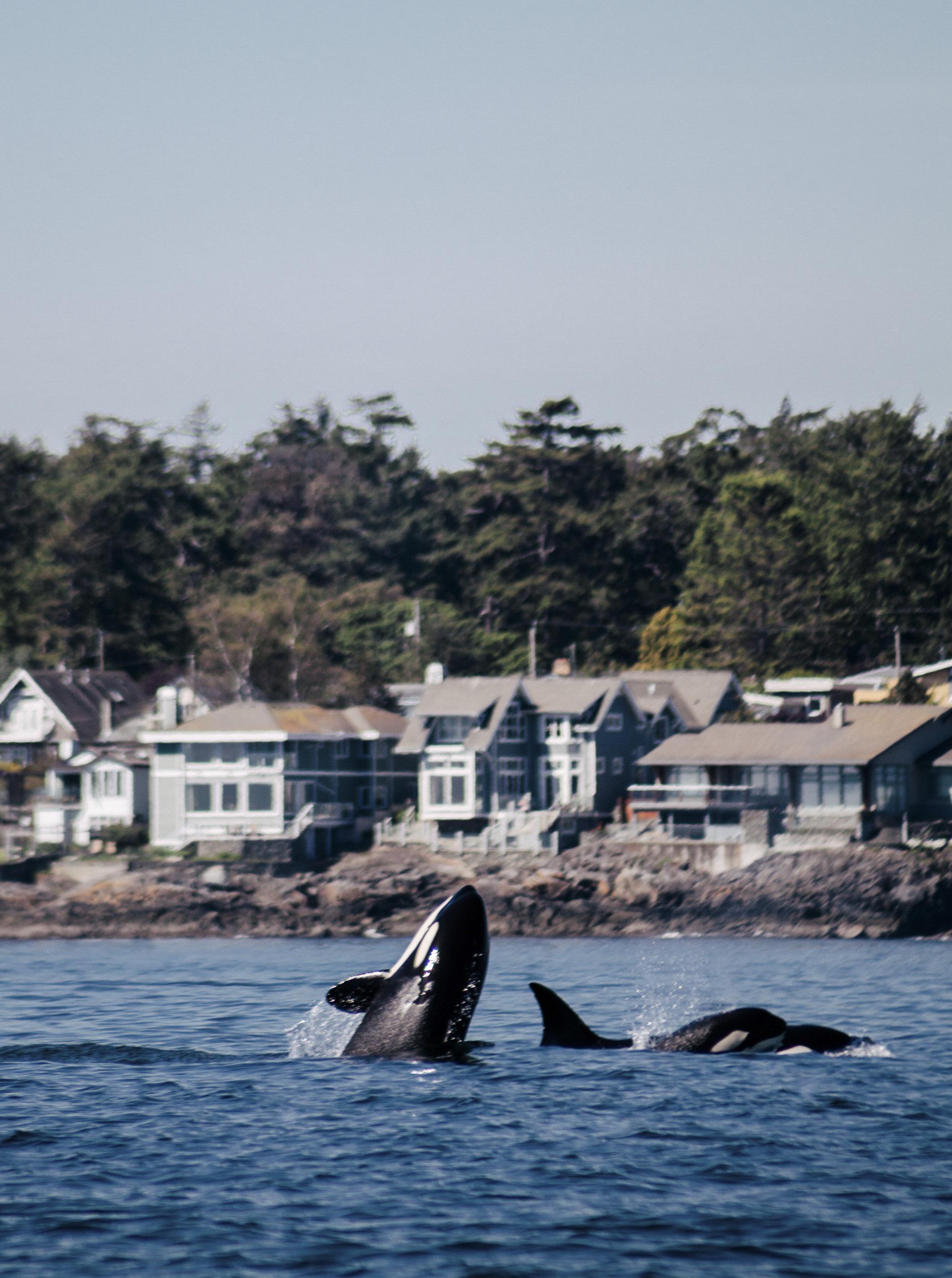
Destination BC/Jordan Dyck
A pod of Orcas swimming off the shoreline in Victoria.
A humpback whale breaching.
Although the specific reason for why the humpbacks perform this spectacular move is not clear, there are a few possible explanations such as a way to communicate, to attract eligible mates or simply to have fun!
divided into two communities in BC; northern and southern residents. The northern residents are the most common types of whales in Alaska and the northern part of the BC coast. However, as a whale watching tour guide around Vancouver, Fuchs has only spotted a small group of northern residents twice in her career.
Since 2001, the northern residents have been listed as threatened, while southern residents have been listed as endangered. “Over the last 10 years, we witnessed a decrease in the numbers of southern residents killer whales” says Fuchs. “One reason we know of is the decrease in chinook salmon runs, returning to spawn in the Fraser River. Orcas are forced to travel further to find food.”
Pidcock says that for his first 12 years as a whale watching operator, he saw a lot of southern residents. He once had a 126-day long streak where he saw them every single day. “It shifted all of the sudden and we started encountering more and more Bigg’s killer whales or transient orcas,” he adds.
TRANSIENT KILLER WHALES
Although transient killer whales, also known as Bigg’s orcas, are cousins of the resident killer whale, these two branches of the family do not interact. A major difference between these two species is that transient whales will feed exclusively on marine mammals, such as harbor seals and sea lions. To sustain that diet, they have been increasingly roaming around the Salish Sea, as it has recently become more and more abundant with prey. As a result, Wilma and Simon both mentioned there has been an increase in numbers of transient whales over the last 10 years.
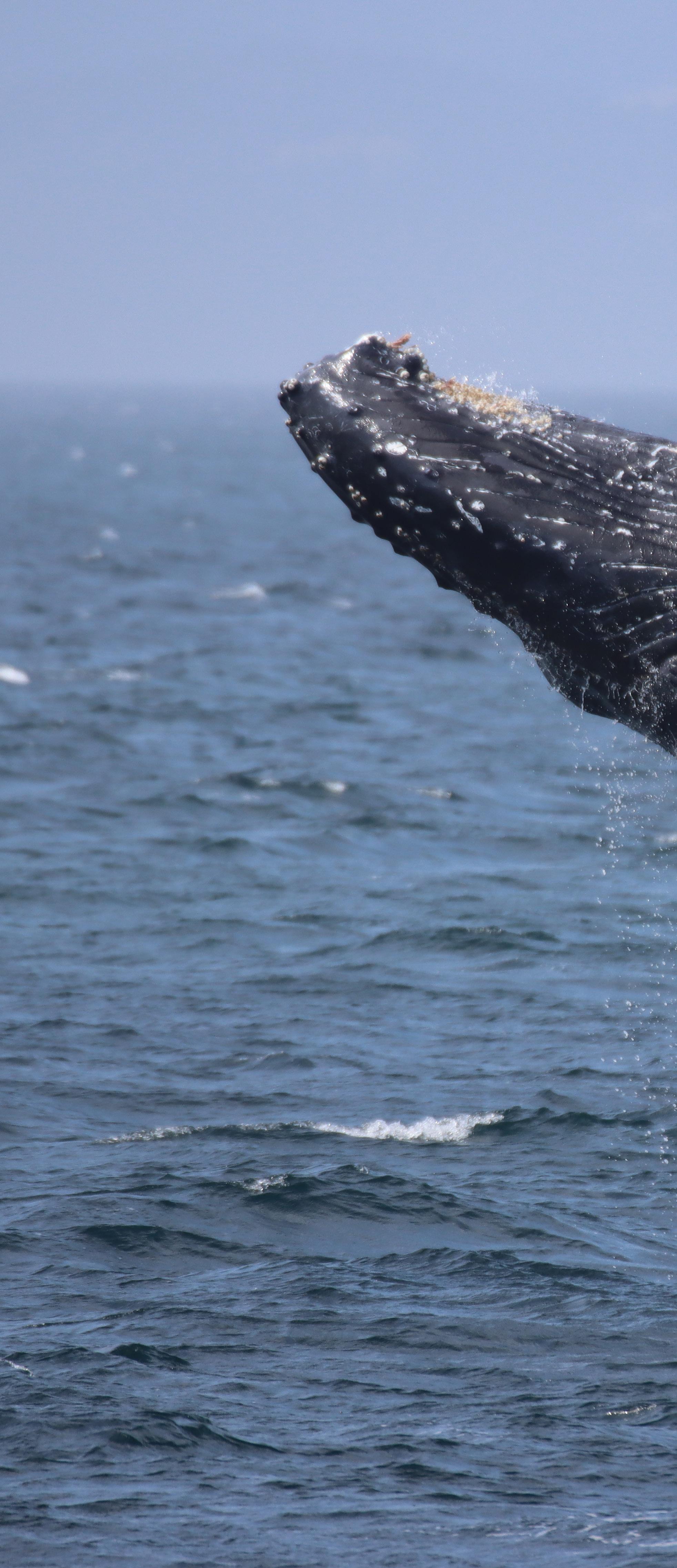
34 • BC MAG
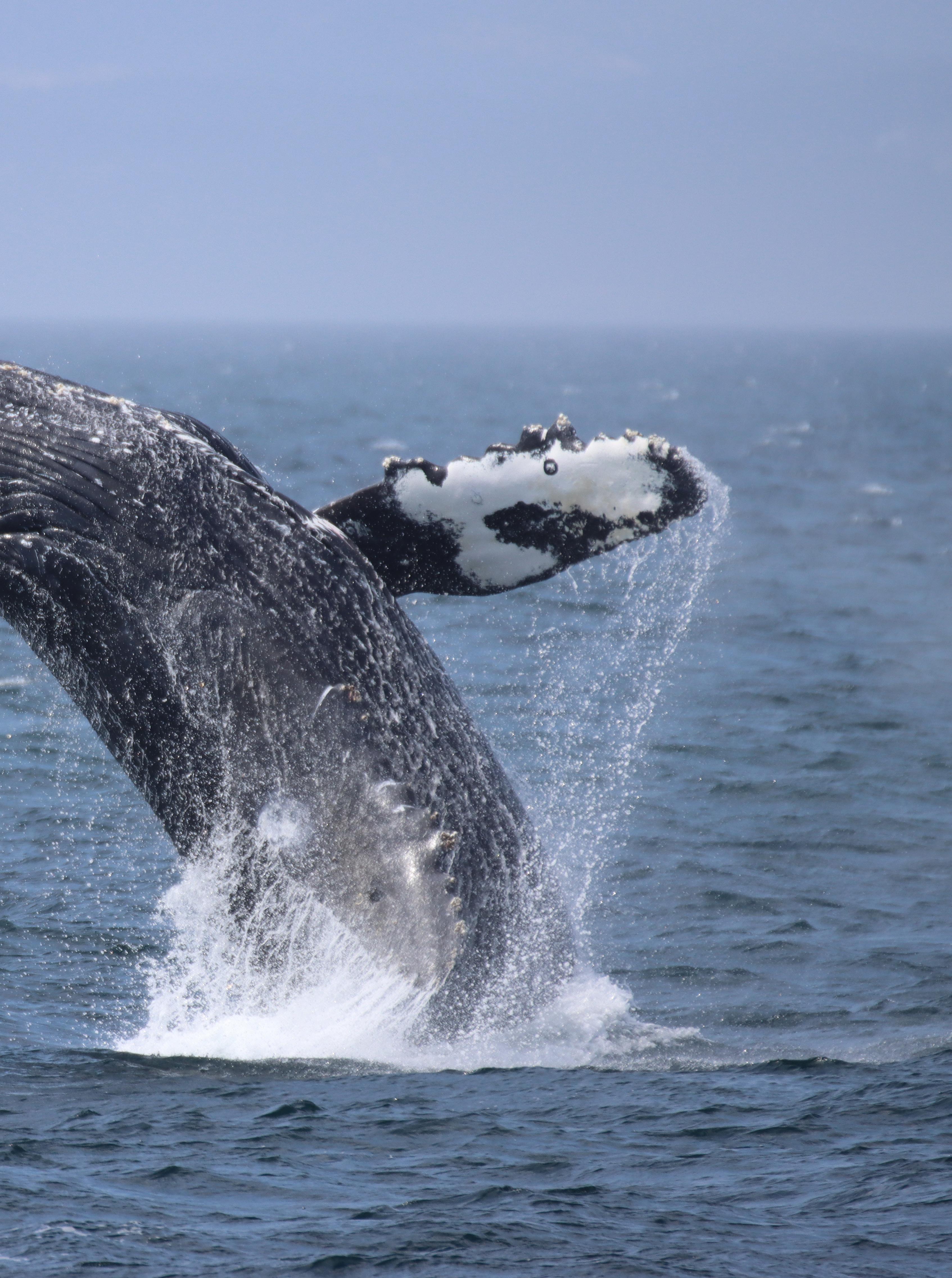
Prince of Whales/Seanie Malcolm
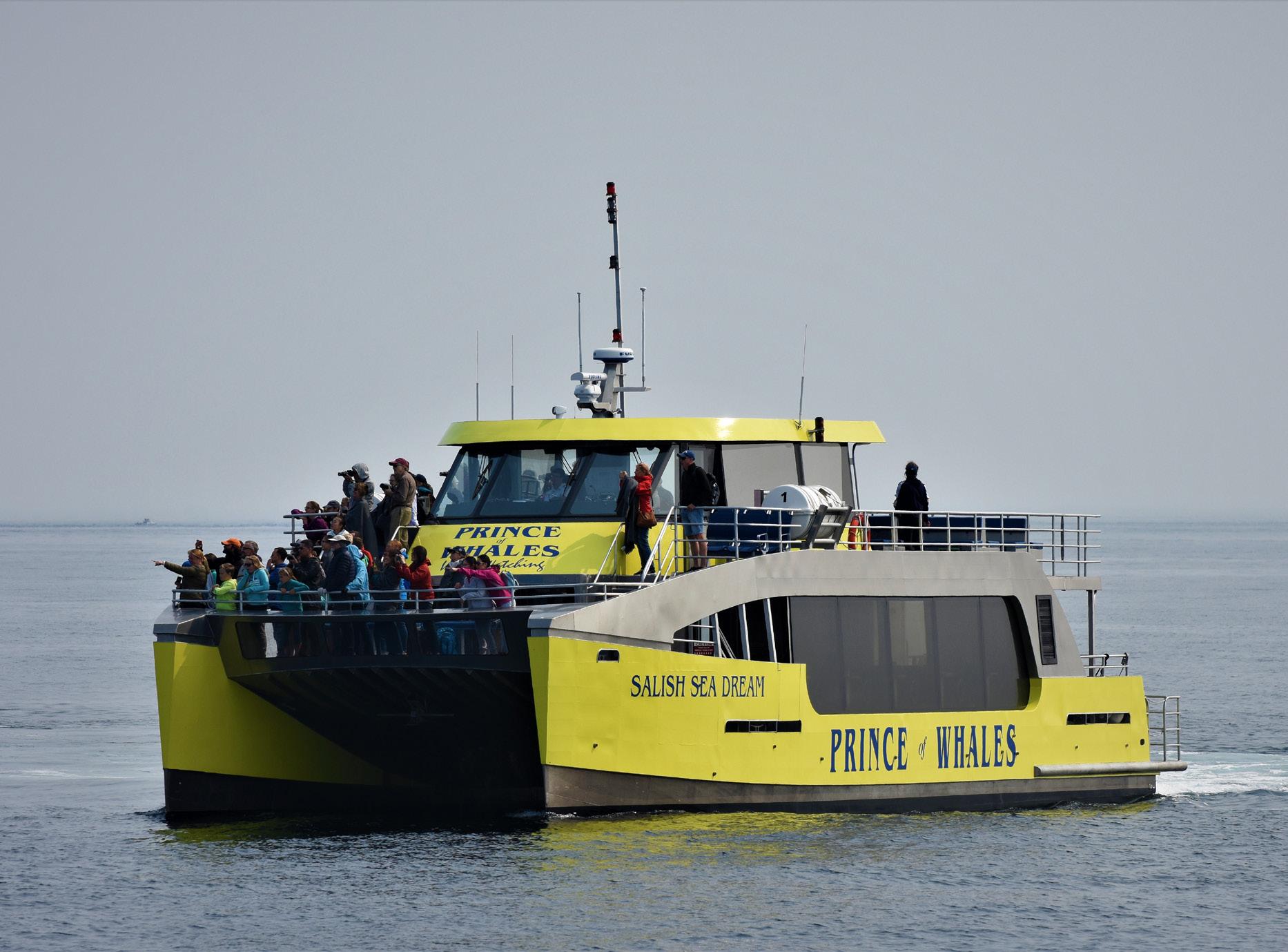
“It’s really neat to be able to individually identify [these transient whales] and watch them as they grow up and go through all the stages,” says Pidcock.
Last August, Pidcock had spent a day out on the water where he and his team saw about 25 transients. After finishing up their last tour of the day at sunset, they returned to the water to continue watching the group of transient whales, even after the sun had set and it was nearly impossible to see in the darkness.
“It was mostly auditory, but we were still able to track them,” says Pidcock. “And then the bioluminescence came out and we were actually able to watch them swim and watch them travel.”
Although he has had many incredible encounters throughout the years, he says this one was special. “There’s stars above us and it looked like they were swimming through stars from all the bioluminescence. It was an amazing night.”
Capable of holding up to 95 guests onboard, this is one out of the 15 boats that Prince of Whales operates. Engineered in Canada, it was made specifically for the purpose of whale watching in British Columbia.
HUMPBACK WHALES
You can spot humpback whales all year round in BC, although they tend to be most common in April to November. These majestic creatures have a sad history, as in the late 1800s to 1965 they were commercially hunted, and approximately 28,000 were captured in the North Pacific. It is not until recently that they started to come back to BC and are now no longer labeled as “threatened.”
According to Fuchs, these whales have become the most common ones to spot while whale watching. Over the
years, they have also become her favourite type of whale to observe.
“My favourite used to be the southern resident killer whale when I just started whale watching because that is all I had seen, but now with having humpback whales in larger numbers, I have switched my allegiance!” says Fuchs.
One of her favourite facts about humpback whales is that whale mothers communicate with their calves in a frequency out of range of transient orcas, who happen to be their main predators; this phenomenon is called a “whale whisper.”
WHEN ASKED WHAT her most unique experience was throughout her whale watching years, Fuchs shared the incredible story of two passengers she had in her second year of whale watching. They were with a small group aboard the vessel that day, so Fuchs got
36 • BC MAG
Destination Vancouver/Prince of Whales Whale Watching
the chance to talk to each passenger a little more in depth, including two women who were sitting at the back of the boat. “I learned they had been diagnosed with terminal cancer, both of them, and were given one year to live,” Fuchs adds, “their lifelong dream was to see orcas.”
Determined to see whales, they looked extra hard, but unfortunately there seemed to be none in sight that day. At last, as the day was coming to an end, they heard on the radio that a nearby boat had spotted humpback whales. As they arrived on the site, they were stuck behind six other vessels and had no choice but to wait their turn. It was getting late and they were running out of time, so the captain decided to move the boat about 100 metres away from the rest of the lot to see what would happen. They waited there for a few minutes until suddenly, they heard a loud exhale at the back of the boat, where the two women were sitting. “The humpback lifted his head up and looked right into their eyes, check-
ing them out and almost touching the boat,” says Fuchs. “Then they dove right underneath the boat, only to surface on the other side at the back. This went on for about 25 minutes, with some of the passengers being moved to tears.”
Aside from orcas and humpback whales, there are a few other types of whales you might get lucky to see on your outing. For both Wilma and Simon, the rarest species of whale they had encountered while watching was the fin whale.
RULES TO FOLLOW
Although seeing whales up-close is thrilling, whale watching tour operators must follow the Marine Mammal Regulations under the Government of Canada’s Fisheries Act as well as the rules of the Pacific Whale Watch AsMinke whales frequent the Pacific Northwest during spring and fall.
sociation (PWWA) that have outlined clear guidelines on maintaining safe distances. For most whales in the Salish Sea, including humpback whales, gray whales and minke whales, the viewing distance is 100 metres. The viewing distance in BC for whales who are resting or with calves is 200 metres, and the distance for all killer whales in inland waters in BC is 400 metres.
Some strict “don’ts” when whale watching include positioning your vessel between the food source and whales and flying drones around whales. More on guidelines can be found at pacificwhalewatchassociation.com/regulations and the Fisheries and Oceans Canada website.
Whale watching offers the opportunity to gain insight on these magical creatures that roam our oceans. Not only will you get the opportunity to see whales in person (likely), you will also get to learn a whole lot on whales and other marine mammals from passionate whale watching experts like Wilma and Simon (guaranteed).
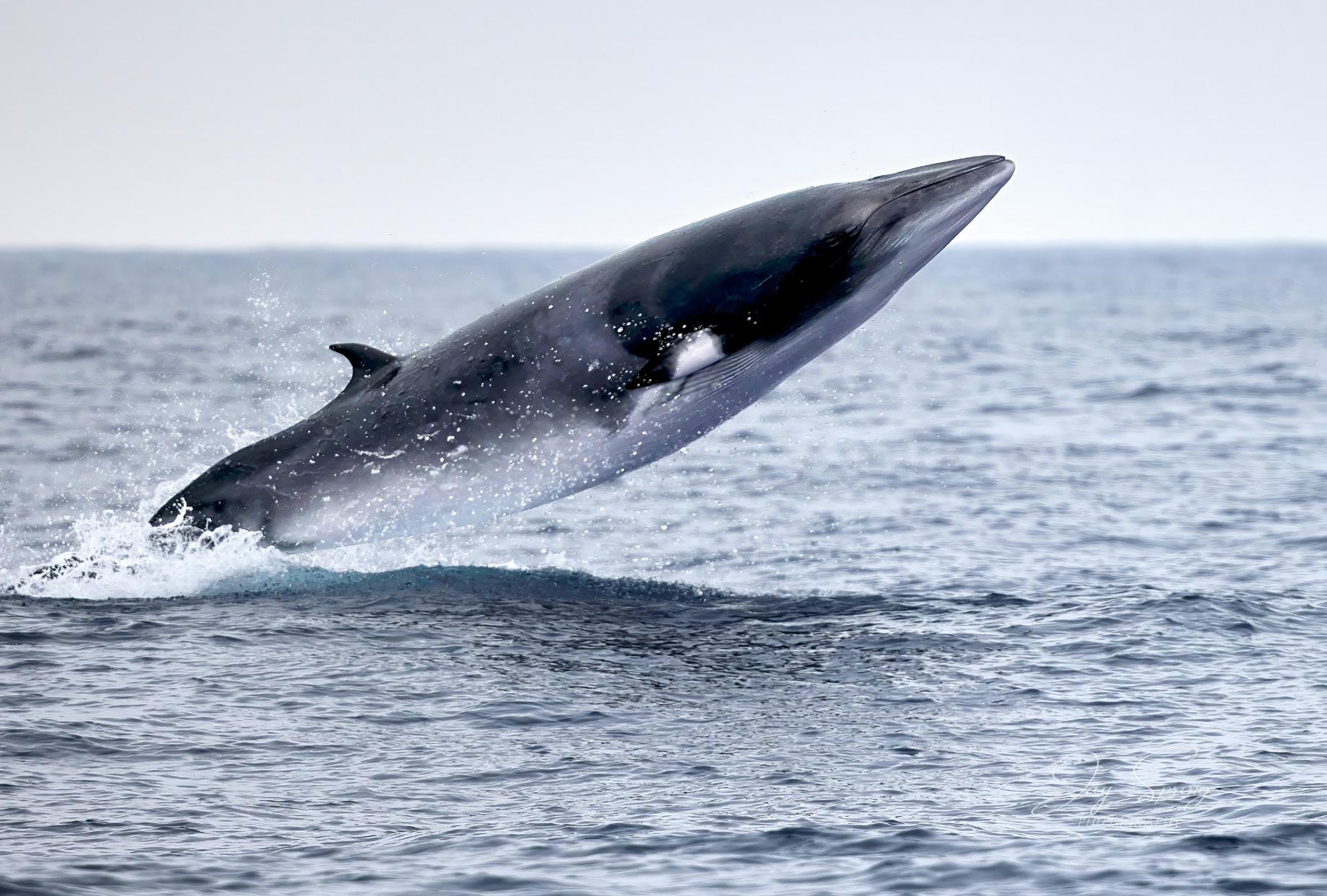
BC MAG • 37
Abode Stock/Jay S
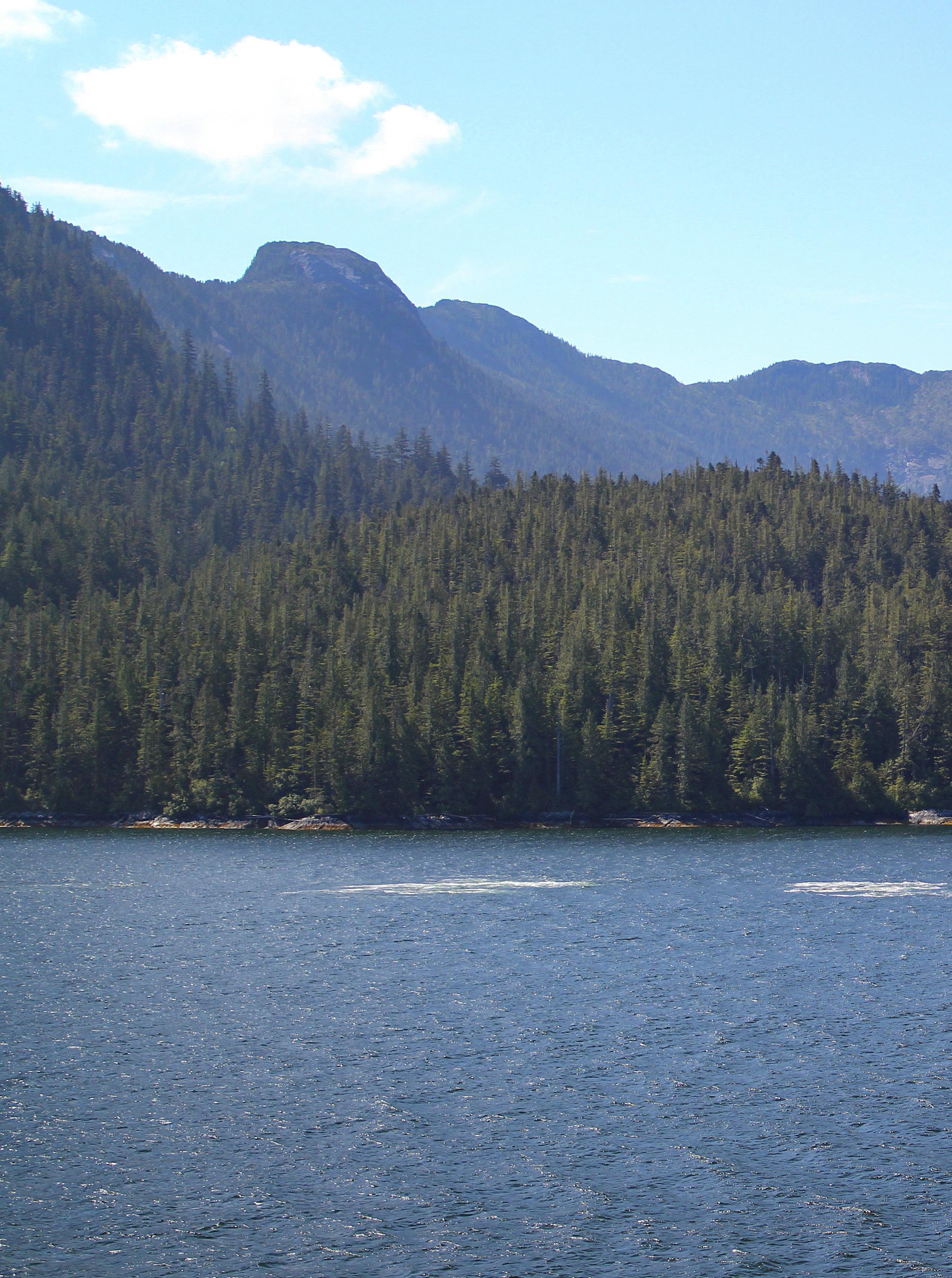
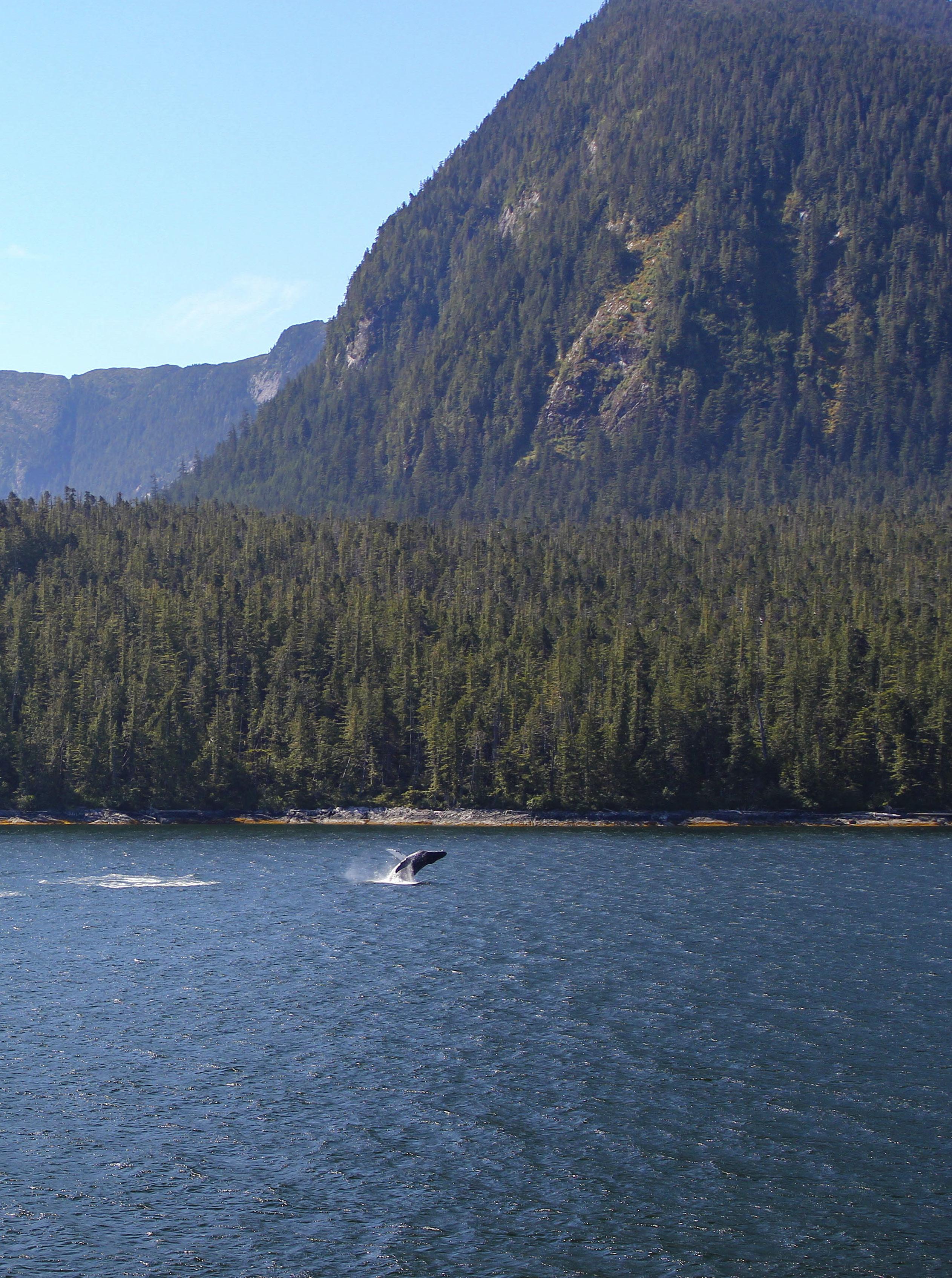
grahof_photo
Knobs on top of head and lower jaw.
WHAT TO LOOK FOR
Humpback Whale
Adult length: 11.5-15m • Adult weight: 25-30 tonnes
Low, often stubby dorsal fin with broad base and “hump”: can be highly variable shape. Dark grey to blue-black colouration on upper side.
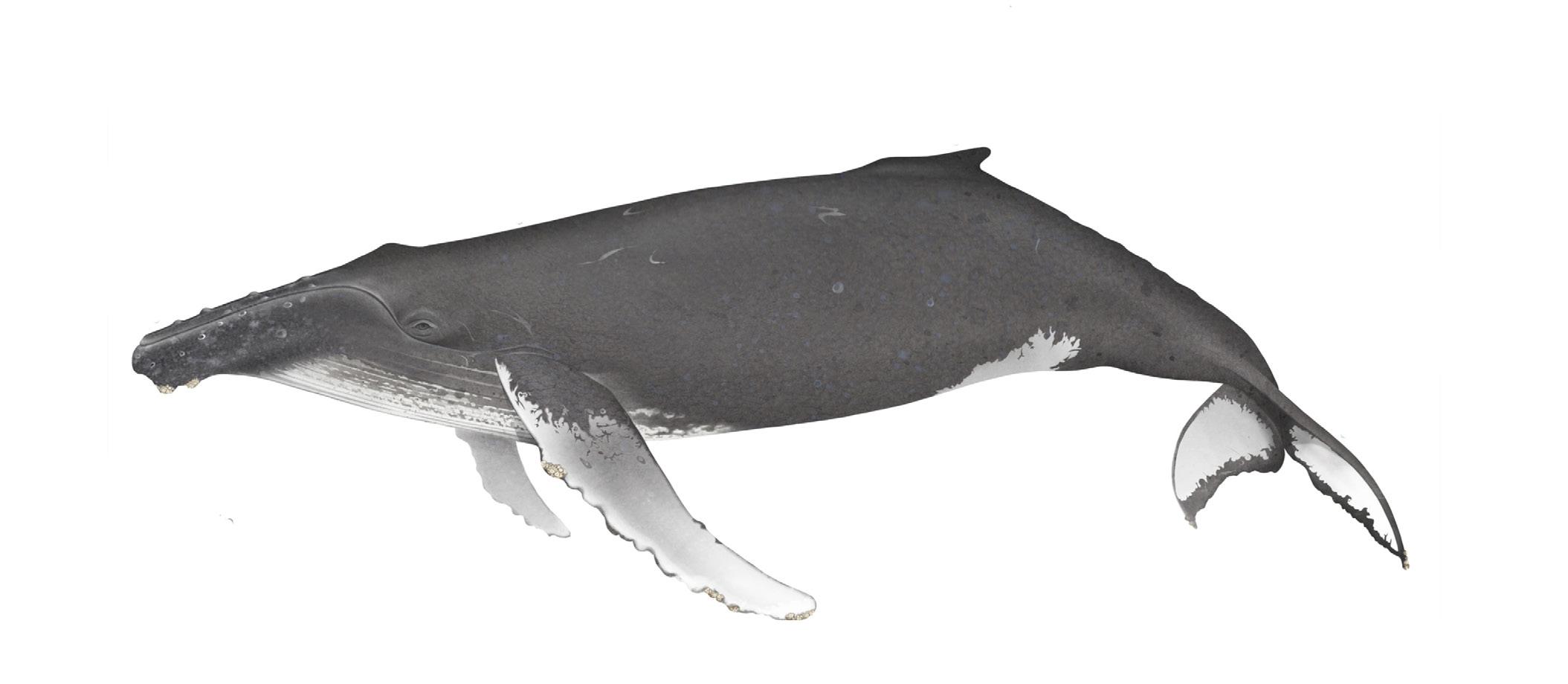
Tail flukes are broad and usually serrated on the trailing edges. Dark on top and can vary from black to white underneath.
Rounded protrusion at tip of lower jaw.
Long flippers - up to 1/3 of body length with knobs on leading edges. White underneath, but can be black, white or mottled on top varying by population or individual.

Although females are on average larger than males, the only way to distinguish the sexes is by the presence of a grapefruit-sized lobe at the rear of the genital slit or presence of a calf (female) or the detection of singing (male).
Gray Whale
Adult length: 11-15 m• Adult weight: up to 45 tonnes
Blowholes located in a shallow dip on the top of the head.
Narrow, triangular head that slopes and arches between the blowhole and the snout. Patches of whale lice and barnacles are usually present on the head. Broad paddle-shaped flippers.
Dorsal fin is only a low hump.
Visible ‘knuckles’ or fleshy knobs between the dorsal hump and the tail flukes (varies between individuals).

Dark grey skin is covered with light coloured blotches and white, yellow, or orange patches of whale lice and barnacles.
Flukes are mottled with ragged edges, and pointed tips, and oftern bear scars from killer whale attacks.
40 • BC MAG
Info courtesy IWC (International Whaling Commission)
Minke whale
Adult length: up to 8.8m (female) • Adult weight: up to 9 tonnes (female)
Curved and pointed dorsal fin located roughly 2/3 of the way between the head and tail.
Flattened head.
Sharply pointed snout.

Tail flukes are black on top and pale underneath.

Orca
Adult length: up to 9.8m (male)/8.5m (female) • Adult weight: up to 10 tonnes (male)
Adult males have an unmistakably tall (up to 2m) triangular dorsal fin. Females and juveniles have smaller sometimes curved dorsal fins. Transient orcas often have a more sharply pointed tip to their dorsal fin.
WHALE WATCHING COMPANIES
Prince of Whales
Vancouver /Victoria/ Telegraph Cove
Toll Free: 1-888-383-4884
Local: 1-250-383-4884 princeofwhales.com
Wild Whales
Granville Island, Vancouver, 604-699-2011 whalesvancouver.com
Steveston Seabreeze Adventure
Vancouver (Richmond) 604-272-7200 seabreezeadventures.ca
Campbell River Whale
Watching and Adventure Tours
Campbell River
Toll Free: 1-877-909-2667/
Local: 1-250- 287- 2667
Ocean Ecoventures
Vancouver Island (Cowichan Bay & Parksville)
Toll Free: 1-866-748-5333
Local: 1-250-748-3800 oceanecoventures.com
Vancouver Island Whale Watch Vancouver Island (Nanaimo)
1- 250-667-5177 vancouverislandwhalewatch.com
Pale grey saddle patch, variable between individuals and populations.
Tail flukes are black on top and very pale to white underneath.


Eagle Wing Tours
Vancouver Island (Victoria)
Toll Free: 1-800-708-9488/
Local: 1-250-384-8008 eaglewingtours.com
Orca Spirit Adventures
Vancouver Island (Victoria)
Toll Free: 1-888-672-6722/
Local: 1-250-383-8411
Jamie’s Whaling Station
Tofino
Toll Free: 1-800-667-9913
Local: 250-725-3919 jamies.com/whale-watching/ tofino-whale-watching/
Prince Rupert’s Adventure Tours
Prince Rupert
Toll Free: 1-800-201-8377
Local: 1-250- 624-8199 adventuretours.ca/tours/ whale-watching-tour/
BC MAG • 41
50-70 throat grooves.
Small, slender, pointed flippers with distinctive white band.
White, pale grey or pale brown underside.
White chest.
Large, wide paddle-shaped flippers – up to 1/5 of body length in adult males.
White patch extending from belly up the sides.
Oval shaped white patch behind each eye (variable).
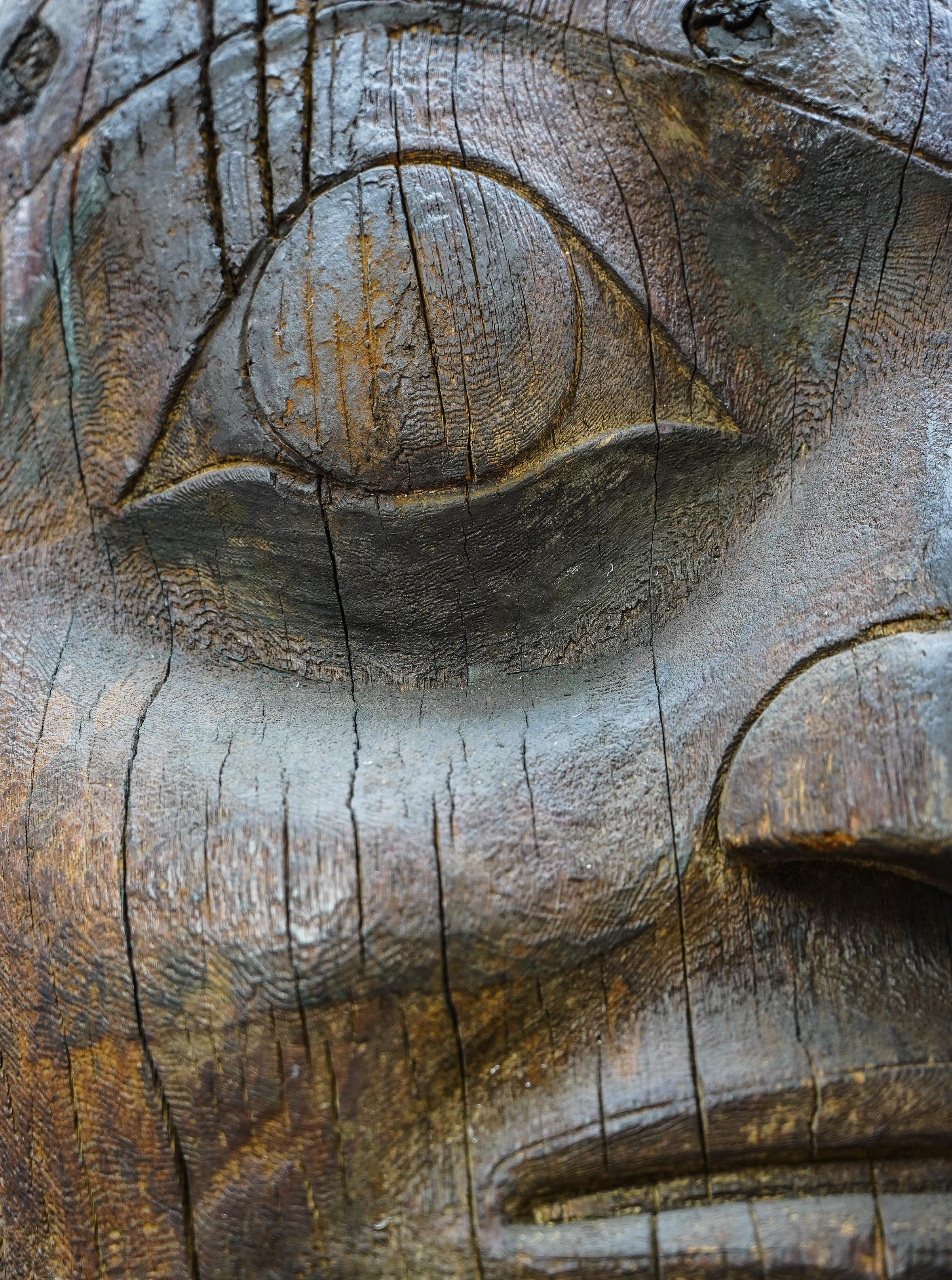
THE LONG JOURNEY HOME
AFTER BEING STOLEN AND SENT TO A SCOTTISH MUSEUM IN 1929, THE NI’ISJOOHL MEMORIAL POLE MAKES ITS LONG WAY HOME TO THE NASS VALLEY
BY DIANE SELKIRK
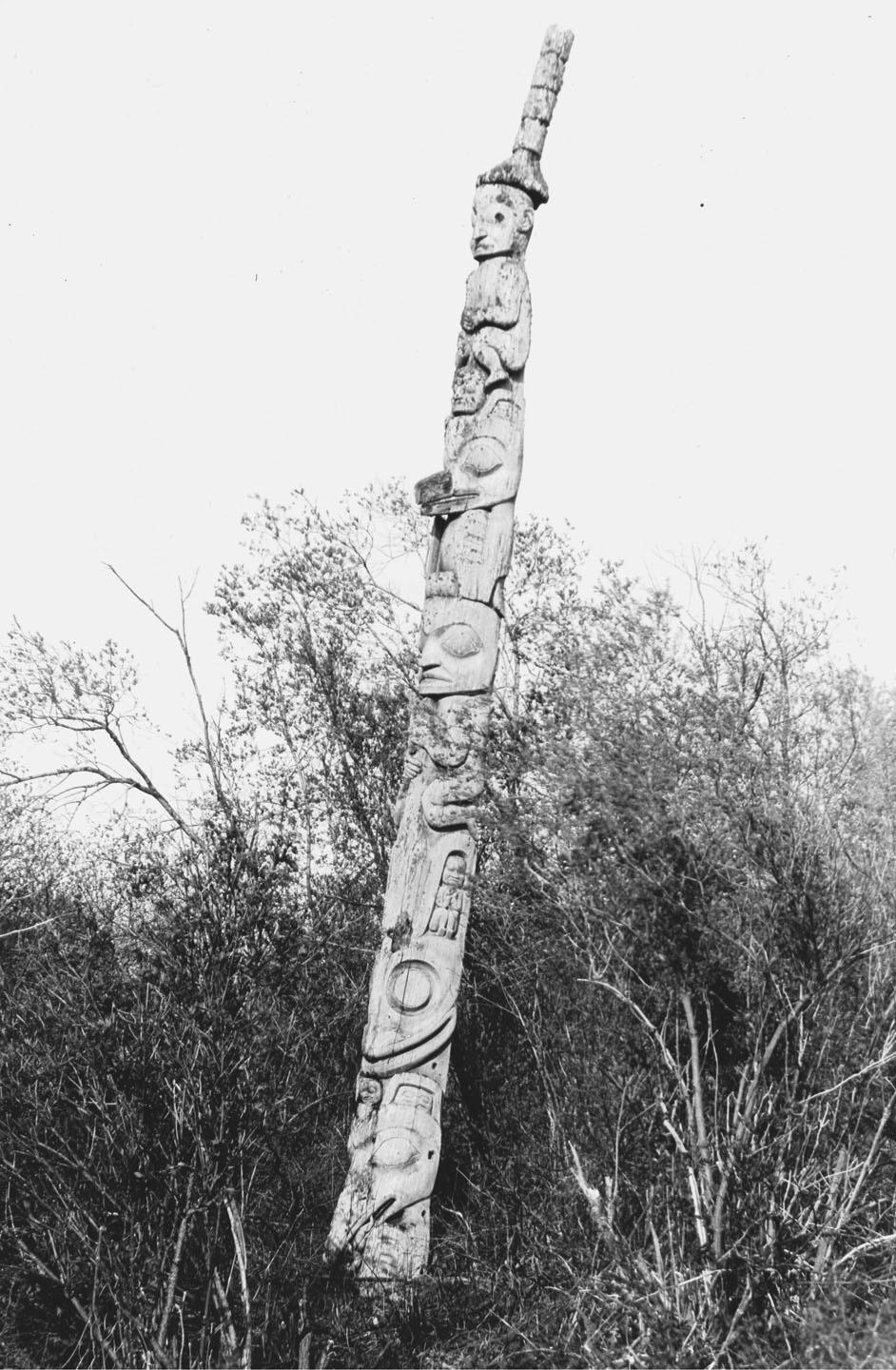
BC MAG • 43
Left: Diane Selkirk
The Nisga’a delegation went to Scotland to request the return the Ni’isjoohl Memorial Pole.
SStanding at the lookout at Ksi Wil Ksi-Baxhl Mihl or Crater Creek, it’s hard not to feel awe as I gaze over a landscape of lava fields framed by the snow-capped Hazelton Mountains and Kitimat Range. This vast expanse of volcanic rock is the result of Canada’s most recent volcanic activity. Around 1690 CE, the Tseax Cone erupted, spilling hot lava into the Tseax River and forming a dam that created Lava Lake. Then, the lava flowed northward toward the Nass River, covering the valley floor, destroying at least two Indigenous villages and claiming an estimated 2,000 lives through fires and what Nisga’a Elders called “poison smoke.”
Stretching 32 kilometres across the valley, I’m surprised by the diversity in the volcanic plains. In one area, there are imposing heaps of metres-high rubble, while in another, the basalt flow takes on the smooth appearance of a paved parking lot. At Dihlaa N ’ iiBax-hl Aks Sbayt-G-an, the Drowned Forest, it forms deep potholes that fill with clear, aquamarine river water. At
Wil Luu-g-alksi-mihl G-an, the Tree Cast, I notice that much of the volcanic rock is covered in vibrant gold lichen and mosses. In some places, soil has even formed and small trees have sprouted—almost as though the land is healing itself.
Continuing along Nisga’a Highway 113 toward the seaside village of Gingolx, the radio station fades out just as the lava field ends and the dense green forest begins. Searching for a new station, I find CNFR, Canada’s First Nation’s Radio. Driving along the braided tributaries of the Nass River, I listen as the broadcaster recounts how almost 100 years ago, the Ni’isjoohl Memorial Pole was stolen from the village of Ank’idaa and floated away down the Nass. Reaching the bridge, I slow my car to look down at the churning waters below.
While the Nass Valley is stunning, my focus this visit is not just the scenery. A little over a year ago, I visited the carving shed in the village of Laxg alts’ap and met master carver Calvin McNeil. He was working on a replica of the Eagle-Halibut Pole of Laay, a pole currently housed in the Museum of Anthropology in Vancouver. As McNeil demonstrated how he recreates the crests using historic and modern photographs, he explained the original pole is considered an ancestor. It was one of several brought to life in the mid-1800s by legendary Nisga’a carver Oyay, which later went on to be

stolen for museums around the world. But, McNeil said, a Nisga’a delegation was about to go to Scotland to request the return of one of his ancestors, the Ni’isjoohl Memorial Pole.
TO UNDERSTAND HOW the Ni’isjoohl Memorial Pole ended up in Scotland, I’m told you need to start with Lisims, the Nass River. Flowing from its headwaters in the glaciers of the Skeena Mountains, the Nass meanders southwesterly for 380 kilometres before draining into Portland Inlet and the Pacific Ocean. Surrounded by
44 • BC MAG
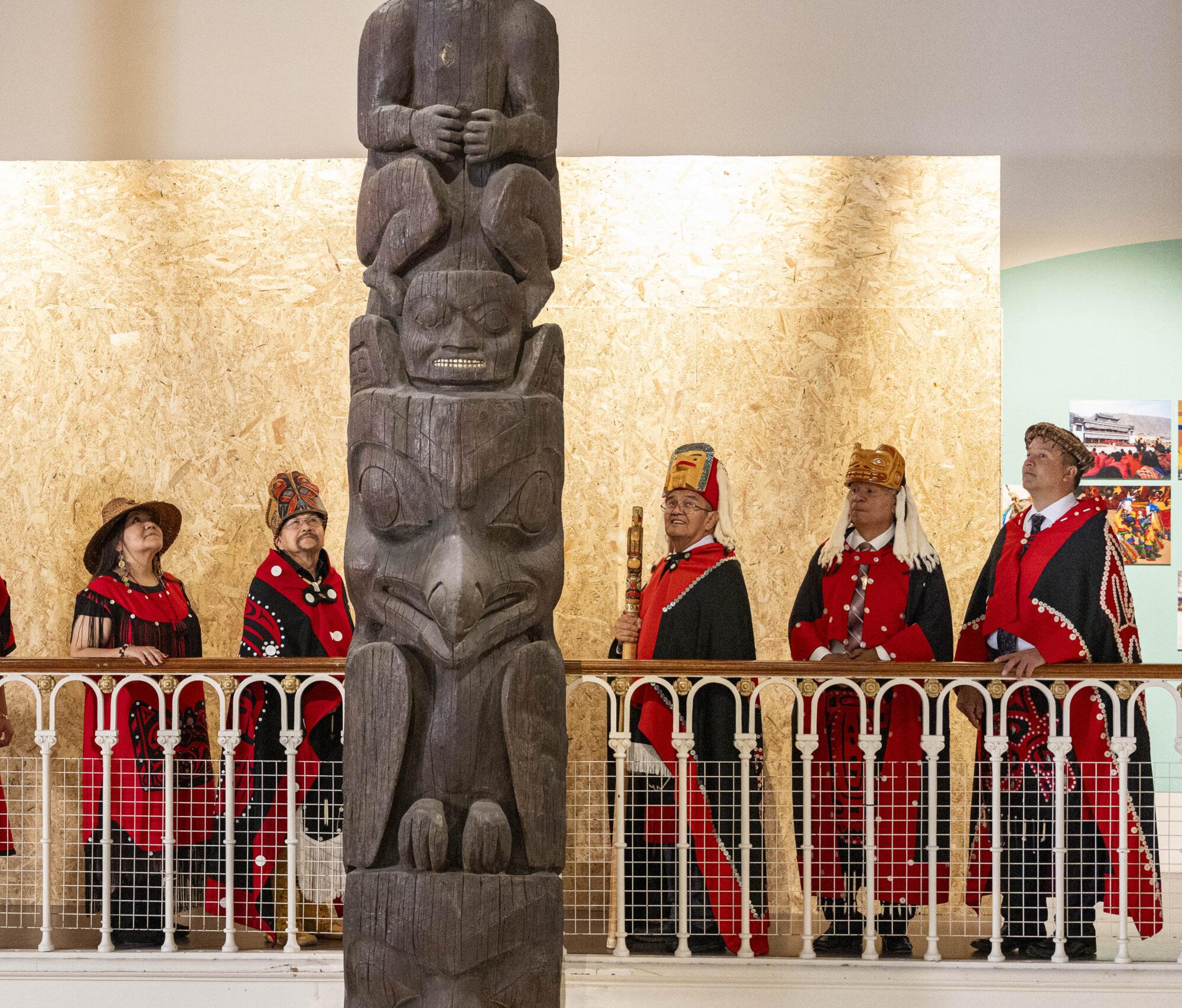
glacier-capped mountains and flanked by meadows thick with soapberry, salmonberry and kinnikinnick as well as forests of hemlock, spruce and redcedar—the Creator placed the Nisga’a People in villages along the river. Guided by the belief that everything is interdependent, the people followed a sophisticated code of laws and customs to maintain balance in the community and ecosystem.
Toward the end of this era of balance, Oyay emerged as a master carver renowned for crafting pts’aan, totem or crest poles, which intricately detailed
a family’s history and their ties to the land and other families. Around 1860, Joanna Moody, a 25-year-old matriarch in the village of Ank’idaa, commissioned Oyay and his assistant Gwanes to carve a pole in memory of Ts’wawit, a warrior in line to be chief until he fell in battle. Utilizing a redcedar tree that had been girdled and dried for years in the forest, the carvers dedicated almost a year to breathing life into the pole. Then, with great ceremony, the pole was raised with an elaborate feast (often referred to as a potlatch).
Standing, the pole took its place
alongside Crane and Grizzly, Bear Mother, the Shaking Pole of Kw’axsuu, and a dozen others that collectively held the community’s accumulated knowledge. The Ni’isjoohl pole was intended to ensure the transmission of knowledge and protocol to future generations, but rapid change had already arrived in the Nass Valley. Captain George Vancouver became the first European to record encountering the Nisga’a while charting the Pacific Coast from 1791-95. Then the fur trade got underway. As new settlers were drawn to the region, diseases
BC MAG • 45
Duncan McGlynn


followed. No one is certain how many Nisga’a died over the decades, but by 1889 many of the large, traditional villages had emptied, and the Northwest Coast Indian Agency census counted just 805 survivors.
WIDESPREAD DEATH LED to the loss of familial lines, cultural leaders and traditional stories. Then, beginning in 1882, the nation’s school-aged children were taken to St. Michael’s in Alert Bay or St. George’s in Lytton. Not long after this, the Potlatch Ban was enacted, outlawing the practices that wove the Nisga’a together. Meanwhile, missionaries pushed the Nisga’a to convert to Christianity, warning their attachment to ‘pagan’ beliefs could only bring tragedy.
Under cultural assault, Indigenous people faced a significant threat to their heritage. Anthropologists of the time believed that Indigenous cultures would vanish. In the period just before and after the First World War, a move-
ment now known as salvage archaeology began. Ethnographic expeditions set out across Canada with the goal of collecting and preserving whatever material culture remained before it was too late.
In 1927, Marius Barbeau, an anthropologist with the National Museum of Canada, renowned for gathering and recording narratives from Quebecoise and Tsimshian cultures, set out for the Nass. His field notes from that time detail an encounter with a Nisga’a chief from the village of Git’iks. Barbeau, aiming to acquire an impressive pole now known as the pole of Sag aw'een, attempted to purchase it from Chief Sag aw'een, promising to display it in the Royal Ontario Museum. Rejecting the monetary offer, the chief defiantly suggested a trade. “Give me the tombstone of Governor James Douglas,” he said, “I will give you the totem of my grand-uncles.”
Barbeau left the Nass without poles, but the following year, artist Em-
ily Carr made a trip to Laxg alts’ap and Ank’idaa to paint. Anticipating the impending loss, Carr wrote that the poles she’d painted would soon be “carried away to museums” where “they would be labelled as exhibits, dumb before the crowds who gaped…” She feared the poles’ value would be misunderstood, “because the white man did not understand their language.” As predicted, Barbeau returned in 1929. Using photos he took in 1927, he had pre-sold Nisga’a poles to museums around the world and, it seems, devised a new approach. Offering money to an extended relative of Chief Sag aw'een, he secured ‘permission’ to take the pole. Then he continued to Ank’idaa.
“It was during that period that people were going to houses, taking stuff and selling it to whoever comes around. That is when those poles at the villages of Ank’idaa and Git’iks were taken down,” Sim’oogit Duuk (Chief William Moore) recounted in an oral history. “They cut those poles in
46 • BC MAG
For over 90 years the Ni’isjoohl Memorial Pole was on display at the National Museum of Scotland.
The totem pole packaged and ready to be returned to its home.
Top Right: Olga Tjukova
Ank’idaa. They put them in a flat raft.” Because it was late summer, Ank’idaa was mostly empty with everyone away hunting, fishing and food harvesting. But a few kilometres downriver, in the new missionary village of Laxgalt’sap, the Nisga’a watched helplessly as the poles were floated away. “People were lined up along the beach,” said Moore, “It was a solemn time for them because in effect they were saying goodbye to our culture.”
A few months later, Barbeau’s field notes stated, “Nearly all the Nass River poles by now have been removed by the author for various institutions in Canada, the United States, Great Britain and France.”
WHEN I ARRIVE in Gingolx, it’s low tide. Standing on the beach looking back at the village, I marvel at how the Nisga’a resisted being crushed by colonization and never stopped fighting for their rights. On May 11, 2000, after decades of negotiation, the Nisga’a
and the governments of Canada and BC signed the province’s first modern treaty, the Nisga’a Final Agreement, codifying the Nisga’a’s right to selfgovernance, ownership of 1992 squarekilometres of hereditary land, access to traditional foods and the shared management of Nisga’a Memorial Lava Bed Provincial Park.
The treaty also paved the way for the return of over 300 stolen belongings housed in Canadian museums—an unprecedented act of repatriation. But there was a catch: the belongings had to be conserved in a Class A museum, a gorgeous structure that would eventually cost the Nisga’a roughly $14 million.
The next morning, I’m up early and arrive at Wilp-Adokshl Nisga’a, the Nisga’a Museum in Laxg alts’ap, just as the crowd swells. In August 2022, the Nisga’a delegation, spearheaded by Sigidimnak’ Nox Ts’aawit (Dr. Amy Parent), Canada Research Chair in Indigenous Education and Governance
at Simon Fraser University, journeyed to the National Museum of Scotland (NMS) to secure the return of the Ni’isjoohl Memorial Pole.
Shortly after the trip, Parent shared how the Nisga’a delegation and NMS staff clashed over their differing worldview. “First it was around our ceremonies to feed the pole [because] they had a ‘no food in the museum’ rule,” says Parent. (The two groups compromised by using vacuum-packed food.) “Then they told us about their very complicated, one-year old repatriation policy. It was irrelevant to us; we were there in accordance with Nisga’a laws and protocols, which are thousands of years old.”
Despite the challenges, the Nisga’a established the pole’s provenance through oral history, photographs and colonial records, proving Barbeau had no authority to sell it. Most importantly, members of the House of Ni’isjoohl were the ones making the request—in a surprise twist, Parent learned she’s
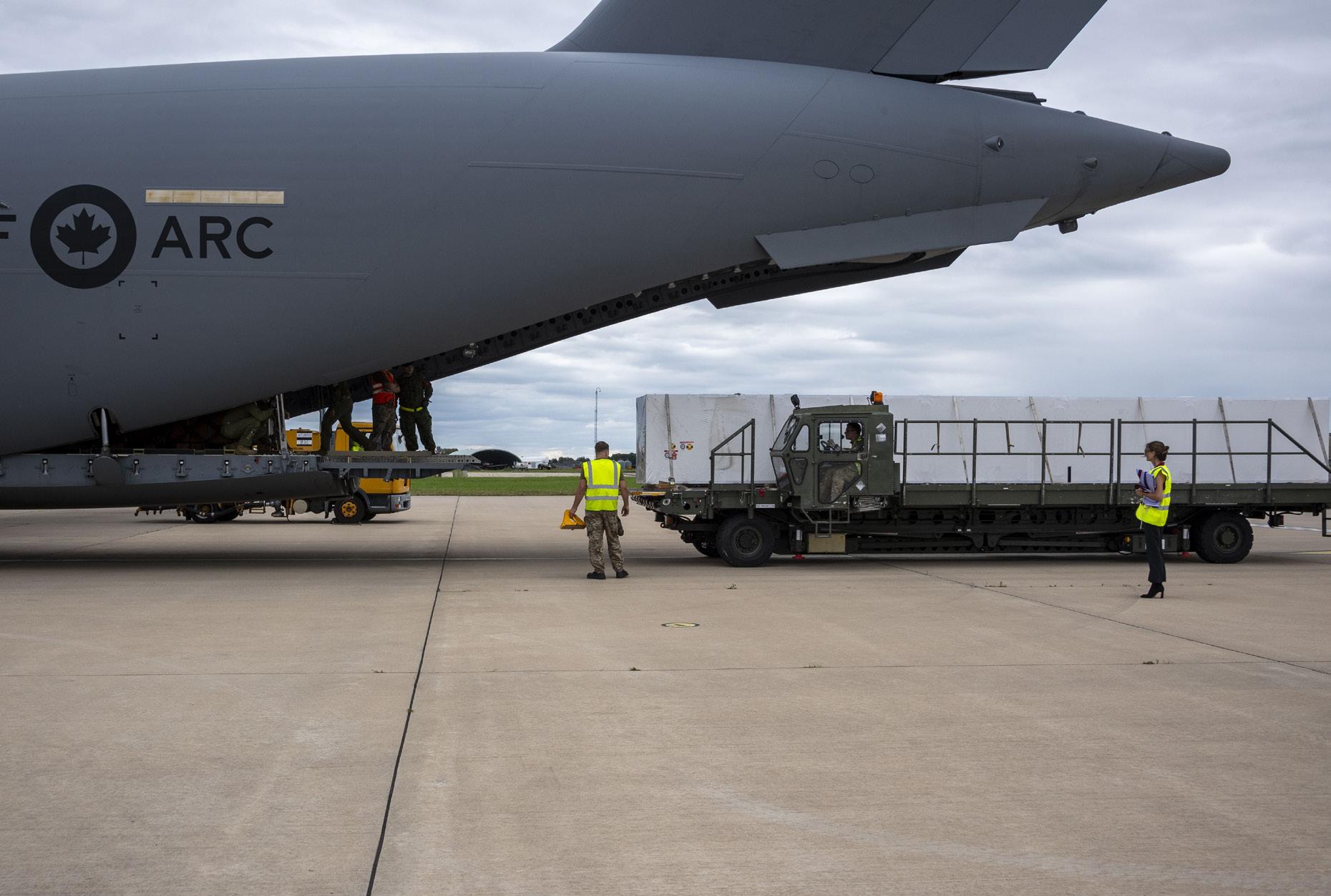
BC MAG • 47
The totem pole was flown from Scotland to Terrace aboard an RCAF C-130 Hercules.
Nicolas Alonso
Joanna Moody’s ancestral granddaughter. It took three months—but in December 2022, the Scottish Museum agreed to the first rematriation (a term recognizing the matrilineal nature of the Nisga’a) of a major Indigenous belonging from a European museum back to Canada.
Ten months later, the pole was carefully packed into a crate, moved from NMS, loaded into the belly of a Canadian military aircraft and flown to Canada. Now, on the ground in Terrace, a procession of cars accompanies it 150 kilometres along Nisga’a Highway 113, across the lava fields to the Nass River where the procession winds past the villages of Gitlaxt’aamiks, Gitwinksihlkw, and the hidden ruins of ancient Ank’idaa before arriving at the museum.
Despite heavy overcast skies, the sky seems to clear with each prayer from a Nisga’a elder, or song by the cultural dancers and drummers. By the time the long line of guests and dignitaries from across Canada and Scotland file past the pole, the mountains are visible and the sky is bright blue. I’m told this is because the pole wanted to feel the sun again, for the first time in a century. At the feast, 800 people fill their plates from platters of salmon,
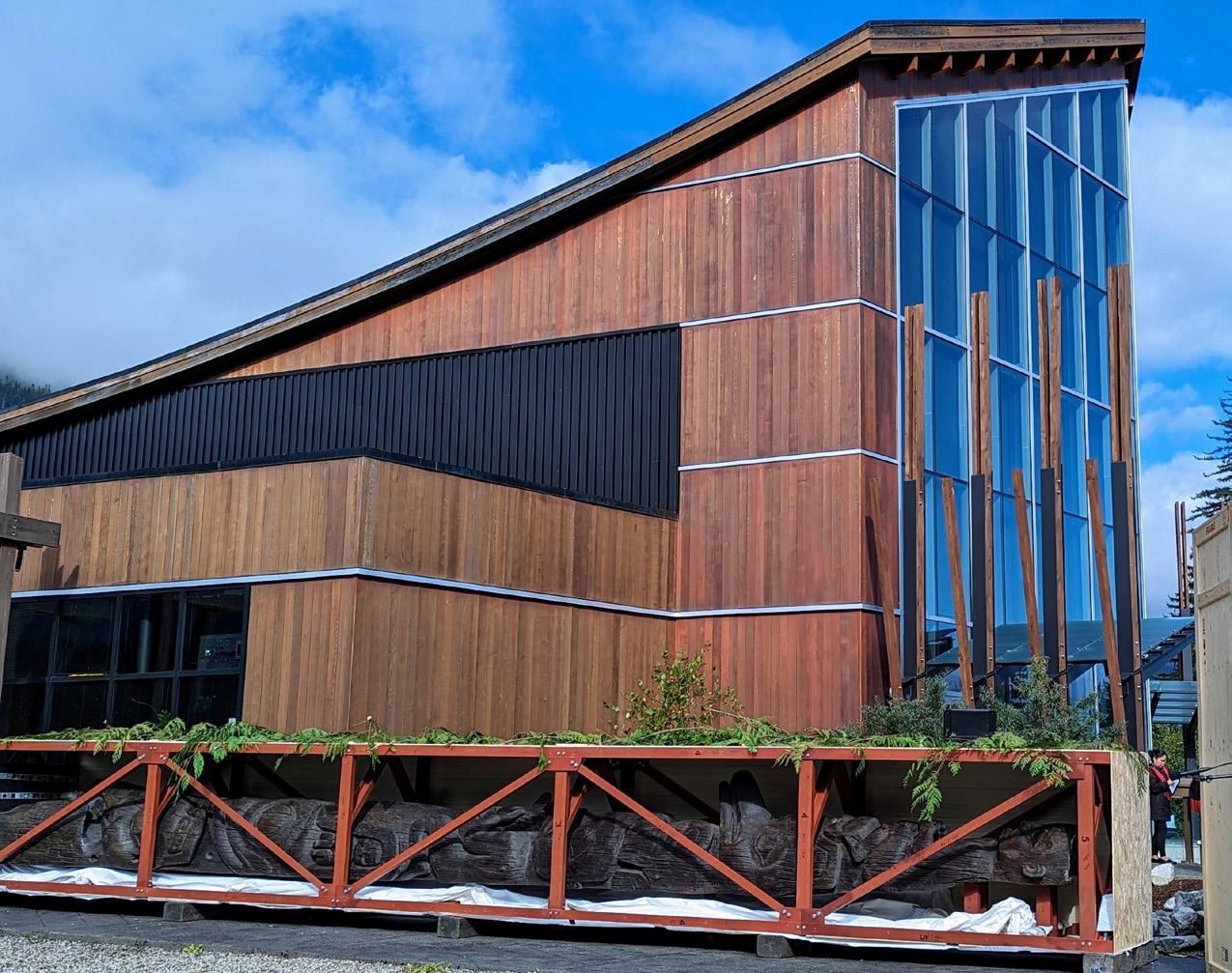
eulachon and crab.
In the quiet of next day, I meet Dr. Amy Parent at the pole. Placing her hand over the weathered fingers of one of the pole’s carved figures Parent
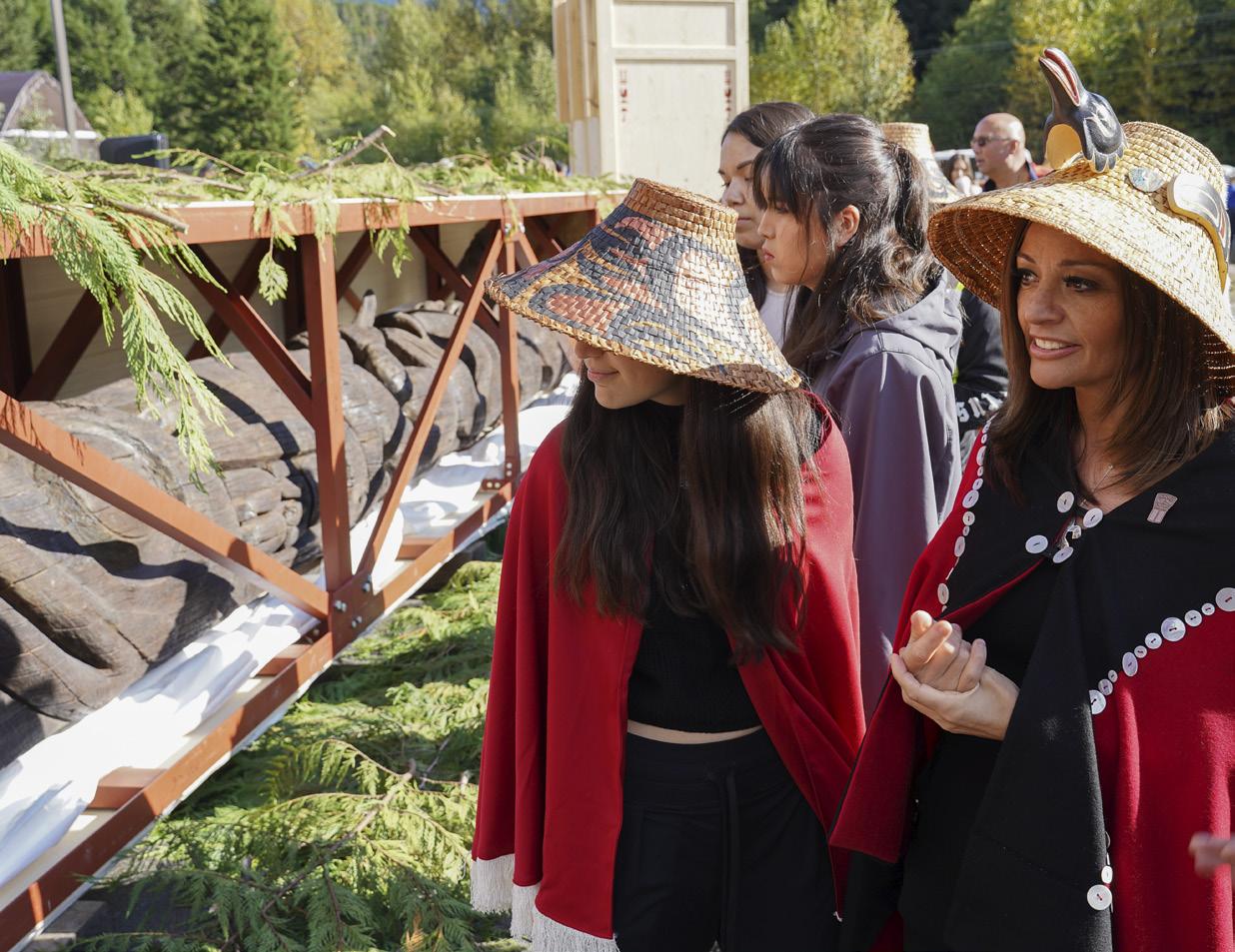
looks downward and murmurs a soft greeting. The effort to rematriate her ancestor had been exhausting for the academic, but she says it’s finally feeling real. In the days to come the pole will be raised in a place of honour inside the museum, but first it needs some care.
“Many of the crests represent particular names in our house,” Parent tells me as she looks the pole over. “The names are tied to what we call our ango’oskw, our house territory. And in each generation, these names are passed down so the teachings never die,” she explains. Containing a family’s origins and history, she says a pole is kind of a family album and political constitution rolled into one, “they tell us who we are.”
With the poles gone, Parent says some of this knowledge got lost—that’s why getting them back is so important. Walking along the pole’s length, she stops to touch the tailfin of a big-eyed, thick-lipped fish. Closing her eyes as though in concentration, or prayer, she recounts what she remembers. “I think we’re the only family to have the white bullhead,” she says, “I remember being told its story is powerful…”
48 • BC MAG
The procession of guests and family file past the House of Ni’isjoohl memorial pole during its homecoming to the Nisga’a museum in Laxgalts'ap, 94 years after its removal.
Diane Selkirk X2
The Nisga’a Museum opened in 2011 and houses a stunning array of exquisitely carved masks and headdresses and will house the Ni’isjoohl Memorial Pole.
Nass Valley
Nisga’a Memorial Lava Bed Park: Jointly managed by BC Parks and the Nisga’a Nation, the park offers visitors a chance to learn more about Nisga’a culture and the region’s natural history. There’s camping, picnic areas, boat launches and hiking trails.
VISITING THE NASS VALLEY
Nisga’a Lands Auto Tour: This 18-point, self-guided tour includes highlights in Lava Bed Park and in each of the Nation’s four villages.

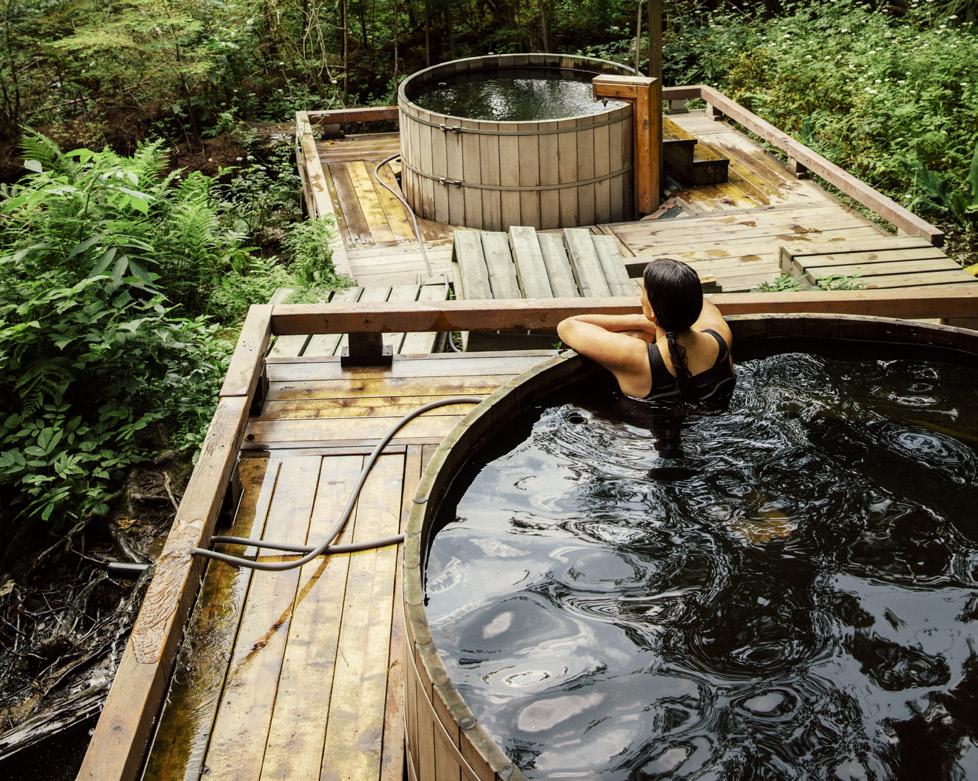
4
3
Hlgu Isgwit Hotsprings: A point on the auto-tour, visitors are welcome to use the hot springs that the Nisga’a have used for ceremonial, medicinal and spiritual purposes for untold generations.
Culture: Four distinct villages give insight into the rich culture of the Nisga’a people. You’ll find lodging, a restaurant or two, walking trails, the museum, carving sheds, smoke houses and heritage churches.

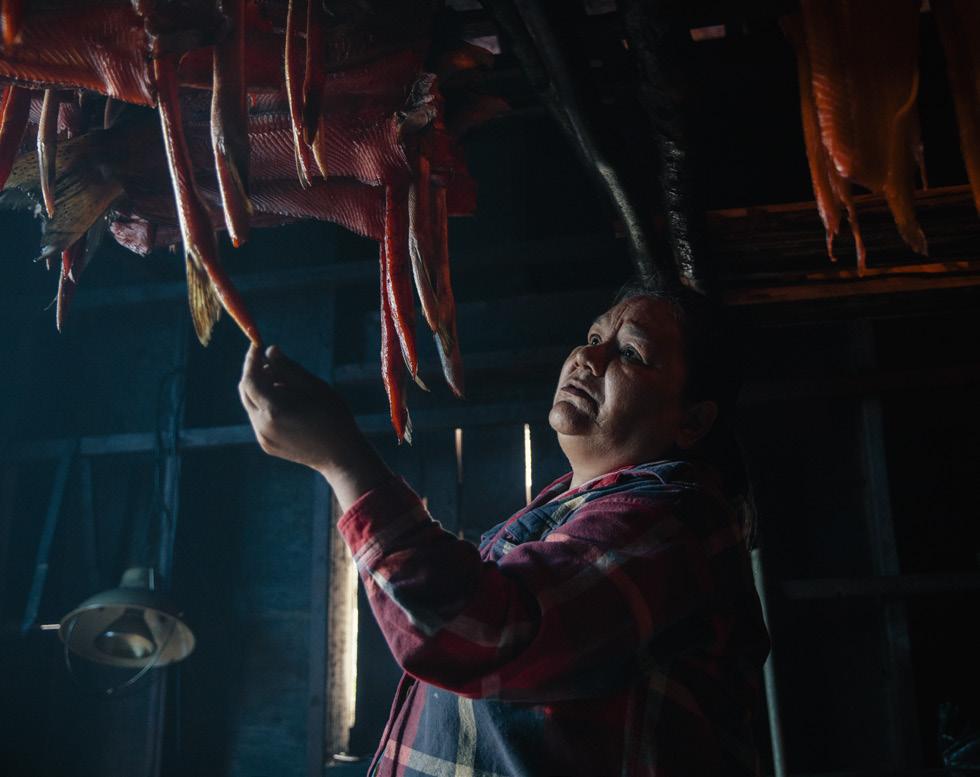
BC MAG • 49 1
2
1
3 4
2
1&2 - Diane Selkirk; 3&4 - Destination BC/Grant Harder
READY FOR TS’ZIL
TWO INDIGENOUS BC TEENS SKI A MOUNTAIN THAT DEFINES THEIR PEOPLE
 BY LESLIE ANTHONY
BLAKE JORGENSON
PHOTOS
BY LESLIE ANTHONY
BLAKE JORGENSON
PHOTOS
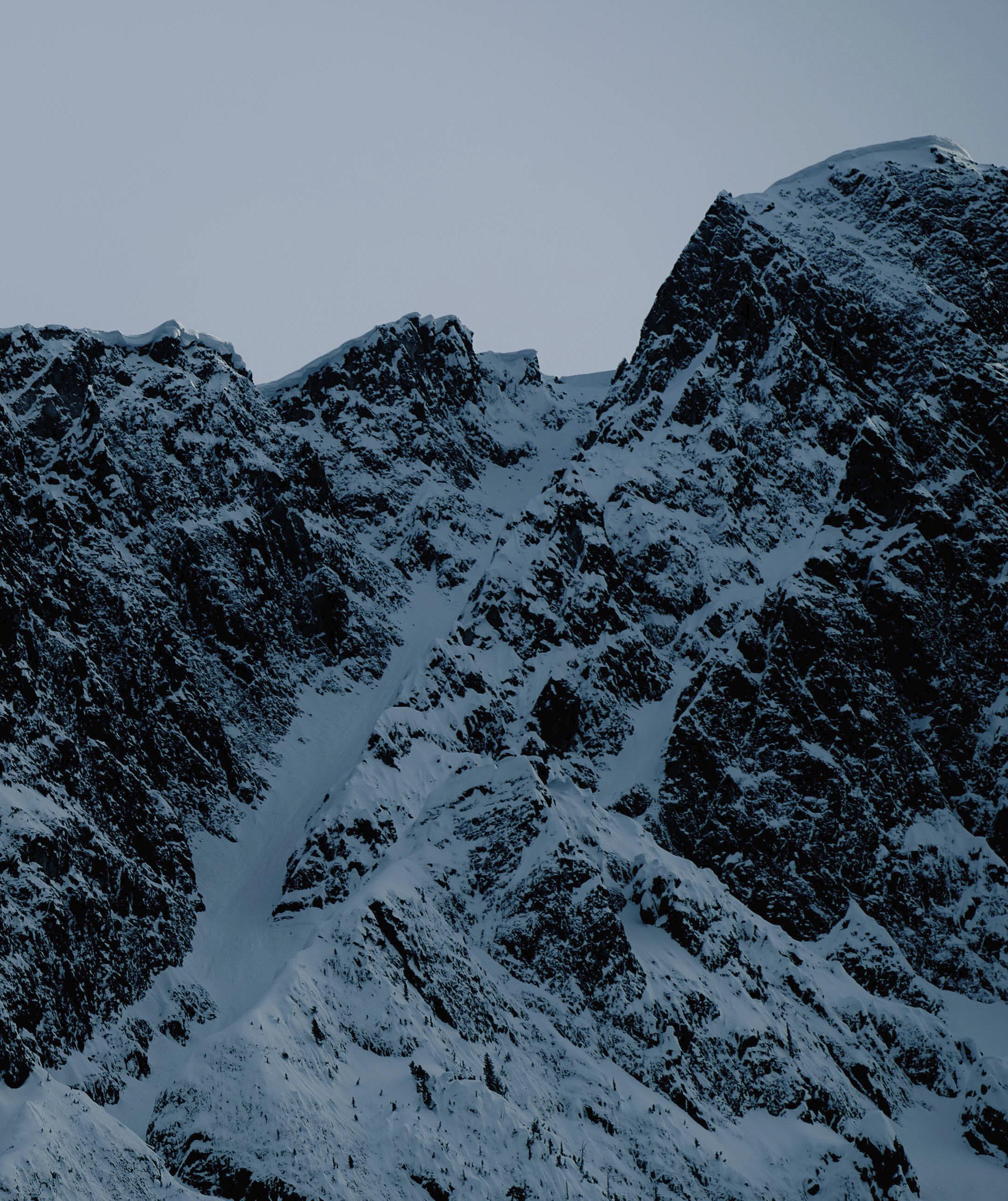
It had already been what anyone would call a long day. Behind them was the drop-off on the saddle, the high-five powder run down a sunny backside bowl, and the long ski-tour to the base of the summit ridge.
There was the sweaty bootpack up a steep wall of snow, and the discovery they’d missed the couloir and would have to rope up a rock-and-ice step for access. Finally, there was the short slide to the entrance and rappel into a chute that would have welcomed them with a foot of powder had it not been cleaned out by a bus-sized chunk of unlucky cornice fall. And now here they all stood, in heavy shadow, on a narrow platform hacked into the precipitous slope, a pair of tremulous teens, their coach/mentors, two guides and a cameraman or three, about to realize a landmark dream.
It was intimidatingly steep. It was a long way down and conditions were objectively bad. It only made sense that the person the boys looked up to most, professional snowboarder Sandy Ward—the woman who, months previous, helped spark the project then worked past injury so she could be here in this all-important moment—should show them the way. Side-slipping her snowboard into the throat, black rock soaring on either side,
she searched in frustration for a place to make a comfortable turn. The slope was a mess. “Holy hell,” she said to herself. The boys watched from above. Finally, a toe-side turn. Solid. Then heelside, but with the opposite outcome: the front edge caught in manky snow, pitching her forward to rocket down the chute.
TELL A SALTY ski mountaineer that its peak barely brushes 2,600 metres, and British Columbia’s Mt. Currie won’t raise many eyebrows—at least not by the Himalayan or Chamoniard standards of that fraternity. But mention how the north face drops 2,380 vertical metres nudging 45 degrees in places and their eyes might suitably widen.
In truth, Mt. Currie is one of the continent’s most imposing ski objectives, appropriately chaptered in 50 Classic Ski Descents of North America. Visitors to Pemberton’s organic farms, breweries and mountain-bike bonanza who find themselves scanning the serrated ridge and intersecting chutes that

52 • BC MAG
From left, Riki Pascal, Morgan Fleury, Sandy Ward and Talon Pascal.
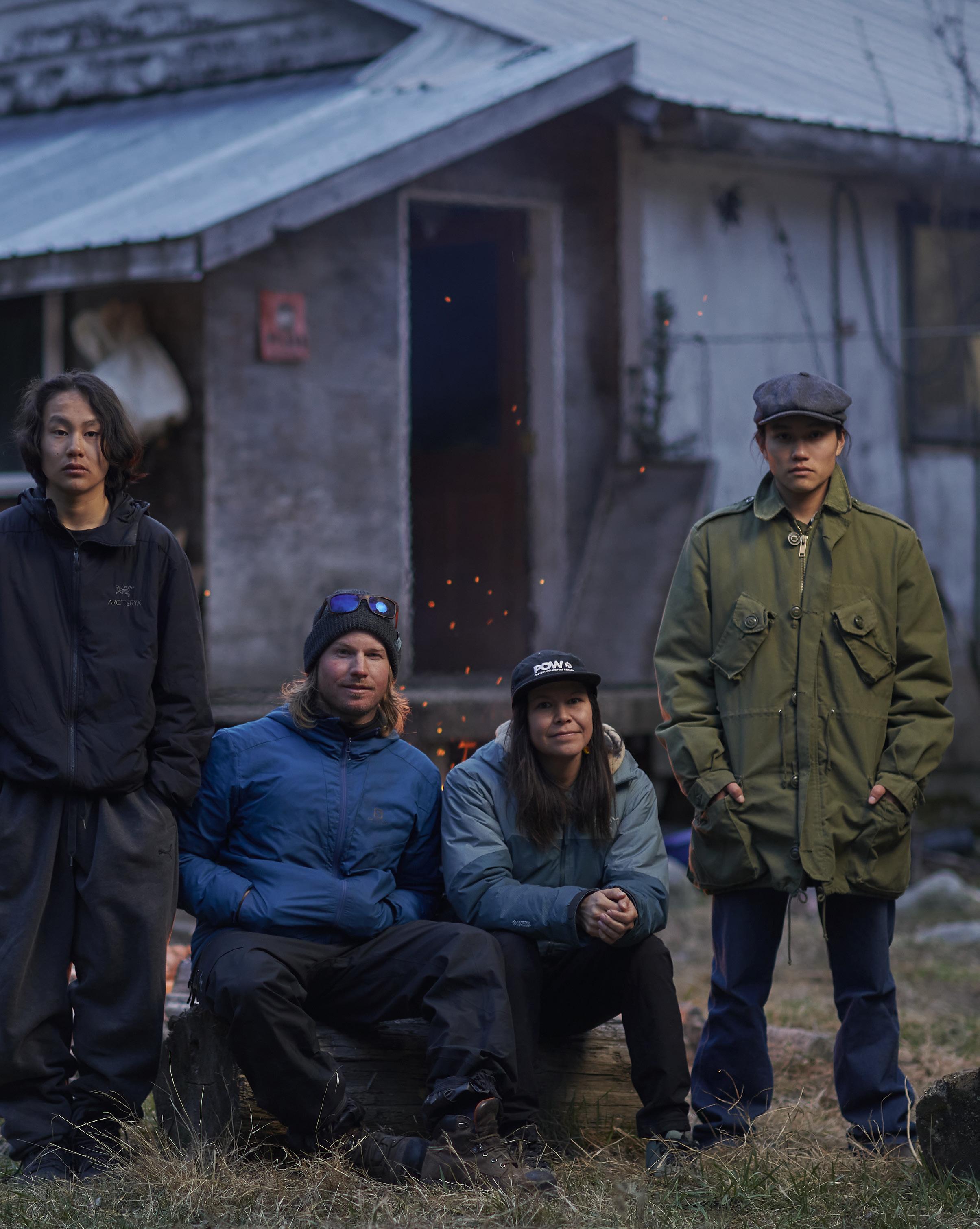
BC MAG • 53
consume the town’s southern horizon can’t help but imagine the panoply of myth, menace and imagination inspired in those who dwell beneath the ramparts. Foremost in that conception are people of the Lil’wat Nation who’ve occupied the valley since time immemorial and whose name for their sacred peak, Ts’zil—“slides on the mountain”—channels its spooky geological animation: the rumbling, high-speed avalanches of winter and spring’s boulder-pocked, wet-snow monstrosities; the dust-cloud clatter of summer’s constant rockfall followed by a slurry of rain-fed autumn mudslides.
“It’s alive,” declares Sandy in the Telus Original/Arc’teryx film Slides on the Mountain, citing one of the reasons it’s no small feat to ski Mt. Currie. “It’s always moving. Always sliding. It’s an entity. It’s power.”
Years before, reverence for the dynamic peak she’d gazed at her entire life and the unceded territory in which it rises had drawn Sandy to become the first Lil’wat Nation member to descend its storied face. Though she’d done it on a snowboard, the accomplishment stirred a thought: With so many coming from near and far to challenge Mt. Currie, no Lil’wat had yet to do so on two planks; maybe, in this time of reclamation and reconciliation for Canada’s First Nations, it was time to change that.
The idea eventually found footing in the summer of 2022, when Sandy sat down with Morgan Fleury—her partner and a ski coach with the Indigenous Life Sport Academy (ILSA)—and Squamish-based filmmaker Seth Gillis to spitball ideas on a potential film project. Mt. Currie entered the conversation, along with two Lil’wat youth—brothers Talon and Riki Pascal, the strongest skiers in the ILSA program.
The siblings share a love of skiing but are almost comically different in comportment. Riki, 15, is a live-out-loud bundle of crash-bang enthusiasm with a contagious laugh, while 18-year-old Talon is a quiet, introspective craftsman who listens from the shadows. Having coached them, Morgan figured they’d be into it; more importantly, he under-
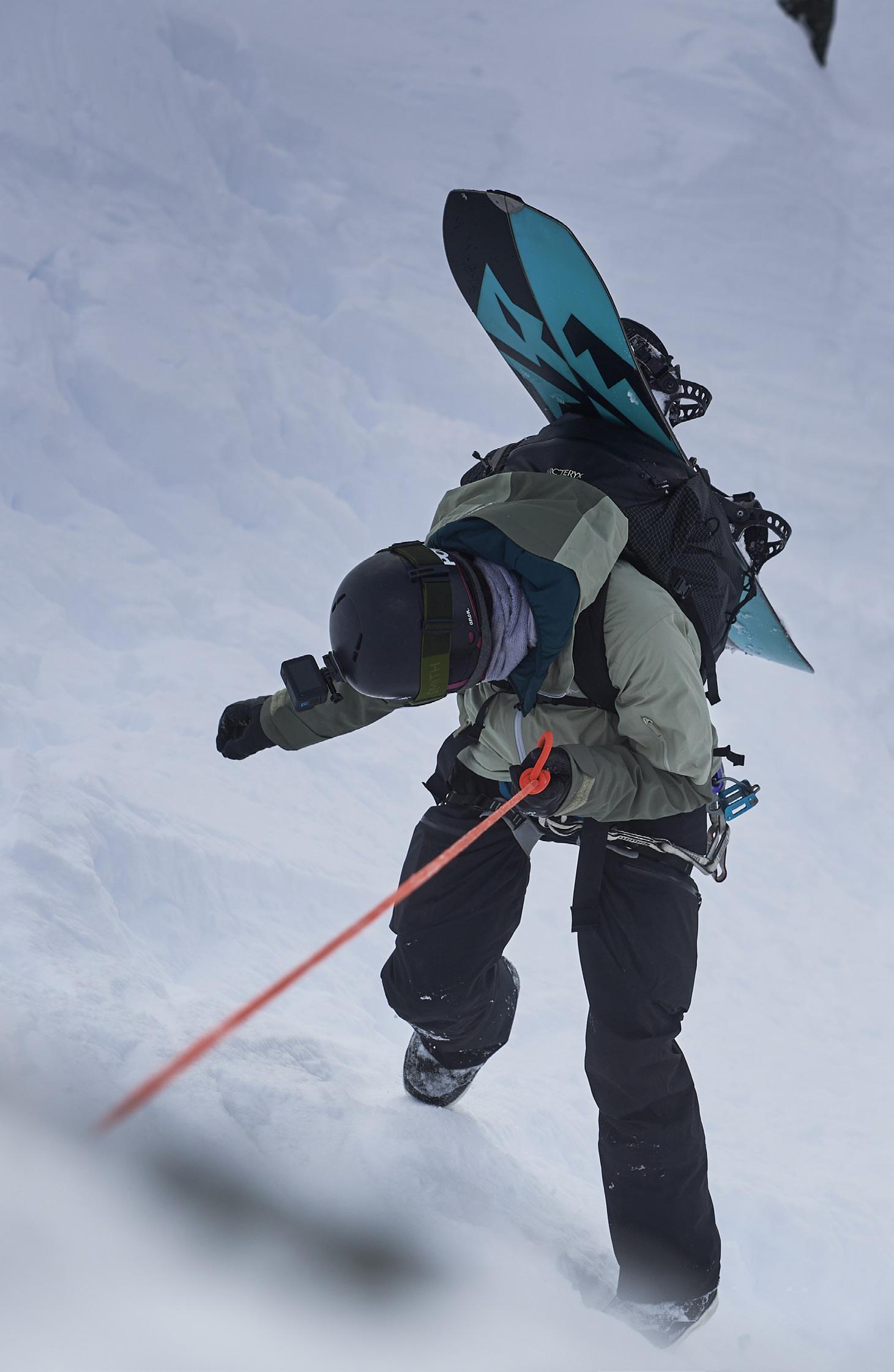
stood their capabilities and believed he and Sandy could teach them the skills needed to get up and down the peak safely. A Lil’wat skier descending Mt. Currie would be a point of both connection and pride, but a couple of ILSA youth doing so would redline inspiration and aspiration for all.
Morgan floated the idea with Ryan, the boys’ father. “I just kinda laughed and said I don’t know if they’re capable of doing it,” says Ryan. “Because you look at that mountain and it’s steep. It’s huge.”
Easygoing and ever-supportive, he was
nevertheless game if they were. As soon as he asked, the boys were all in.
WITH A HEAVY agenda to get up to speed by mid-winter of 2022/23, the crew first met at a fall sit-down with the boys’ mother, Hiroko Takay-Pascal. “The kids didn’t say a word,” recalls Seth. “They livened up on the first day of filming, though, at Talon’s pit-house project.”
In the summer of 2020, along with a few friends, Talon began building a traditional pit house, or istken, a foursided log pyramid erected over a large
54 • BC MAG
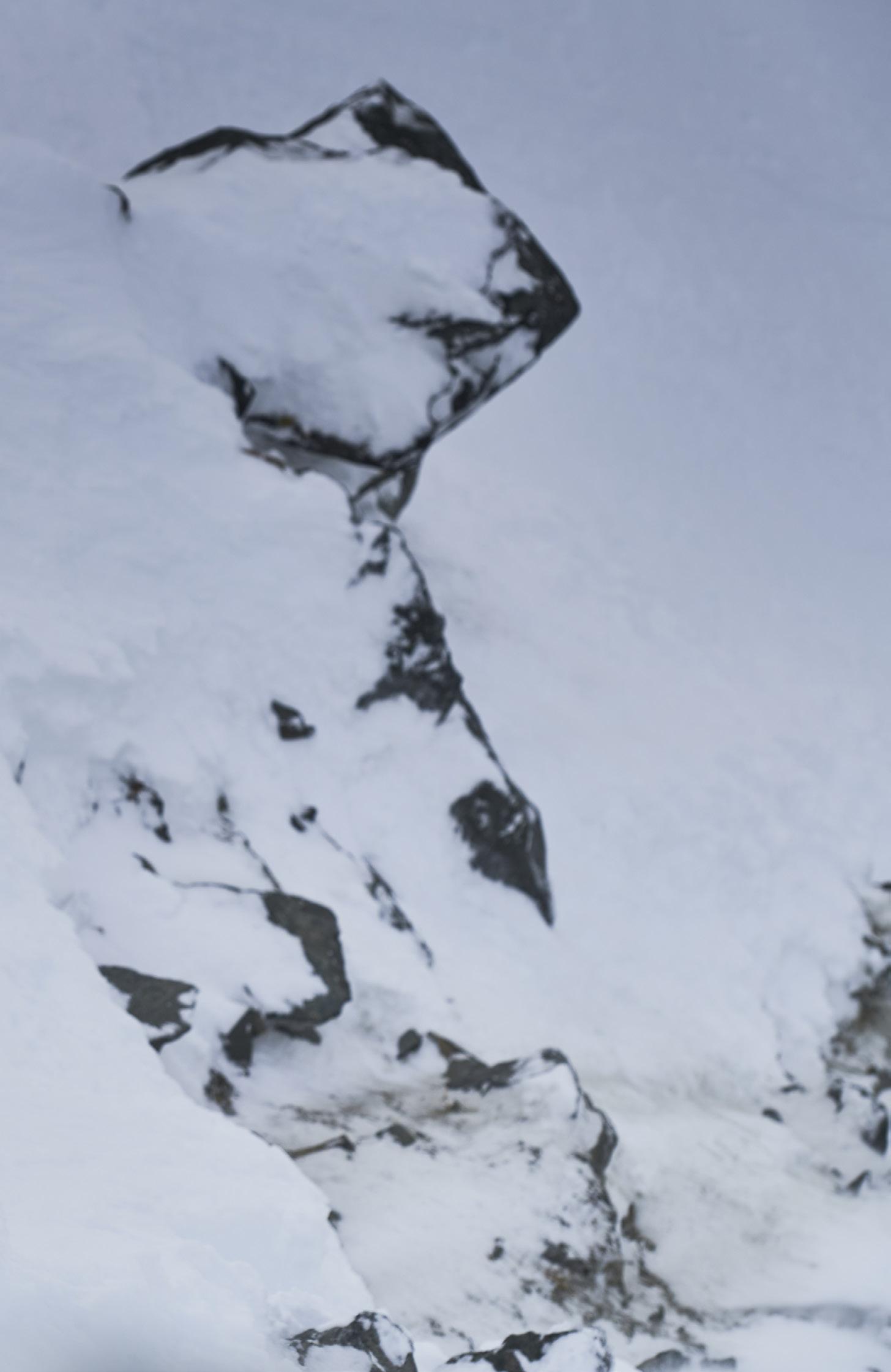
excavated living space. Though seemingly tangential to a training program of learning not only big-mountain ski skills but also how to use unfamiliar skitouring, climbing and avalanche gear, it was actually the perfect kick off.
At a young age, Talon dreamed that his place in the world was to walk the path of his ancestors. And so he set out, methodical beyond the ken of the average teen, to play a role in restoring the forgotten skills of his people. Self-taught via books, tips from elders and a modern tool paramount to visualizing ancient human arts—You-
Tube—he’d become skilled enough at hide-tanning, bow-making, knapping (fashioning spear points, arrowheads and knives from stone) to give presentations and workshops. “I [once] said to Talon, ‘You were born a hundred years too late,” chuckles Ryan. “And after thinking about it, I was [like], ‘No, wait a minute, I think you were born at just the right time to start saving our culture.’ He’s bringing it back.”
With a deep interest in Indigenous history, Talon had also volunteered on archaeological projects jointly overseen by Lil’wat cultural technicians and uni-
versity professors, and was about to begin his first term studying archaeology at Vancouver’s Simon Fraser University. Sudden demand to learn and get good at a whack of new skills appealed to his crafter/creator soul. “It’s easier for me to learn one thing to accomplish another when I’m interested in the final goal, and I was really interested in skiing Mt. Currie,” he says. “The whole process was great. I was never bored. Everything we learned was useful.”
Riki, as well, drank it all in. “I learned so much over the whole season,” he recalls, shaking his head as if it had all yet to sink in. “It made me a way more confident skier.”
Ward
down a steep chute on Mount Currie, with her splitboard on her back.
For Sandy Ward, the istken was also a point of reciprocation; she would mentor the boys in alpine savvy, but hoped to learn what she could from them about Lil’wat culture and traditions—bows and arrows and pit-houses being absent from her not-very-outdoor-oriented younger years.
Purchasing a snowboard at 15 had changed Sandy’s life with respect to both sport and indigeneity; within two years, she was on a First Nations snowboard team that evolved into ILSA. In short order she became both a coach and instructor, continuing to compete in halfpipe until knee injuries forced her out. As for many who dwelt in BC’s Sea to Sky region, one sport begat others, and, for Sandy, new ways to promote Indigenous involvement. Currently director of ILSA youth biking and climbing programs, backcountry co-lead for Indigenous Women Outdoors, athlete ambassador for Protect Our Winters Canada, and working toward mountain-guide certification on a splitboard, Sandy began learning about Lil’wat geography only when she got into backcountry. “Wanting to know the traditional names [for] mountains and the reason we called them that... really sparked my interest in learning about our culture,” she told Pique Newsmagazine
Of course, there’d be plenty of time for cultural exchange after the more
BC MAG • 55
Sandy
rappelling
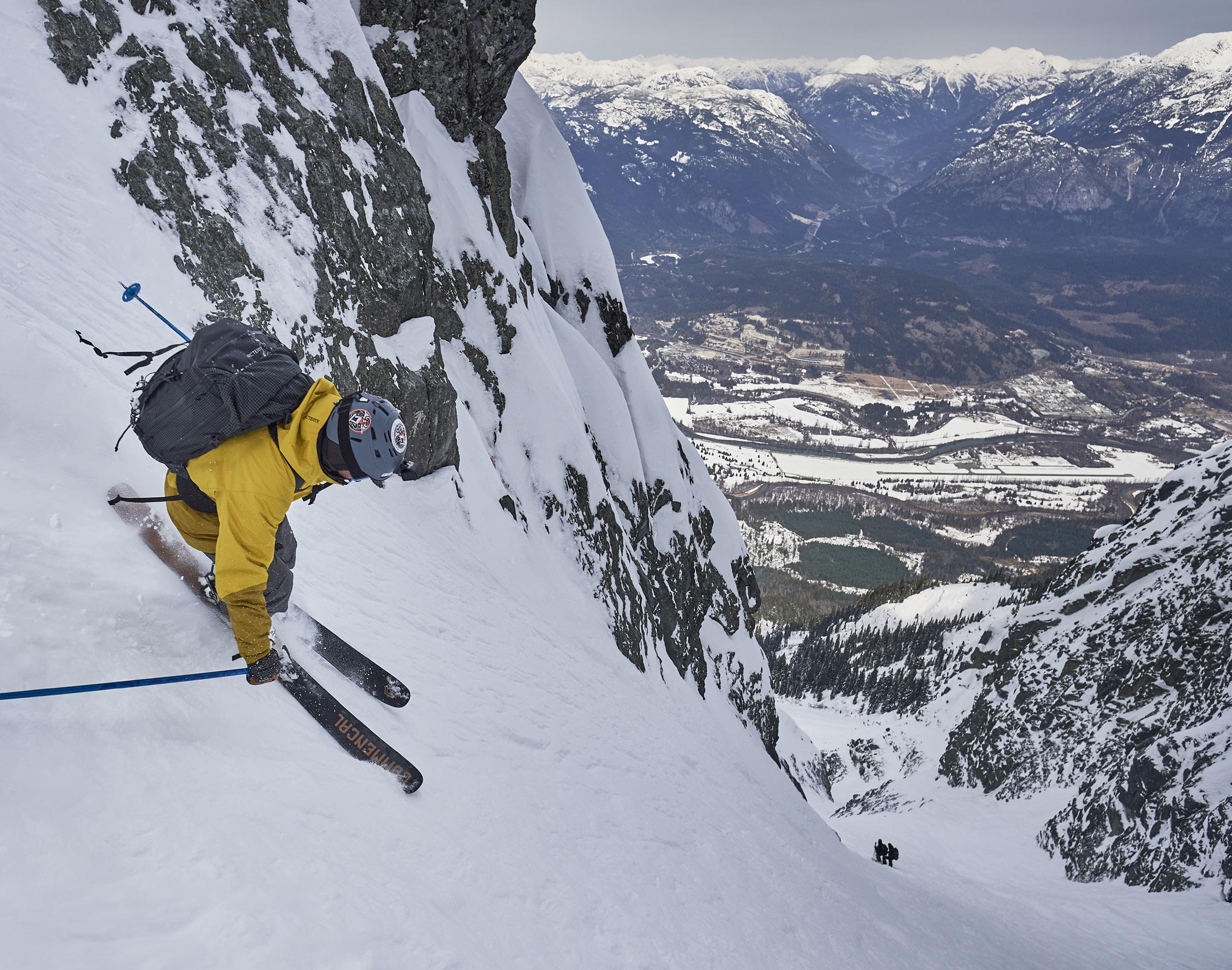
pressing issue of the descent, something that didn’t seem entirely certain on the group’s first mid-December ski day. Teen senders to the core, to this point in the boys’ skiing lives, it had been all about having fun. They skied with abandon, control being a distant afterthought. “Sandy and I kind of turned and looked at each other and wondered what we’d done,” recalls Seth.
Morgan knew better. Seeing the very aggression that could be harnessed for positive purpose, he stepped the boys into Whistler Blackcomb’s steepest lines. Jump turns. Low stance. Hand-placement. Angulation. An immediate shift took place. With
no illusions about what they’d bought into, there was real desire to learn what was necessary. The next few months were a blur of ski sessions, avalanche training, ski-touring missions, computer investigation and binocularand-finger-trace route-finding culminating in a February shakedown tour to ski Blackcomb’s infamous DOA couloir. Gratifyingly, the pair shredded the 300-vertical-metre classic. After two months, both mentors and mentees felt ready. Doubt, when there was any, focused on conditions—lining up stability, snow and sun. The hope had been to ski Ts’zil in February when there was snow to valley
bottom, but it wasn’t a great year in the Coast Mountains for alpine objectives; steeper lines hadn’t filled in enough to lessen their angle. “There were literally two days all winter it was in condition,” notes Seth. “And we missed the first one, so everyone was on standby.”
Finally, in March, the call came. On the eve of the descent, the crew gathered around a fire at the Pascal residence. The boys professed excitement about the skiing but showed much more convincing disdain for the required tour and climb to get there. The day before, Hiroko TakayPascal had made an offering for safe passage—food, a smudge and her favorite basket.
56 • BC MAG
Talon Pascal makes his way down the slope with the rest of the crew in the distance.
THE EXIT TO Mt. Currie’s Central Couloir carries skier’s left into a pseudocirque. It then skirts right of a moraine feature and follows high along a wall before descending into an alley between trees islands. Part way down that chute, it hooks into a long right-hand traverse through trees and into the bottom of the widest, least avalanche-prone of Currie’s three main funnel chutes. But those complexities were yet to unfold as the group huddled on the drop-in when Sandy fell.
Fortunately, she didn’t tumble far, experience allowing her to self-arrest in better snow a couple hundred feet down. But the calf muscle she’d torn a few weeks prior was toast; at first, Sandy thought she could side-slip the rest, but this was no place to be a hero. She’d eventually get herself to a pick-up zone on the exit route and be safely heli-lifted off, a 90-minute delay that prompted anxiety in some, somnolence in others (Talon managed to take a nap). “Mentally, everybody’s like, ‘Whoa, this is what it’s like when you mess it up,’” says Morgan of the effect on a group from a fall, which can be both negative and positive.
“When I saw the fall, I immediately thought I didn’t want to be part of this,” says Riki. Ultimately, however, it inspired him to stay calm, “to keep my brain from exploding, you know?”
It worked. When they got underway again, Riki was more ready than he let on. “Here goes nothin’,” he joked to Talon. “See you at the bottom.”
Wisely side-slipping the start and using every ski skill garnered in the past months, Riki made a turn, then two, then five. Finding a rhythm, he was soon eating up couloir vertical. Talon followed even more confidently, feeding off his brother. Accident and difficulties behind, they skied the rest of the route without incident, even finding some good powder after the traverse. The bushwhack exit still required concentration, but there was a celebratory mood.
Talon and Riki’s parents watched the achievement from a perch across the valley—as had many others. Unbeknownst to the skiers, their descent became a de facto community event. People left their houses to watch. Even Chief Dean Nel-
son followed with binoculars. All saw the boys’ courage to take on the mountain as part of the Lil’wat’s broader emergence into the light, asserting themselves in new ways on the land their people had been part of for millennia.
Ts’zil has pride of place on the BC Aboriginal Tourism Association’s map of cultural attractions, its face described as being “etched by the travels of a giant two-headed serpent,” with rocks on its northwest ridgeline representing two Lil’wat hunters transformed to stone. Now it had been etched by two ski-loving kids who grew up in its shadow, and the only thing transformed was the future.
IN SEPTEMBER, Talon and I arrange to meet at—apropos—the Mount Currie Coffee Company in Pemberton. He arrives dressed smartly in new jeans and a button-up shirt, sporting a natty flat cap over long black hair he keeps in braids behind his ears. A T-shirted Riki explodes out of the ether behind him, having walked into town from an overnight campout, unable to get a ride because his phone had died.
With fall in the air, March was ancient history in a young life. But I’m interested to know what lingered from the experience. It would take some work. First: many hands and thousands of hours later, Talon’s pit house was complete and he was off to university to start
a new chapter of cultural exploration. Second: Riki had his eye on hunting season. Then, somehow, thoughts on the descent pry themselves loose, like the rockfall on Ts’zil.
“I didn’t know what to expect,” offers Riki. “I was freaked out by the rappel and the steepness of the first part, but after four or five turns I was fine.”
“The first few turns were definitely the waking-up point for everyone; I wouldn’t say it was fun but it was still enjoyable,” says Talon. “And it had an effect—to realize I was able to do something like that without fear of being seriously injured. All the training paid off. I’d do it again…”
“… without the cameras,” laughs Riki.
Then Talon drifts into searching thought. “It’s not just a mountain you see every day anymore,” he muses. “It’s something else… something that’s always going to be part of me.”
It makes sense. Sharing what she’s learned about Lil’wat culture in ILSA and elsewhere, Sandy finds folks grateful to make a deeper connection to the land and better understand the history, hoping it instills more respect for the territory—and the Lil’wat, for whom the people and the land are one.
“It’s not about reclaiming the land. We never gave up our land,” she sums at the end of the film. “It’s about reconnecting and getting back out there. And it’s there for us when we’re ready for it.”

BC MAG • 57
The team at the end of a successful ski descent down Mount Currie.
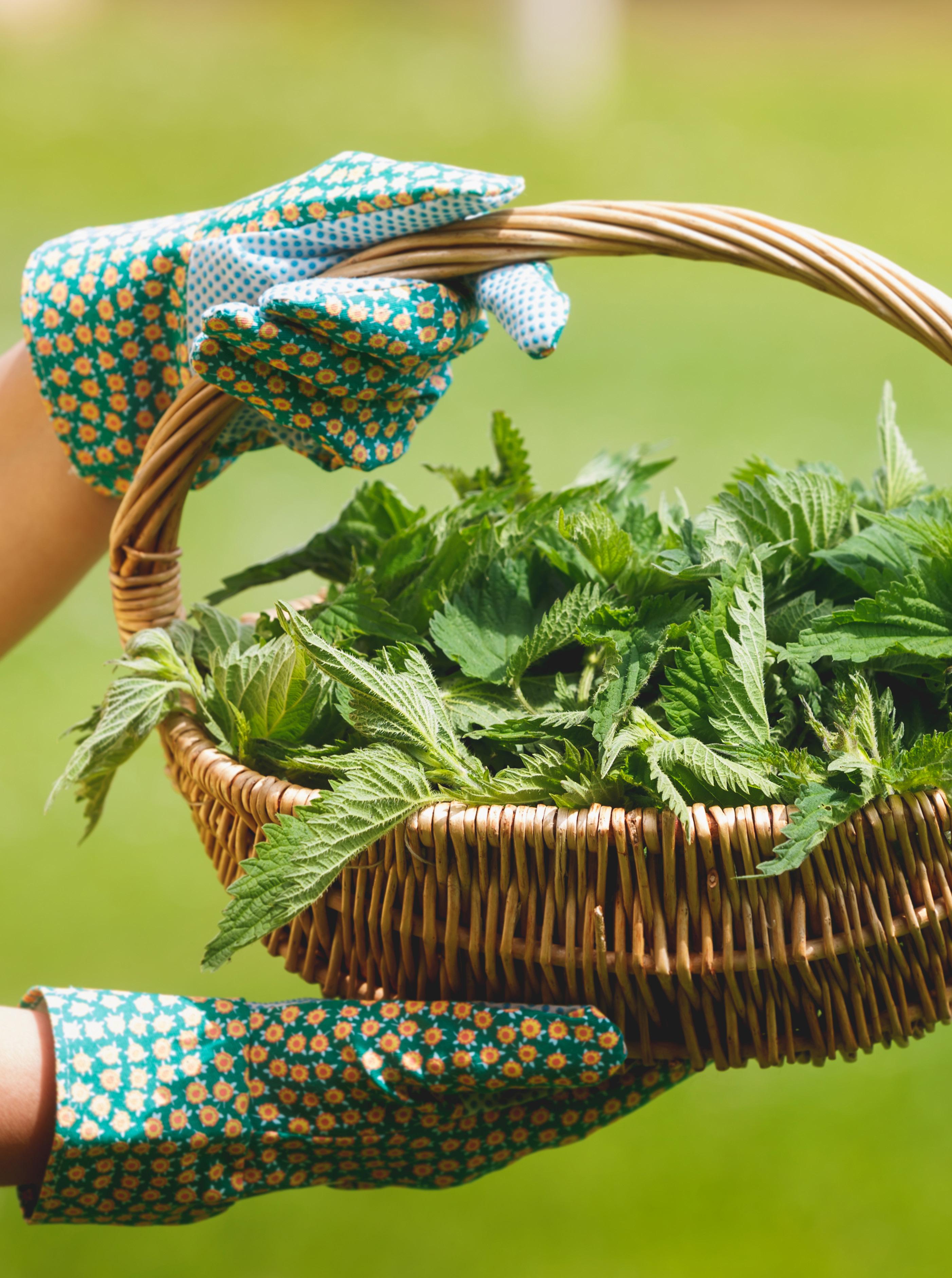 Wear protective clothing while harvesting stinging nettles.
Wear protective clothing while harvesting stinging nettles.
Forageable BC’S TOP 5 FOODS OF SPRING
A BEGINNER’S GUIDE TO FORAGING
BY LINDA GABRIS

After a long winter of dining on the same old bland and boring store-bought greenery, which more often than not has travelled from far and wide, there’s nothing I enjoy more than arming up with a basket and getting out into the warm, fertile woodlands to harvest a feast of super fresh picks from Mother Nature’s bountiful garden. Here are five of my favourite foods to forage in spring.

Fiddleheads
(Matteuccia Struthiopteris)
Fiddleheads are the first delectable plant to appear in the spring woodlands and they’re a perfect pick for beginner foragers to break ground with because, in recent years, the furled heads of the ostrich fern, which resemble the intricately carved head of a fiddle (thus their name), have become a popular commercial product popping up in the produce department of supermarkets across the country while in season.
So, if you are not sure what a fiddlehead looks like, making positive identification (which is the number one forager’s rule before dining on any wild plant) is as easy as going to the store and having a close-up look at them before heading out on a super fun “fiddle-heading” adventure.
Fiddleheads are extremely fast spring risers. One day there’s none and the next day a ton!
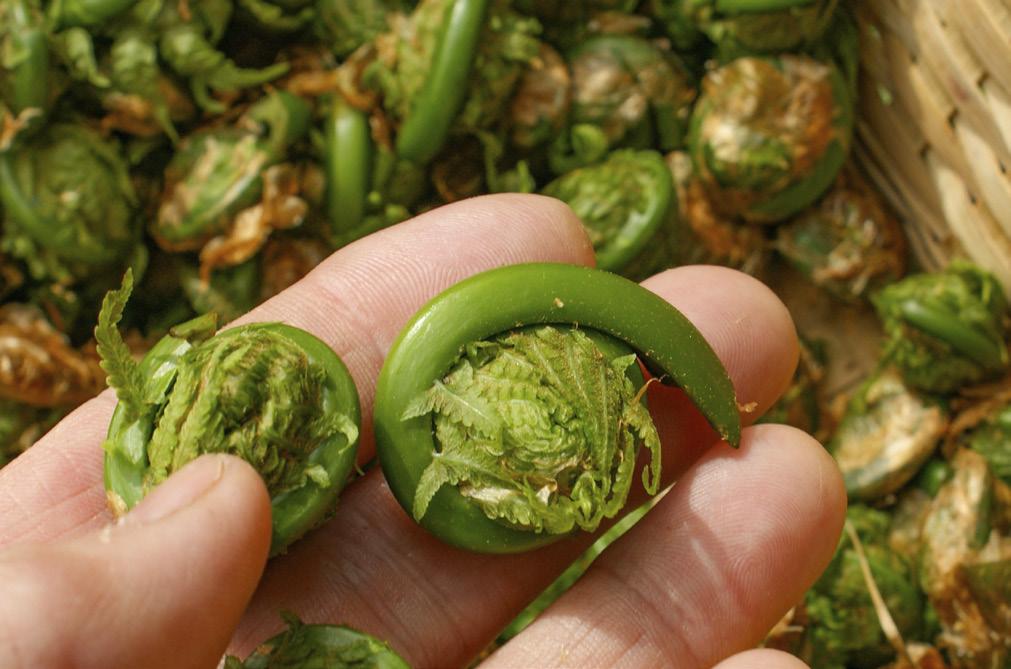
Because fiddleheads take a stand so quickly (according to grandma who claimed they can grow a couple inches tall in less than a 24hour span), the harvesting season is relatively short since
the fronds (or croziers as the morsels are known by some wild food connoisseurs) are at their prime for picking when they are still tightly curled.
Once the stock reaches
60 • BC MAG
around eight inches in height, the fronds quickly unfurl into graceful feathery ferns, losing their highly desirable “al dente” texture making them no longer suitable for table fare. However, the good news is, since the ferns can grow up to four feet tall throughout the summer, you can feast your eyes upon the beautiful sight of them swaying in the breeze right through until later parts of autumn when they turn golden brown and return back to the earth from which they sprung.
The harvesting season in Southern BC begins in early to mid April and in the Central and Northern Interior it is usually about a week or two later, depending of course on the weather and region. They grow most profusely in sunny open woodlands that have moist and fertile soil. My favourite spots for filling a basket are around the rims of swamps, marshes and lakes, along the shores of rivers and streams, and in gullies where the winter run-offs have pooled to create ideal growing grounds. A basket is best for gathering fiddleheads as plastic causes sweating, making it harder to remove the papery shucks upon cleaning. I recommend an

down at the end of the season and replenish the soil for reproducing new growth the following year.
airy, natural wicker basket (no paint, please) for collecting all “green” gatherings in.
Grandma taught me to harvest the fronds by pinching or breaking them off from healthy crowns which can sustain harvesting and she always reminded me to leave a few fronds and the beheaded stalks standing on each base. This is to let them die back

The fronds are covered with light-golden, papery shucks (similar to roasted peanut shucks), which must be removed before cooking. I find grandma’s method of “winnowing” is the easiest way to remove the shucks. Spread the fiddleheads on a sheet. Using your hands, loosen the shucks from the fiddleheads. Now, working with a partner, grab the sheet by the four corners and toss the fiddleheads up and down in the air, allowing the wind to blow away the light chaff. Wash the fiddleheads in several changes of cold water and pat dry with paper towels.
There are many delicious ways to prepare them with only one rule to follow! Health Canada advises fiddleheads must not be eaten raw as they can cause a foodborne illness with unpleasant symptoms such as cramping, upset stomach, vomiting and diarrhea or, as grandma poetically put it, “a severe case of green apple trots…” This was something I could easily relate to as a kid since I was always sneaking unripe apples off the backyard trees!
Steam or boil fiddleheads until tender, discard the cooking water, drizzle with butter, season with salt and pepper and they are simply delicious. Or let your culinary creative juices flow and dress them in a creamy cheese or spicy tomato sauce, add them to stir fries, quiches and soups. No matter how you serve them, you’ll discover fiddleheads are a supernatural spring treat.
Best Time to Harvest
BC MAG • 61
JAN FEB MAR APR MAY JUN JUL AUG SEP OCT NOV DEC
Fiddleheads, the fronds of ostrich ferns, are a delcious spring forager’s treat.

Stinging Nettles
(Urtica Dioica)
Just as the fiddlehead season is drawing near its end, hardy stinging nettles will be on the rise. They are another highly desirable pick for beginner foragers to set their sights on for a number of reasons. Chief among them is that stinging nettles, too, are an easy plant to identify because they really do live up to their name.
The leaves are covered with tiny hollow hairs containing formic acid, histamine and other chemicals that cause a “sting” or tingling sensation lasting for several hours when rubbed against bare skin. Thus, heed grandma’s old warning when going “nettling” and be sure to tuck your pant legs into your socks, wear a long sleeve shirt and take along a pair of gloves.
Nettles are a hardy plant, seeding themselves and spreading almost magically wherever there’s a plot of open ground to take root in. Bountiful patches can be found growing along the edges of waterways, rims of swamps, marshes, meadows and almost anywhere the soil has been stirred-up by livestock hooves and human activities such as pasturelands, logging grounds and backyard gardens.
Actually, grandma used to say it was silly to cultivate domestic greens like spinach and Swiss chard in the garden when nettles come back on their own every year “fussless and for free…” Of course, if constant weeding of our backyard vegetable gardens couldn’t keep up with our demand for this delicious wild potherb, grandma and I would take a leisurely walk in the woodlands to fill the bill.
Steamed nettles can be used in place of cooked spinach
in almost any recipe with very little noticeable difference. Nettles leaves can be steeped, fresh or dried, into a brisk herbal tea similar to real imported green tea from China.
Grandma has it noted in her old hand-written doctoring journals, which are full of Old World cures for everyday ailments and common complains, that one of the
Stinging nettles can be cut on the stalks, tied in bundles with string and hung to dry for tea.
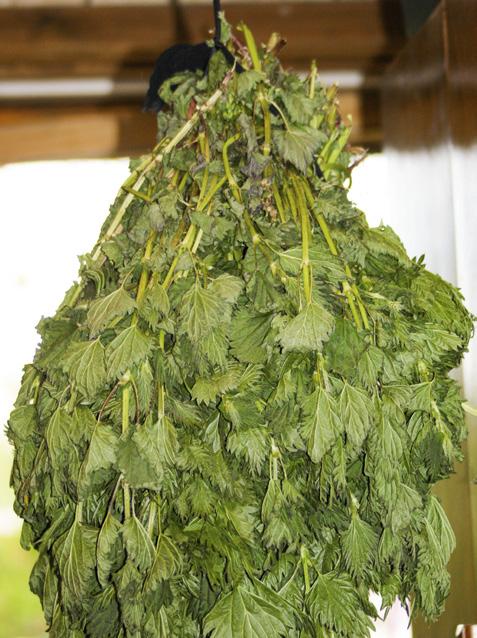
most potent spring tonics there is for flushing the buildup of winter impurities from the body is a cup of stinging nettle tea.
If you want to cash in on the healthy benefits of this fine herbal tea, put a small handful of washed fresh nettle leaves into a heated teapot, cover with boiling water and steep until the desired strength is reached. Strain, sweeten with honey, garnish with a lemon wedge and toast to your good foraging fortune!
To dry the tea for winter use, cut the nettle stalks when about two to three feet high, tie them into bundles with string and hang from a cup hook in the ceiling of a sunroom or attic until dry. When crispy, strip the leaves from the stalks, crush lightly and store in a tea tin. Use as you would regular green tea leaves. Sipping on a cup of nettle tea on a cold winter day brings back wonderful warm memories of spring.
Best Time to Harvest
62 • BC MAG
JAN FEB MAR APR MAY JUN JUL AUG SEP OCT NOV DEC
Dandelions
(Taraxacum Officinale)
We all know where the grass grows, the dandelions flourish. Unlike wild food lovers, such as myself, who sing all kinds of praises to the lowly flower, most non-foraging folks, especially those with well-groomed lawns, consider the plant to be nothing more than a “nuisance weed.”
However, dandelions (or dent de lion derived from French, referring to their jagged-edged leaves resembling the sharp teeth of a lion) are deeply rooted in world history, having been a respected food and admired flower of the Ancient Egyptians, Greeks and Romans. They were also used as a traditional medicine for thousands of years by the Chinese and North American Indigenous people who, like grandma, cashed in on their curative properties.
An interesting tidbit that is hard to believe since dandelions are one of our countryside’s most common flowers, is that they are not native to North America, but, as the story goes, were introduced to the New World by way of the Mayflower along with the early settlers. Some say they, the dandelions, arrived uninvited. Other folks tend
Best Time to Harvest
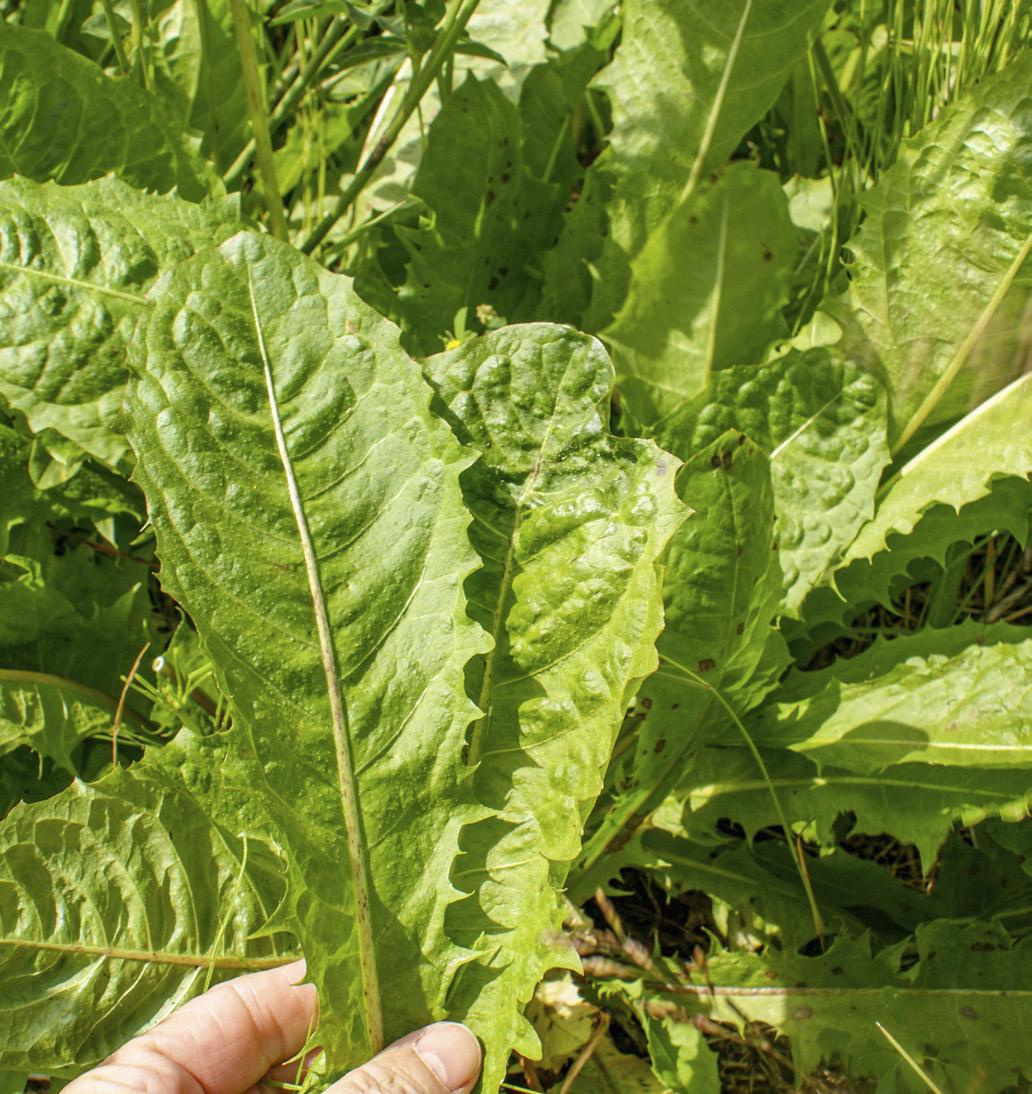
Smooth leaf or jagged leaf, both are wonderful for tossing.
to believe they were brought here on purpose to be used as a food crop.
Either way, once hardy dandelions landed on the shores, they eagerly took root and spread far and wide. Even though landscapers might frown at their stubborn existence, foragers are happy to know we can harvest de-
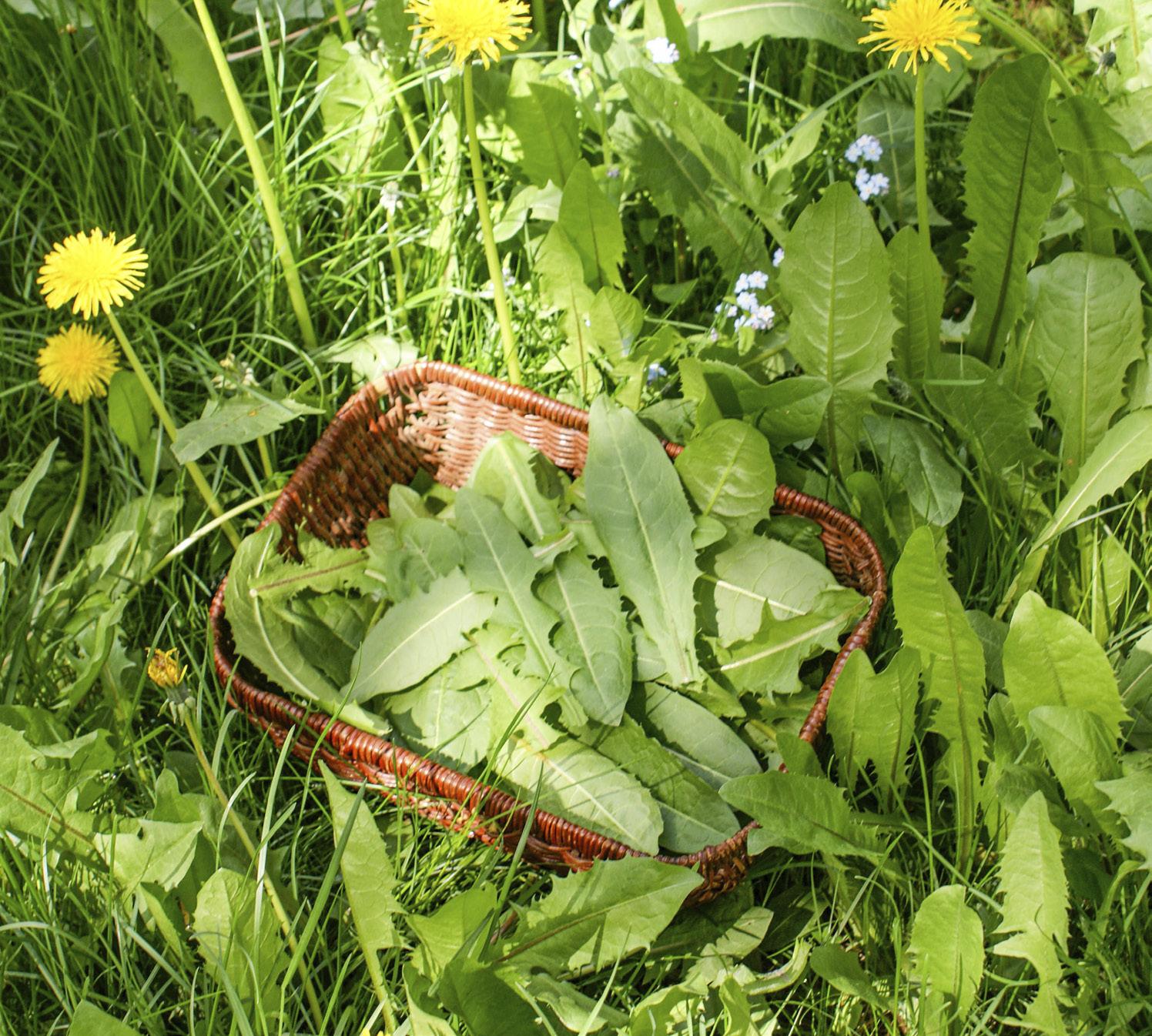
lectable, totally organicallygrown dandelions in almost any grassy field, meadow or even our own backyard from spring throughout summer. But please take note, never harvest dandelions (or any plant for that matter) from grounds which may have been sprayed with herbicides and pesticides.
The really good news is that dandelions are reputed as being more nutritious than most garden greens, and since they are so plentiful, easy-to-find and recognized by everyone, they are considered a number one survival food by outdoor enthusiasts such as myself.
Grandma used to tell me if I closed my eyes and made a wish before blowing off all the seeds of a “Fairy Clock” (an Old World name for a mature dandelion flower that’s ripened into a fluffball) with just one puff my wish would be granted.
So next time you’re in the meadowlands filling a basket with tender dandelion leaves for the salad bowl and you come across a bewitchingly beautiful fuzzy head of a ripe dandelion flower, don’t forget to make a wish upon the wind.
BC MAG • 63
JAN FEB MAR APR MAY JUN JUL AUG SEP OCT NOV DEC

Devil’s Club
(Oplopanax Horridus)
There is only one reason I can figure why these bristly plants are often dubbed the “devil’s walking stick” and that is because only the devil himself could stand to lean his weight upon such a thorny cane!
But, joking aside, when going into the early spring woodlands in search of a patch of devil’s clubs to harvest a delicious wilderness treat, you should make sure to dress as you would for stinging nettles, protecting your body from the prickles.
Devil’s club, also known as Alaska ginseng, has been used by Indigenous peoples as a medicine (as well as for religious purposes) throughout history. The plant was also utilized to make fish hooks and lures and when burnt, the charcoal was used for body paint.
Devil’s club is native to the rainforests of the Pacific Northwest, giving one a general idea of the plant’s preferred habitat, which is moist, fertile forest floors beneath heavy stands of timber. Often growing along rivers and streams, and in deep shady gullies and gulches.
So, you ask, what does this nasty-named plant with its irritating spine have to offer that is so heavily sought after by
foragers, who often rank the pick as a number-one spring treat? Well, it is the super tender, delectable spring buds which appear on the tip of the lanky canes around the early to
middle parts of May, right before the large “maple-shaped” leaves appear on the stalks, that we so hungrily seek!
The secret to gathering devil’s club buds is simple. You must be very quick on the draw because they appear on the tips of the canes almost overnight and within a week they can unfold into leaves. So, the harvesting season for the delicious morsels is very short. Of course, you can go back in later parts of summer to admire the cone-shaped clusters of tiny red berries, which beautify the woodlands but, take note, these fruits are not edible.
Devil’s club tips are a “totally wild” gourmet vegetable when lightly steamed and served with a drizzle of melted butter and a squirt of lemon juice, or dressed in a classic hollandaise or bechamel sauce.
Best Time to Harvest

64 • BC MAG
JAN FEB MAR APR MAY JUN JUL AUG SEP OCT NOV DEC
he last plant up on my spring list, but certainly not the least, is the beautiful nodding onion. I was introduced to this plant years ago after moving to BC from Ontario in 1970, by an Indigenous lady who was picking wild onions from along the rocky shores of the lower Fraser River.
Having learned to forage in the eastern woodlands, I was familiar with wild leeks, a close cousin of nodding onions but quite different in appearance, so I was pleased to discover an exciting new plant to take the place of wild leeks on my foraging menu.
Nodding onions, like wild leeks, have a mouthwatering onion-like flavour and aroma which makes them an easy target for beginner foragers to identify simply by taking an appetizing whiff of the pungent bulb. They resemble a green garden onion but have flat, grass-like stems instead of hollow ones and yield smaller, slightly elongated bulbs which have a stronger flavour, making them a wonderful kitchen herb.
The amazing thing about nodding onions is the fact they are a perennial plant, which basically means you can gather them year-round. Even though they are at their prime for harvesting for everyday table fare during spring and summer when they are most tender, in a survival situation you can
dig them out from under autumn leaves, frosty rocks and stones, and even winter snow to use in your survival food pot.
Nodding onions grow throughout the province, except in Haida Gwaii. They are adaptable to various terrains, being able to flourish on both moist and dryer soils. Over the years, I have harvested them from rocky shorelines along rivers and lakes, on sandy hillsides and on open, needle-carpeted grounds beneath evergreen trees.
Why, you wonder, are they called “nodding onions”! Well, it is because when the plant blooms in early to middle parts of summer, depending on weather and region, each mature bulb in the soil bears a single flowering stem which is adorned with up to 30 beautiful, very delicate light pink, bell-shaped flowers with protruding yellow stamens which hang from the stem in a nodding fashion. As though napping in the sun.
When nodding onions are up on your foraging menu, please do as I do and pick

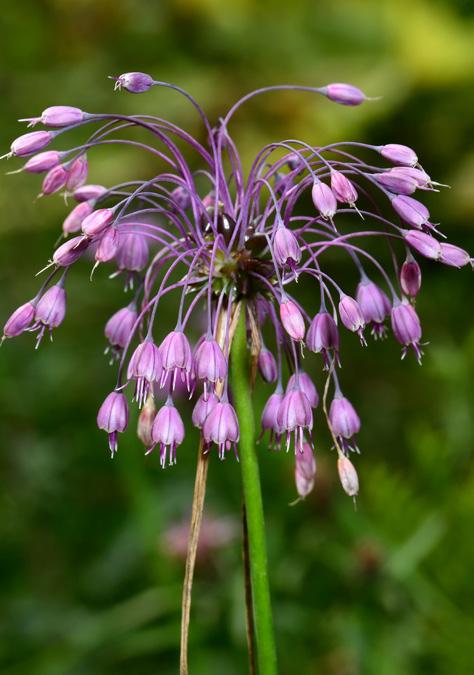
A beautiful bunch of wild nodding onion flowers.
them very sparingly, in a thinning out fashion. My rule of thumb is the same as the one grandma and I abided by in the hardwoods back home when harvesting wild leeks (and most other green plants as well) and that is to uproot only one plant out of every five you see, leaving the rest to live out the season, return to the earth, replenish the soil and reproduce again the following spring.
So go, gather and give thanks for all the wonderful bounty Mother Nature provides in our beautiful BC woodlands.
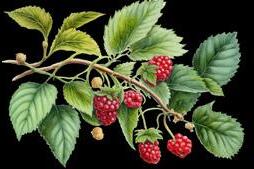

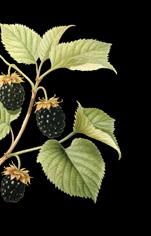




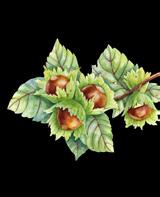
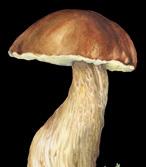
BC MAG • 65
Nodding Onions
Cernuum) T W Harvest BC A FORAGER’S GUIDE TO EDIBLE PLANTS OF BRITISH COLUMBIA 71 W ild Harvest BC BY LINDA GABRIS $24.95 ISBN: 978-1-7778764-2-5 www.opmediagroup.ca Linda Gabris has been venturing into the outdoors to harvest wild edibles for over 60 years. The lessons taught to her by her grandparents, of responsibility, sustainability and connection to the land are as important today as they were then. This book shares those lessons as well as tips and practical advice in personal, easy-to-read style. Combined with scientific field guide, Wild Harvest BC is the perfect companion book to take with you on your outdoor adventures. Over 70 recipes ranging from Wild Cream of Asparagus Soup to Hazel’s Hazelnut Brittle will help you turn your foraging finds into delicious, hearty meals. So get out there and enjoy the bounty of Mother Nature. Wild Harvest BC Interested in foraging in BC? Get your copy of Wild Harvest BC by Linda Gabris from our online bookstore: thebookshack.ca Best Time to Harvest JAN FEB MAR APR MAY JUN JUL AUG SEP OCT NOV DEC
(Allium
Hummingbirds at Risk
 STORY & PHOTOS BY ISABELLE GROC
STORY & PHOTOS BY ISABELLE GROC
THE FLYING JEWELS OF BRITISH COLUMBIA ARE ON THE DECLINE, BUT THERE ARE THINGS YOU CAN DO TO HELP
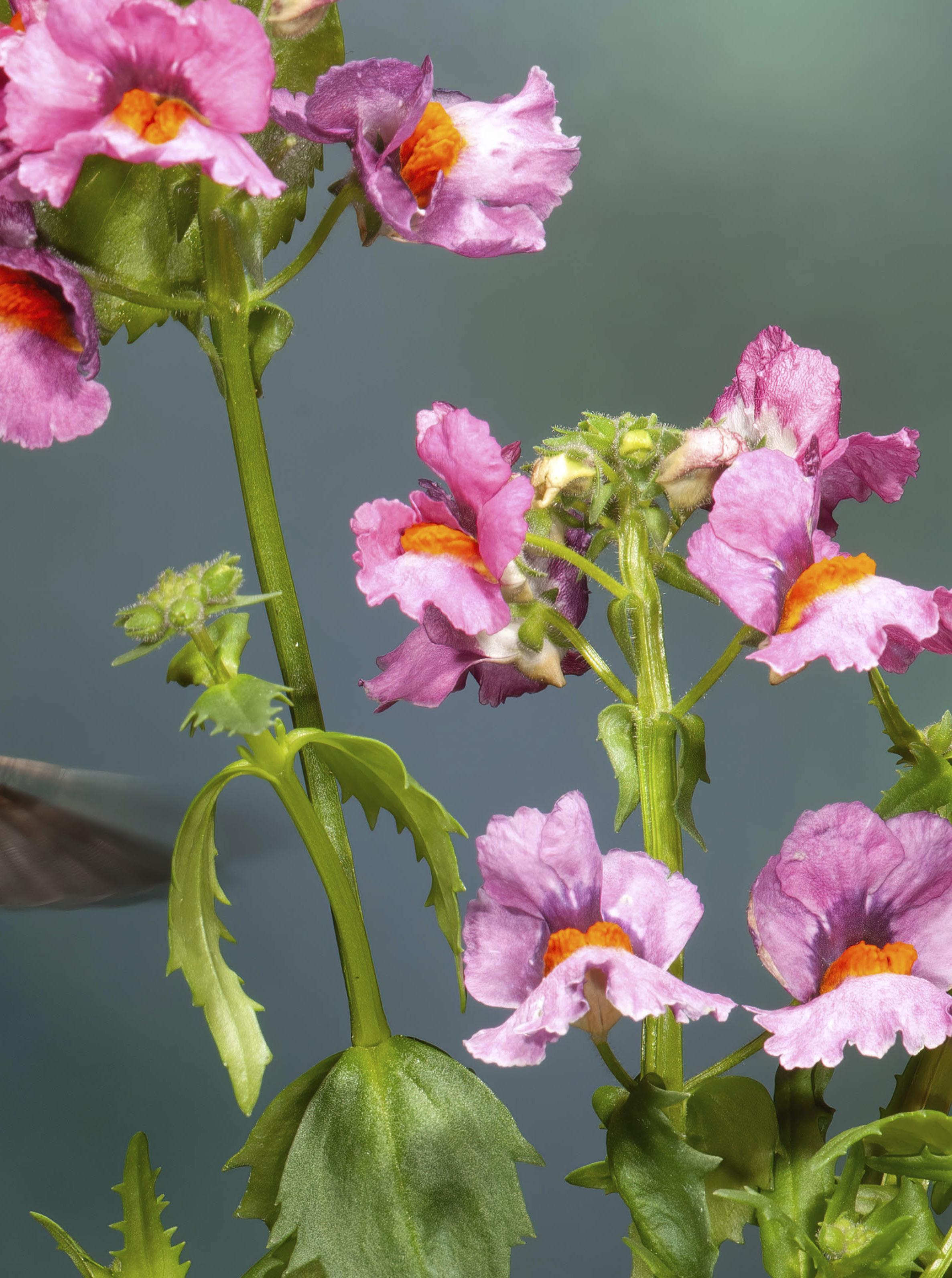 A male rufous hummingbird visits a nectar flower.
A male rufous hummingbird visits a nectar flower.
SShortly before COVID, Thomas Schuster and Christine Norcross attached a nectar feeder on the window of their ground-floor condo apartment in Vancouver as an experiment to see if they could attract hummingbirds to their backyard. As they worked from home during the pandemic, the couple started watching the tiny birds that visited the feeder on a daily basis.
To their great surprise, they realized that a female Anna’s hummingbird had started to build a nest in their garden in the late winter, well camouflaged in the thick yew hedge that separated their patio from the busy street. “We were super excited,” Norcross said. “We felt lucky that she was so close for us to have a chance to watch from the window.”
The couple, both geologists and nature lovers, followed every single parenting step, from nest building to egg incubation and feeding up to the moment the two hummingbird nestlings left the nest. “They became part of our life and our routine. We were very careful not to disturb them, but they also were curious about us.” Schuster said.
ANNA’S HUMMINGBIRDS HAVE often been called flying jewels, displaying an impressive assortment of colours. The adult males have a bright reddish-pink crown and throat while the females have green backs and iridescent specks of pink and red on their throats.
Norcross and Schuster are amongst many people who are captivated by Anna’s hummingbirds. In 2017, the bird was named the City of Vancouver’s official bird following a vote by city residents.
As the only species of hummingbird in North America that resides year-round in the Pacific Northwest region, Anna’s hummingbirds have adapted to live alongside people in urban areas, taking advantage of unusual nesting spots like plant hooks, outdoor lights, electrical wires and patio decorations. They help build city dwellers’ connection to nature.
“The disadvantage of living in the city is that you never feel that you are around nature,” Norcross said. “So to have this hummingbird at our fingertips right outside in our tiny yard, this was huge for us. You can’t ask for more when you are a condo dweller in the city. This is what everybody hopes for.”
Anna’s hummingbirds are one of five species of hummingbirds that can be seen in British Columbia: the rufous, calliope and black-chinned species occur primarily on the west side of the Rockies, while the ruby-throated hummingbird occurs to the east. Anna’s hummingbirds are a new arrival in BC. Since the 1930s, they have expanded north and east from a range that was previously restricted to
“Anna’s hummingbirds have often been called flying jewels, displaying an impressive assortment of colours
coastal California. They now can be seen as far north as southern Alaska. They first arrived in BC in the 1940s and over the past two decades, populations have increased dramatically. Many birds now overwinter and breed in those northern latitudes rather than flying south.
This rapid range expansion, particularly into colder regions such as the Pacific Northwest, is believed to be due to

the fact that more people are providing nectar feeders and planting exotic flowers that bloom in different seasons in urban and suburban gardens. The warming climate is also a factor. Anna’s hummingbirds may possess physiological and behavioural adaptations that allow them to withstand the extreme cold weather in Canada and may benefit from the “heat island” effect in urban centres. “They are tolerating cold temperatures. They are also using the warmth of buildings and finding spiders and other insects around buildings to supplement them when it’s cold in the winter,” said Christine Bishop, emeritus research scientist with Environment and Climate Change Canada who
68 • BC MAG

studies hummingbirds.
Even though they have learned to live in close proximity to humans, the unique and specialized features of Anna’s hummingbirds—and other hummingbird species—remain largely unknown to most people and have intrigued scientists for decades. Hummingbirds are amongst the smallest birds in the world, but no other feathered creature can match their aerial acrobatics. They can fly forward, backwards, sideways and even upside down.
“There are no other vertebrates that can sustain hovering like hummingbirds do,” says Doug Altshuler, a zoologist at the University of British Columbia who
has been studying hummingbirds for nearly 30 years, using high-speed cameras to track their flight patterns. “They are such an interesting animal to gain insight into brain function, mechanical function and muscle function because they combine many of the best features of both invertebrate and vertebrate animals.” With his research on hummingbirds, Altshuler is hoping to learn more about how the brain works, with a potential greater understanding of human motor neuron diseases.
ALTHOUGH HUMMINGBIRDS possess these unique abilities, their future is uncertain. Except for Anna’s hum-
mingbirds, other species are undergoing significant population declines. A study published in 2021 that examined the population trends for eight North American hummingbird species from the Breeding Bird Survey revealed that Allen’s, rufous and broad-tailed hummingbirds have all declined since 1970, and the rate of decline increased from 2009 to 2019. Ruby-throated hummingbirds—found in Eastern North America—have also declined by 17 percent between 2004 and 2019, after several decades of population increase. Two other species—black-chinned and calliope hummingbirds—also showed declines between 1997 and 2021.
BC MAG • 69
Two rufous hummingbirds feed on nectar. On average, hummingbirds visit between 1,000 and 2,000 flowers every day.
“Things have gotten worse in the last 10 years. Where populations were stable, they are looking less stable and where populations were decreasing, they are decreasing more quickly,” noted Simon English, a graduate researcher at UBC and lead author of the study. “While Anna’s hummingbirds have taken advantage of feeders in urban areas, other species prefer a more natural, forested habitats,” added Bishop, who co-authored the study. “If you are a city bird, things are going better for you than if you are a forested habitat bird.”
Amongst the declines, the rufous hummingbirds have experienced the most dramatic changes, with a population decrease of 65 percent from 1970 to 2019. Researchers are particularly concerned by the steady decline in the survival rate of juvenile birds.
WITH ITS EASILY identifiable orange throat, the arrival of the rufous hummingbird in British Columbia is a sign of spring. Weighing about three grams, they make one of the longest migratory journeys of any bird in the world measured as distance travelled relative to body length. Every year, they travel 5,000 kilometres (one-way) between their wintering sites in Mexico to breeding locations in Western North America, as far north as coastal southeastern Alaska. Canada hosts about 57 percent of the global breeding population of rufous hummingbirds, almost entirely within the province of British Columbia.
As a long-distance migratory species, rufous hummingbirds use diverse habitats over large geographical areas. Bishop and other researchers have been putting bands on hummingbirds’ legs for years so
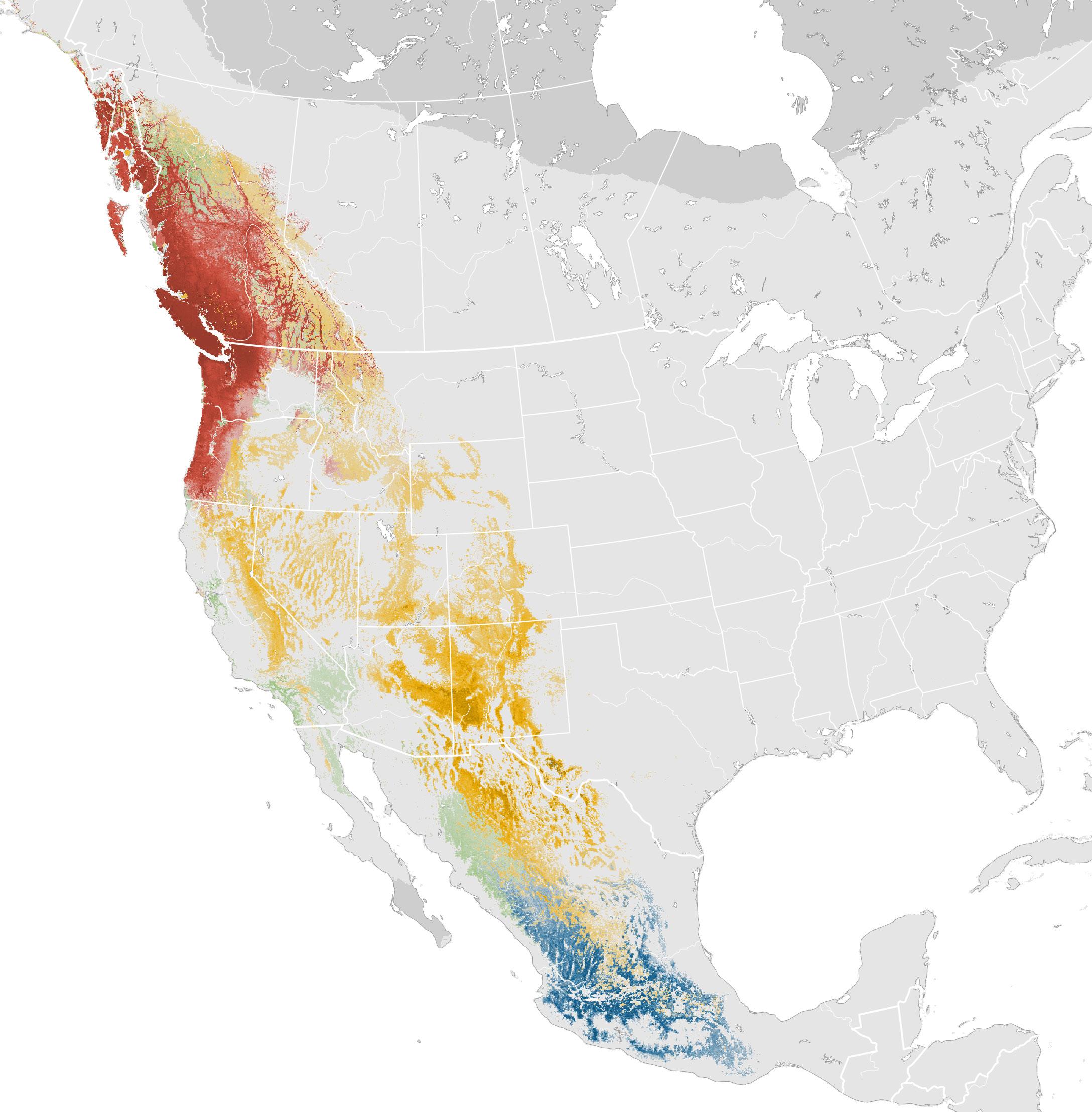
Rufous hummingbirds travel nearly 5,000 kilometres from breeding grounds in Alaska and northwest Canada to wintering sites in Mexico. They travel north up the Pacific Coast in spring and return by the Rocky Mountains in late summer and fall.
Pre-breeding migration route
Breeding grounds
Post breeding migration route
Wintering grounds

they can monitor the population. Bishop found that up to 25 percent of rufous hummingbirds come back to the same location. “They are a bird that is really depending on the reliability of migration stopovers,” she said.
But the landscapes through which the hummingbirds travel have experienced dramatic changes over the past century, including warmer, drier conditions, increased wildfires, the loss of wetlands,
ebird.org

conversion of land to agriculture, urban development, invasive species and the use of pesticides in agriculture and forestry. Young birds on their first migration may face even greater risk. “Hummingbirds depend on nectar and they depend on insects and both of those things are running in short supply with more impacts on habitat quantity and quality,” Bishop said.
Researchers also note that rufous hum-
mingbird survival declined strongly in areas with higher human population density, the very reason that also facilitated the range expansion of anna’s hummingbirds. “This represents instability in the ecosystem,” English commented.
Climate change may additionally cause a mismatch between the migration timing of rufous hummingbirds and the bloom of nectar-producing flowers the birds rely on for feeding in the spring.
With extreme heat, nectar sources can also dry up. In addition to consuming insects and spiders which provide protein, fat and salts, hummingbirds drink large quantities of nectar—two to four times their body weight a day—which contains sugar and is a good source of energy. On average, hummingbirds visit between 1,000 and 2,000 flowers every day.
Invasive species can add to the challenges the birds are already facing. For
BC MAG • 71
A female Anna's hummingbird feeds her nestlings.
example, rufous hummingbirds time their arrival on the BC coast with the blooming of salmonberry in the spring. However, salmonberry is losing ground to the invasive Himalayan blackberry, which blooms in June, too late for the birds on their migratory journey.
Of the range of threats faced by the rufous hummingbirds, Bishop was particularly concerned about their potential exposure to pesticides. Like bees, hummingbirds are important pollinators, and as such could be impacted by neonicotinoids (neonics) as they fly from one flower bloom to another searching for nectar. The harmful impacts of neonics—the most widely used class of insecticides in the global market—on bees have already been studied but had never been measured in hummingbirds.
IN 2015, BISHOP and her team began collecting urine and feces samples from rufous and Anna’s hummingbirds to determine exposure to neonics in the agricultural region of the Fraser Valley, where pesticides are used for the rapidly expanding blueberry production. They also tested for pesticides in hummingbirds that lived in suburban and rural
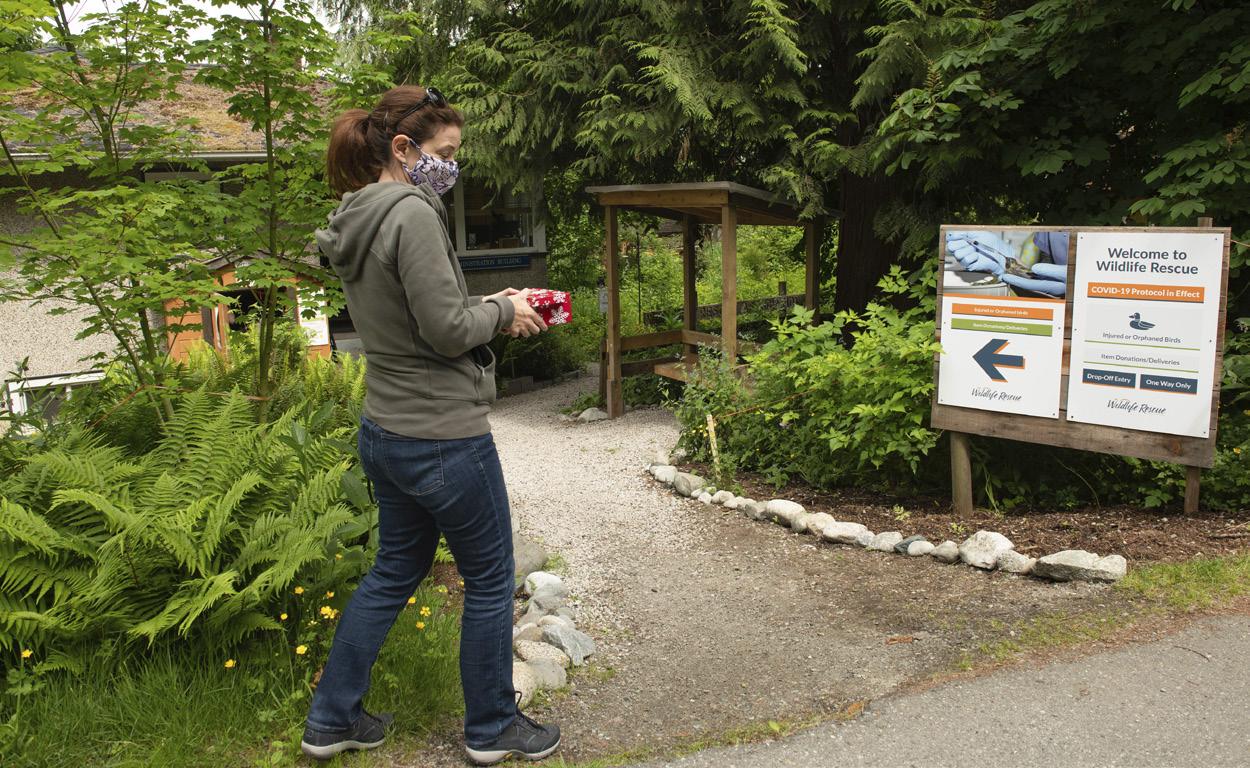
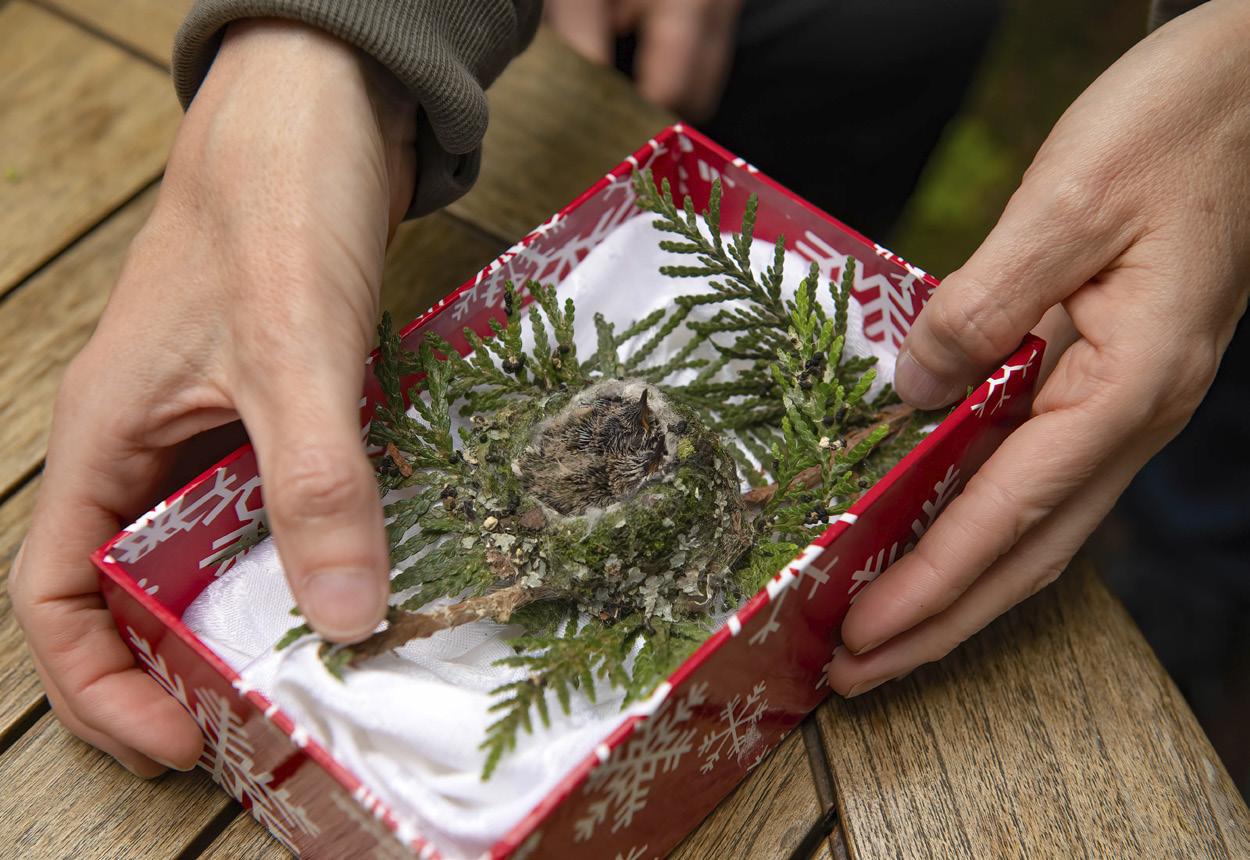
IF YOU FIND AN INJURED OR ORPHANED HUMMINGBIRD
A mother hummingbird rarely abandons a nest, but in some cases the chicks are left to fend for themselves if something happens to mom. She may have been hit by a car or caught by a cat. If you suspect a nest has been abandoned, you must watch continuously from a distance for at least an hour, sometimes more, to be sure mom is not returning. Don’t look away as she is quick! Feedings can be surprisingly infrequent in some stages of the chicks’ development. Contact your local wildlife rehabilitation centre for instructions. Never try to nurse or raise a hummingbird or any other bird on your own. They are delicate creatures and can be easily injured if handled.
areas and in high altitude sites further away from agricultural activity. Neonics spread rapidly through the environment in runoff due to high water solubility and their persistence in plants and soil. The impacts on wildlife are multifaceted, as the pesticides escape from agricultural fields into aquatic systems and impact non-crop nectar plants. Additionally, the pesticides kill or contaminate the insects that the hummingbirds rely on as a food source. “Prior to our work, there was not even a consideration that there would be a risk for pesticide exposure in hummingbirds,” Bishop said.
BISHOP FOUND HIGH levels of pesticide exposure in both Anna’s and rufous hummingbirds that lived near sprayed blueberry fields, but also detected the harmful chemicals in birds that lived away from agricultural areas. “There are a lot of opportunities for birds to be exposed if they are feeding on nectar and insects,”
Bishop said. For example, hummingbirds can be exposed to contaminated nectar flowers originating from nurseries and planted in suburban gardens.
As Health Canada adopted restrictions on the use of neonicotinoid pesticides in the spring 2021, researchers further measured whether the regulation made a difference for the hummingbirds. They found that new replacement pesticide concentrations had increased in hummingbird urine by a factor of more than seven before the old neonicotinoid pesticides they were replacinghad even dissipated or degraded in the surrounding environment.
In the only experimental study that measured impacts of pesticides on hummingbirds, researchers found that a short-term exposure significantly reduced the energy levels of captive rubythroated hummingbirds. “This is going to interfere with the behaviours of hummingbirds who require a certain amount
72 • BC MAG
Christine Norcross brings the orphaned hummingbird nestlings she rescued in her backyard garden to the Wildlife Rescue Association of BC.
of energy for survival through cold nights, reproduction, migration or any of the high energy tasks they must endure during their life cycle,” said English, study co-author. “Current intensive agricultural practices present a slew of threats to hummingbirds and other species, and also to humans because we rely on these ecosystems as well,” he concluded.
ALISON MORAN, DIRECTOR of the Hummingbird Project at Rocky Point Bird Observatory in Victoria, has been monitoring and banding hummingbirds for over 25 years. She hopes that the emotional connection that many people have now developed with the Anna’s hummingbirds that live close to them can help support more conservation action for all hummingbird species, for example by ensuring that the ponds and wetland areas the birds rely on for insects are increased and protected. “It is vital to protect every aquatic source, the wetlands around the landscape but also little ponds in backyards.” Moran said.
Since they have been observing Anna’s hummingbirds in their own backyard in Vancouver, Schuster and Norcross have developed a new appreciation for birds. “Anna’s hummingbirds have expanded our knowledge of birds, bird life, and bird habitat,” Schuster said.
While Anna’s hummingbirds can serve as charismatic ambassadors for bird conservation, their urban lifestyle comes with many risks: they can be caught by house cats, crash into windows or be hit by cars. They can also die from drinking out of dirty nectar feeders. There might be other threats that researchers do not fully understand yet.
Schuster and Norcross personally experienced the vulnerability of Anna’s hummingbirds in the city when a female built another nest in their backyard. The eggs successfully hatched, but one evening, the hummingbird mother never came back to feed the nestlings. After carefully monitoring the situation, the couple had to step in and brought the nestlings to the Wildlife Rescue Association of BC.
In the last 10 years, the organization saw a massive increase in the number of hummingbirds admitted for care, from 16 birds in 2010 to a record number of 322 in 2021. “Hitting windows is the
number one reason why hummingbirds are brought to us, followed by cat attacks,” said co-executive director Linda Bakker. Hummingbirds can also catch a fungal disease from nectar feeders hat have not been properly cleaned. “Most of the injuries that we see are related to the human presence,” Bakker said. “We also see a lot of Anna’s hummingbirds when it is really cold in the winter and they are struggling.”
The association indicates that the sur-
vival rate of hummingbirds in their care is about 50 percent. About a month after Norcross and Schuster brought in their one-week-old orphaned nestlings, one of them was successfully rehabilitated and released.
“They are amazingly resilient and yet when you look at them, they are incredibly fragile too,” Norcross said of the rescue. “Human beings have done a lot of damage to the natural world and it’s nice on the good side and coexist together.”
LIVING WITH HUMMINGBIRDS
• A hummingbird that visits your garden or balcony is a special treat. You can take a few simple actions to create a welcoming and safe landscape for your tiny guests that will meet their needs for food, water and shelter.
• Plant a variety of native, nectar-rich flowers on your patio, back garden, or even apartment balcony. Install a moving water feature or a pond. Add high perches for the birds to rest and shrubs that serve as cover for nesting and protection from the weather. Native trees and shrubs require minimal maintenance once established and serve as food plants for the insects hummingbirds like to eat.
• Do not use pesticides and keep cats indoors. It is safer for cats and hummingbirds. Prevent deadly glass collisions by making windows visible to birds.
• Hang a feeder (high enough, safe from cats) filled with sugar water. A solution of four-parts water to one-part white table sugar is easy to prepare and similar to the natural nectar of flowers. Boil the mix and let it cool. Avoid other types of sugar or honey. Never add dyes and do not use commercial feeder mixes which contain chemicals that are harmful to the birds. Feeders must be cleaned in hot water and refilled every two to three days. If hummers drink a contaminated solution, they can become ill.
• On a larger scale, help preserve local ecosystems and wildlife by supporting community parks, open space preservation, and wetland restoration projects. Support sustainable agricultural practices that consider biodiversity.

BC MAG • 73
A female Anna's hummingbird drinks from a feeder filled with sugar water.
A
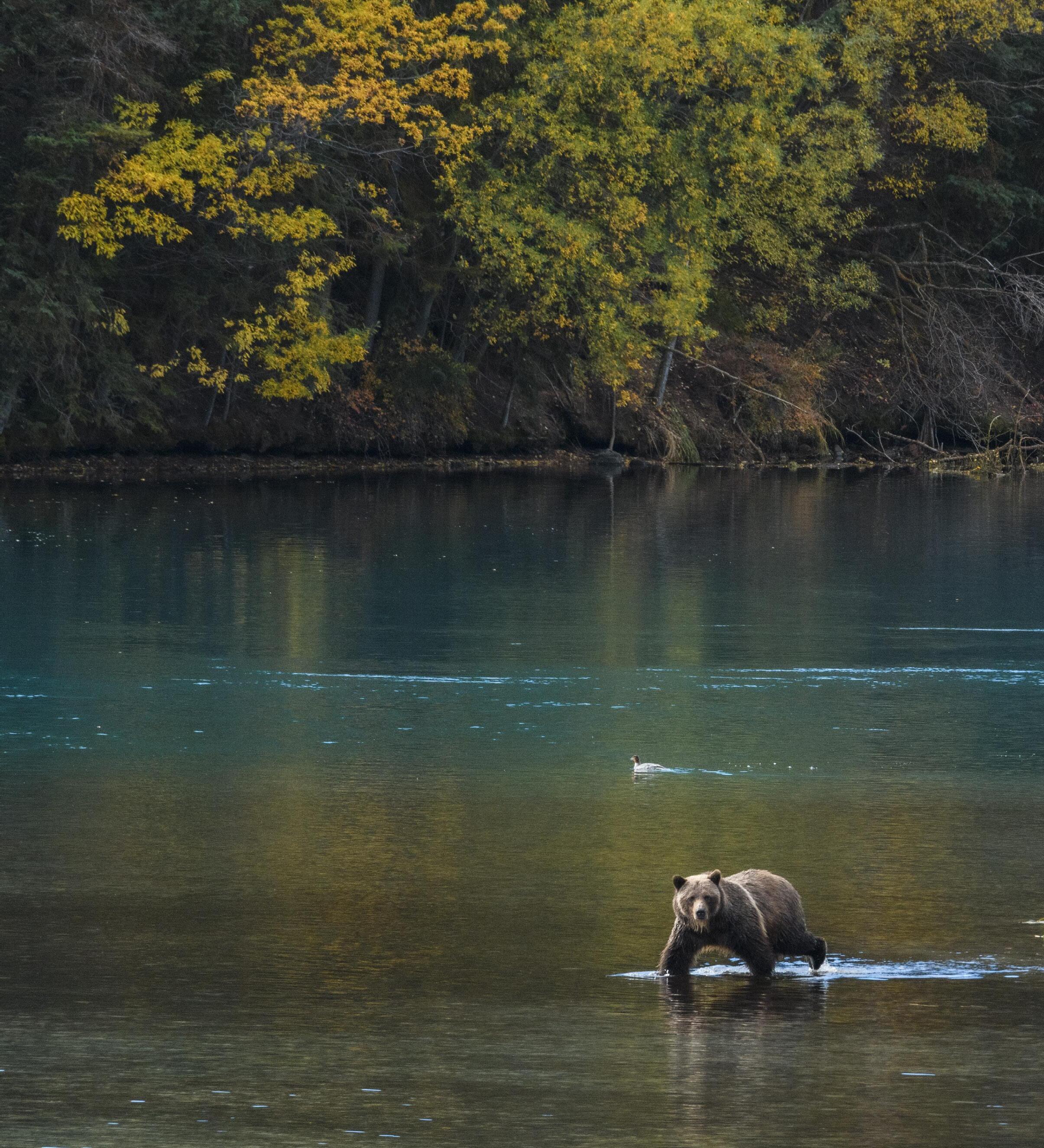
BRUCE MCLELLAN
wildlife research ecologist who has spent more than 40 years studying the grizzly bears of southeast British Columbia
BY MARIANNE SCOTT
74 • BC MAG SPRING 74 PERSON & PLACE

IIn early November 1978, Bruce McLellan got his first shot at collaring a grizzly bear in southeast British Columbia’s Flathead Valley, a wilderness area stretching into northern Montana. It’s been called “the grizzliest place in the interior of North America.”
Accompanied by a Montana colleague, Joe Perry, the two mid-20s guys were checking one of the snares they’d installed. Bruce carried a shotgun, Joe a hunting rifle. Their job was to sedate ensnared grizzlies, attach a radio collar and release them back into their habitat to be tracked and studied.
When they approached the snare, the landscape had changed markedly. Boulders and dirt were strewn around and puffs of steam rose in the frosty air. A large, male grizzly’s foot had been ensnared and he was angry. When he spotted the two guys, he lunged at them with explosive force from the deep pit he’d dug trying to
BC MAG • 75
Destination BC/Yuri Choufour
escape his entrapment. Only the snare cable prevented him from reaching Joe and Bruce, who sprinted back to the relative safety of the Dodge Power Wagon’s steel cab. Unlike the less aggressive black bears they’d collared before, the grizzly inspired deadly fear. Ensconced in the cab, they pondered how much drug it would take to sedate him.
They loaded the dart gun with a half dose and launched it at the grizzly. It had no effect—the bear kept coming. It took several more doses, with the men scurrying back to the truck after each dart, until the 600-pound bear was sedated. Attaching the radio collar was a tough job as his neck measured 36 inches, twice the size of a hefty man’s shirt collar. They named him “Rushes,” to commemorate the way he’d rushed at them. Bruce followed his travels, feeding patterns and hibernation locations until 1981, when someone shot him and cut off his head, claws and hide.
THIS FIRST EXPERIENCE with a grizzly changed Bruce’s life and career. He’d worked in wildlife ecology before tracking deer, elk and black bears, but studying grizzlies became the passion he followed for decades. Recently, he told the tale of this first grizzly collaring and the next decades of bear research in Grizzly Bear Science and the Art of a Wilderness Life—Forty Years of Research in the Flathead Valley (Rocky Mountain Books, 2023). In the book, he intersperses chapters on his family life and studies of Ursus arctos horribilis. Celine, Bruce’s French-Canadian wife, and he kept a “cabin diary” and science data sheets on which parts of the book have been based.
In the prologue Bruce explains that, as part of his graduate studies and as a researcher, he’s published 40-some academic articles about the 200-plus grizzlies he’s trapped, tracked and studied, but that it’s likely only a few other scientists have read the work. “Therefore,” he writes, “I thought it was worth my time to summarize what we have learned [about grizzlies] in a format that more people will read…”
Between 1978 and 2020, Bruce and
Celine lived in a 135 square-foot gamewarden cabin on the banks of the Flathead River. They raised a daughter, Michelle, and a son, Charlie, in the same cabin (with a later addition) and introduced the kids to wildlife ecology from birth. The river supplied drinking water and an outhouse complemented the living quarters. Electrical wires never reached their remote home; only later did solar collectors and batteries provide current for lights, the computer and charging the tracking receiver. A propane-powered stove, fridge and freezer kept the family fed. Fernie was the clos-
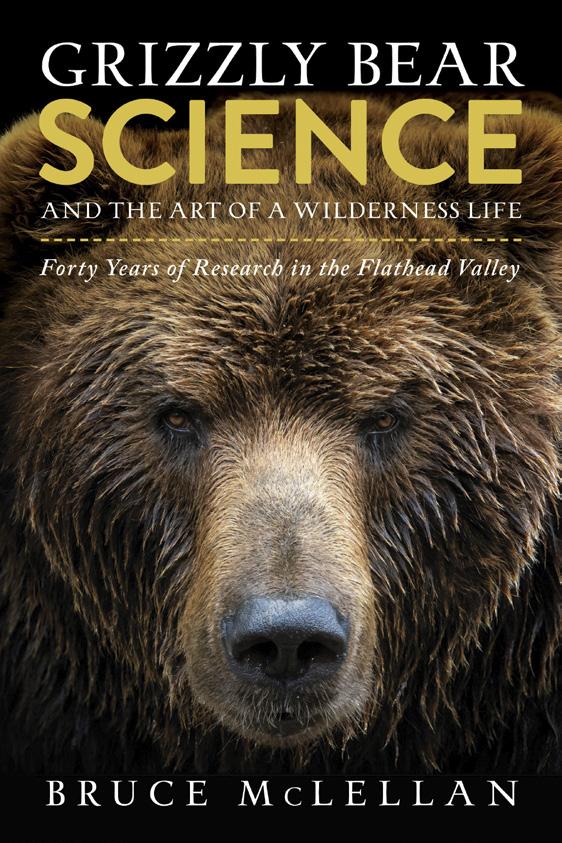
est town and Celine ventured out in an old Volkswagen bus (later a truck) down the rutted trails to provision the family, while Bruce monitored the grizzlies he collared. Bruce hunted sometimes to add to the family diet. Mosquitos were abundant, but as Bruce wrote, “How many evenings did we, as a family spend watching grizzly bears in the mountains? Yep, there were a few mosquitos, but it was better than watching TV.”
During some winters, when bears hibernate for at least five months, the family lived in UBC’s family housing. While the kids supplemented their home schooling by attending public school, Bruce earned master’s and Ph.D.
degrees in wildlife ecology. Celine worked with special-needs kids. “She’s a ‘baby whisperer’ with exceptional talents dealing with children,” said Bruce. Celine dislikes city life and was—and continues to be—happy spending many months each year in what others likely consider primitive living conditions.
BRUCE’S EARLY YEARS prepared him for a wilderness life. His engineer dad built suspension bridges and ski lifts at such places as Lake Louise and Grouse Mountain. The family lived in North Vancouver. “Dad encouraged me to learn practical things,” said Bruce. “And my grandparents had a farm in D’Arcy where I spent much time. It was a place where self-reliance was key and you fixed your own tractor. What I learned there enabled us to survive in isolated conditions. We adapted and could repair most anything. We liked our off-grid lives. And some things in the Flathead Valley were simple. When you don’t have plumbing, there’s nothing to repair.”
Finding funding for grizzly research wasn’t easy. Early in their Flathead Valley sojourn, Bruce cobbled together grants from industry, foundations, non-profits and government. “It was hit and miss,” he said. “Some government funding was short-term, could be cut at fiscal years’ end, or switched to other projects.” Sometimes other studies, like documenting where deer, elk, moose, caribou and mountain goats spent their winter, tied them over. Graduate scholarships also helped. Fortunately, the tiny cabin was rent-free. “Our bills were minimal,” said Bruce. “We never went into debt, Celine is super frugal and we buy our clothes at thrift stores.”
In 1990, the BC ministry of Forests and Ecology employed Bruce full time to study grizzlies and family finances became more predictable. “We much preferred focusing on grizzlies,” said Bruce. “I think there’s a different relationship people have with large carnivores, a special feeling they don’t have with snakes or spiders. I remember sitting in the truck with Celine watching deer. ‘They’re so boring,’ she said. ‘Bears are much more interesting.’ Naturally, I agree.”
76 • BC MAG
PERSON & PLACE
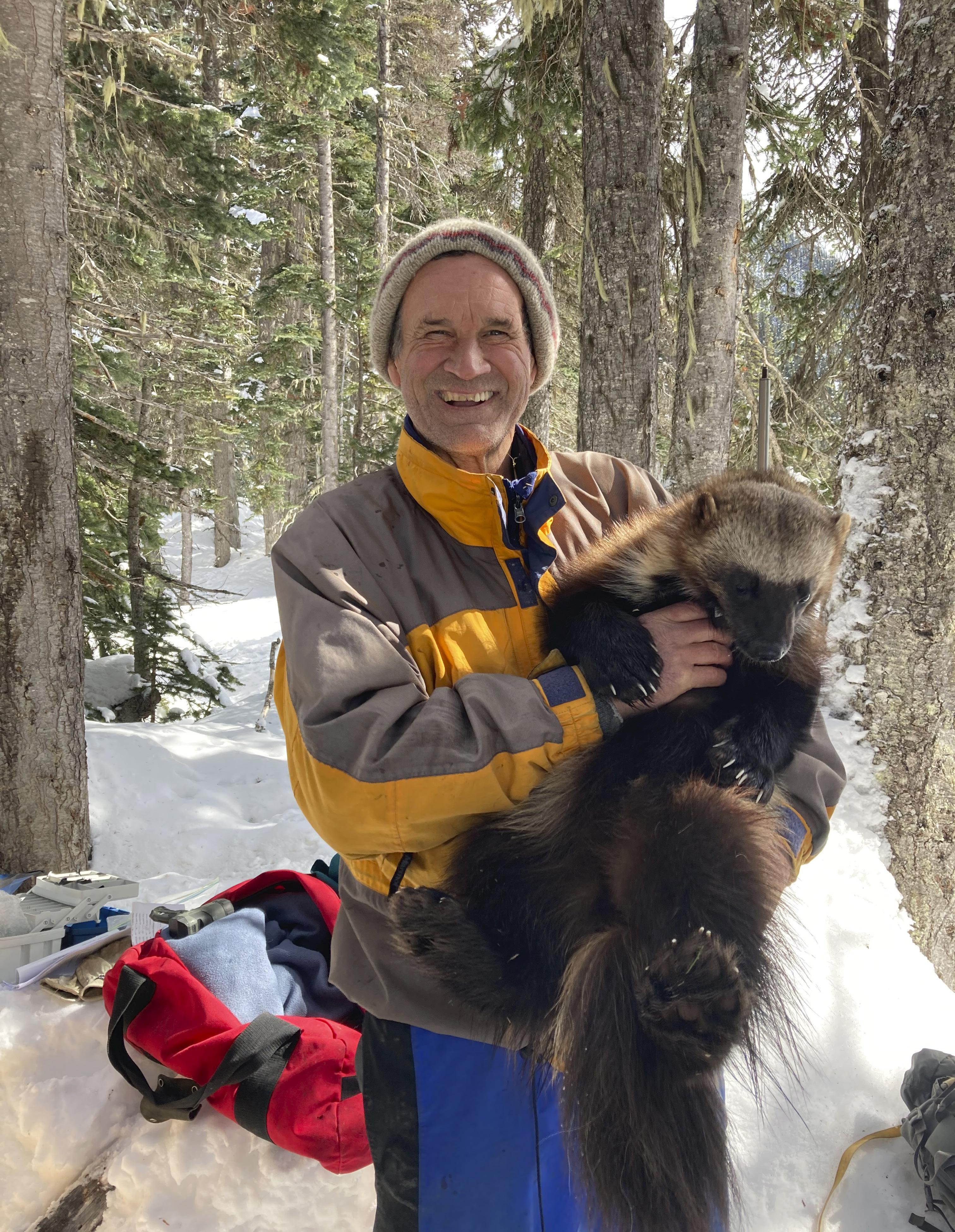
BC MAG • 77
Of course, wilderness living has its adversities. Bruce recounts an 80-kilometre trip from Cranbrook returning to the Flathead cabin in early April. He drove the snowmobile with Celine, a toddler and a baby, while also dragging a skimmer filled with jerry cans and a month-supply of groceries. The slushy snow made it tough to keep the snowmobile and skimmer on track. Then, a debris-filled avalanche blockaded the road and the nearby creek. After a difficult creek crossing via a snow bridge and later repeating that manoeuver past the avalanche, the skimmer tipped twice tossing the family and gear into the snowbank. No one was amused. Leaving the skimmer behind and reaching the cabin, they quickly found heat and cheer in their familiar abode.
STUDYING GRIZZLIES
IS complicated. Except for the couple of years when a mother bear is raising her cubs, grizzlies are solitary creatures, their habits differ from group animals and they can roam across vast areas. Many live in dense forests. Moreover, grizzlies look alike and are sometimes difficult to identify as individuals—especially when viewing them from a safe distance. As a result, they’re hard to locate and track in person. Although they may be seen in numbers at rivers where salmon are spawning, those sightings show only one short-term aspect of their behaviour.
The introduction of radio collars made grizzly research more comprehensive. Instead of tracking solely on foot, Bruce could deploy a tracking receiver with antenna, listen to the pings, identify bears (each had a name) and better estimate the range of their travels and rest periods. Combined with on-foot (or on-ski) tracking, later spotting from aircraft and improved GPS collars, he established multiple bears’ histories, knew their personalities and hibernation locations. They often found dens in mountain caves near the Flathead Valley; some bears use the same den year after year, revealing their excellent memory for that exact crack in the rock.
Documenting the range of male grizzlies, who cover more territory than fe-
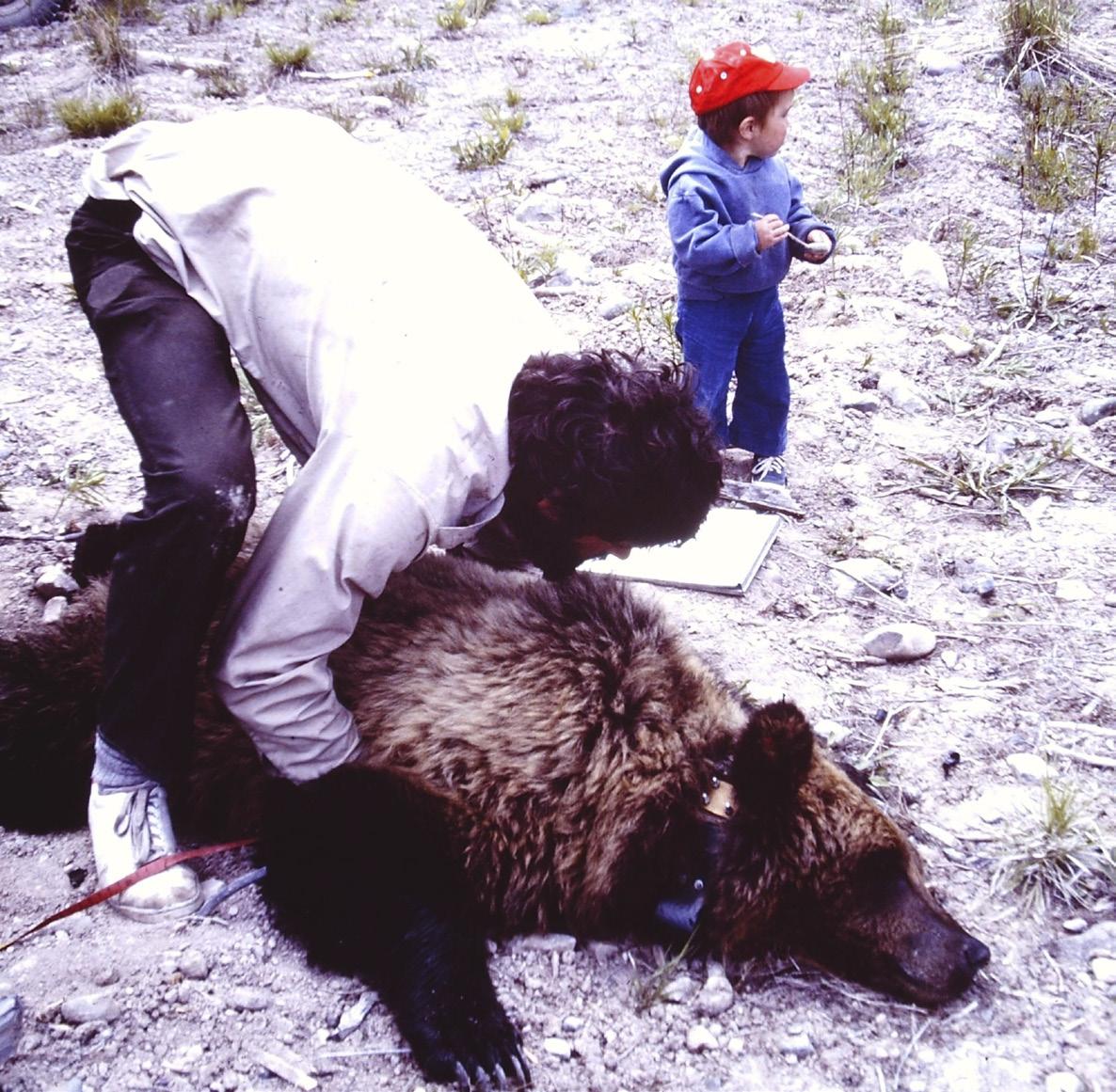
males, presented a particular challenge. Their heads and necks are roughly the same size (more than 30 inches) and their collars frequently dislodged. So later, with Parks Canada funding, Bruce flew in piloted helicopters and darted grizzlies in non-forested areas. After analyzing the data he collected, he wrote that “the smallest range was 69 squaremiles… and the largest 500 square-miles” with multiple bears’ ranges overlapping. He followed specific female bears, when they bore cubs and some over their lifespan of about 32 years. He also includes the family trees of his major bears in an appendix.
BRUCE UNDERTOOK MANY other research projects over his decades of living close to grizzlies: their overall habitat; how roads, mining and logging impact bear habitat and movement; and why grizzlies are relatively scarce.
What and how much bears eat in the Flathead—what Bruce calls the “bottom-up factor” or “grizzly grub”—and when and where these omnivores find food was another subject he explored. “What we now know is that food is the
driver of most grizzly bear populations,” he wrote. “Areas with an abundance of high-energy foods such as salmon, berries or whitebark pine seeds not only attain higher densities of bears, but can withstand higher mortality rates.”
Watching bears eat provides only limited information about their feeding habits, although Bruce reported watching bears fattening up on hefty quantities of buffalo berries and huckleberries in good berry years. A more productive method is following in their footsteps to see where they’ve dug roots, grazed on various plants or eaten parts of animals that hunters leave behind.
ANOTHER METHOD OF uncovering their diet was to examine bear scat following the old adage that “what goes in must come out.” Bruce collected hundreds of scat samples and sent them to the Washington State University’s bear lab for analysis. There, researcher Dave Hewitt compared the samples with captive bear scat. When not all plants bears ate in the wild were found near the lab’s caged bears, Bruce supplied such plants so the research was accurate. Another
78 • BC MAG
PERSON & PLACE
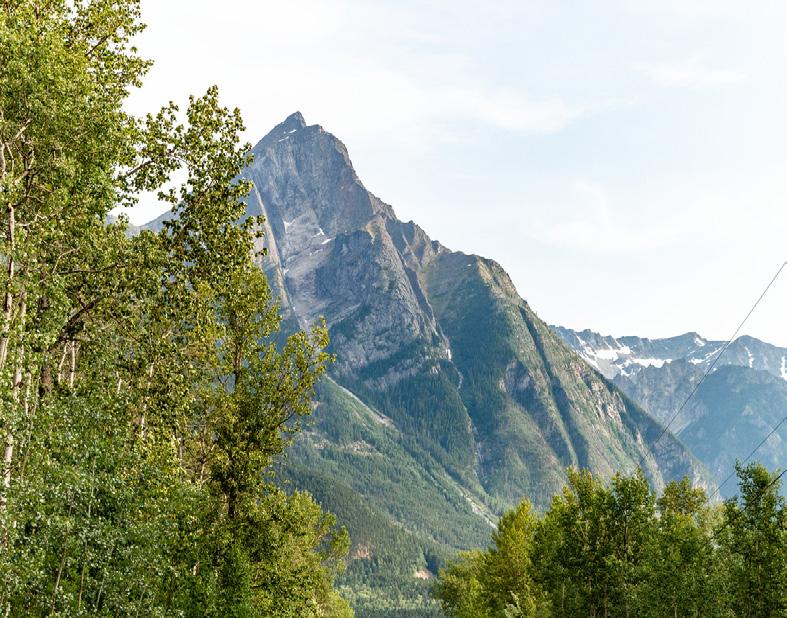
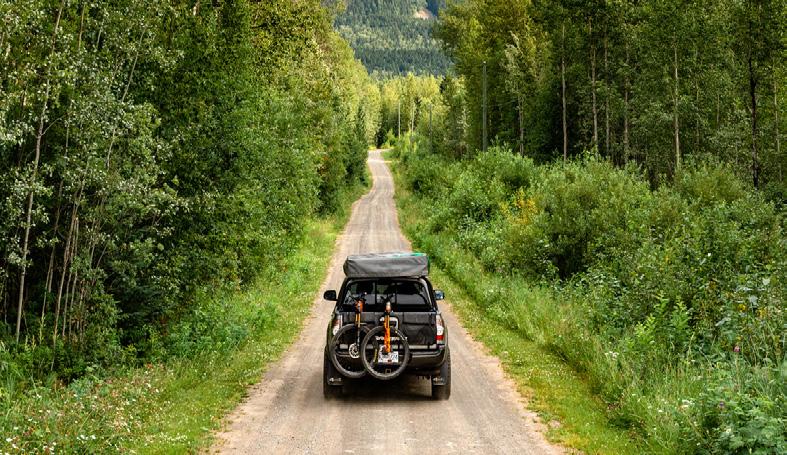


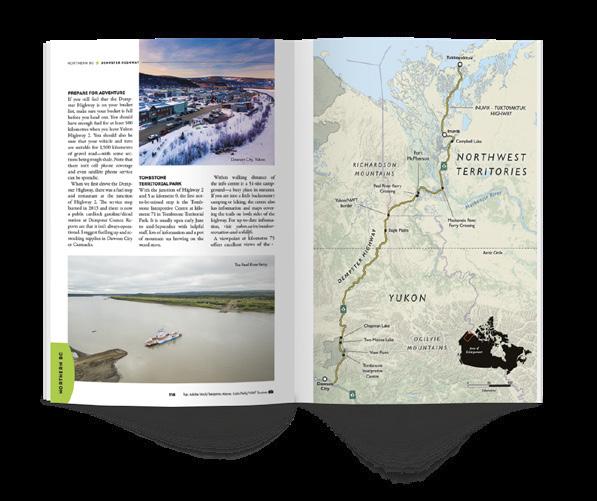






BC MAG • 79 ALSO AVAILABLE AT: ORDER ONLINE BUY ONLINE WWW.BCMAG.CA/ROADGUIDE | 1.800.663.7611 ONLY $1295 NEW EDITION VOLUME 6 - FEATURING: Drivable Diners / Historic Drives / BC Pit Stops / Iconic Destinations Hidden Gems / Cross-Border Trips / Detailed Maps & Drive Times / and lots more! ROAD TRIPS PM 40069119 Escapes CARIBOO CHILCOTIN VANCOUVER COAST & MOUNTAINS THE ISLANDS NORTHERN BC KOOTENAY ROCKIES THOMPSON OKANAGAN A SPECIAL ISSUE OF BRITISH COLUMBIA MAGAZINE $12.95 DISPLAY UNTIL DEC 31 2023 Volume #6 Great DISCOVER OVER 5,500 KMs OF: EPIC BACKROADS SCENIC HIGHWAYS OUTDOOR ADVENTURE More amazing road trips 2024 edition, coming soon
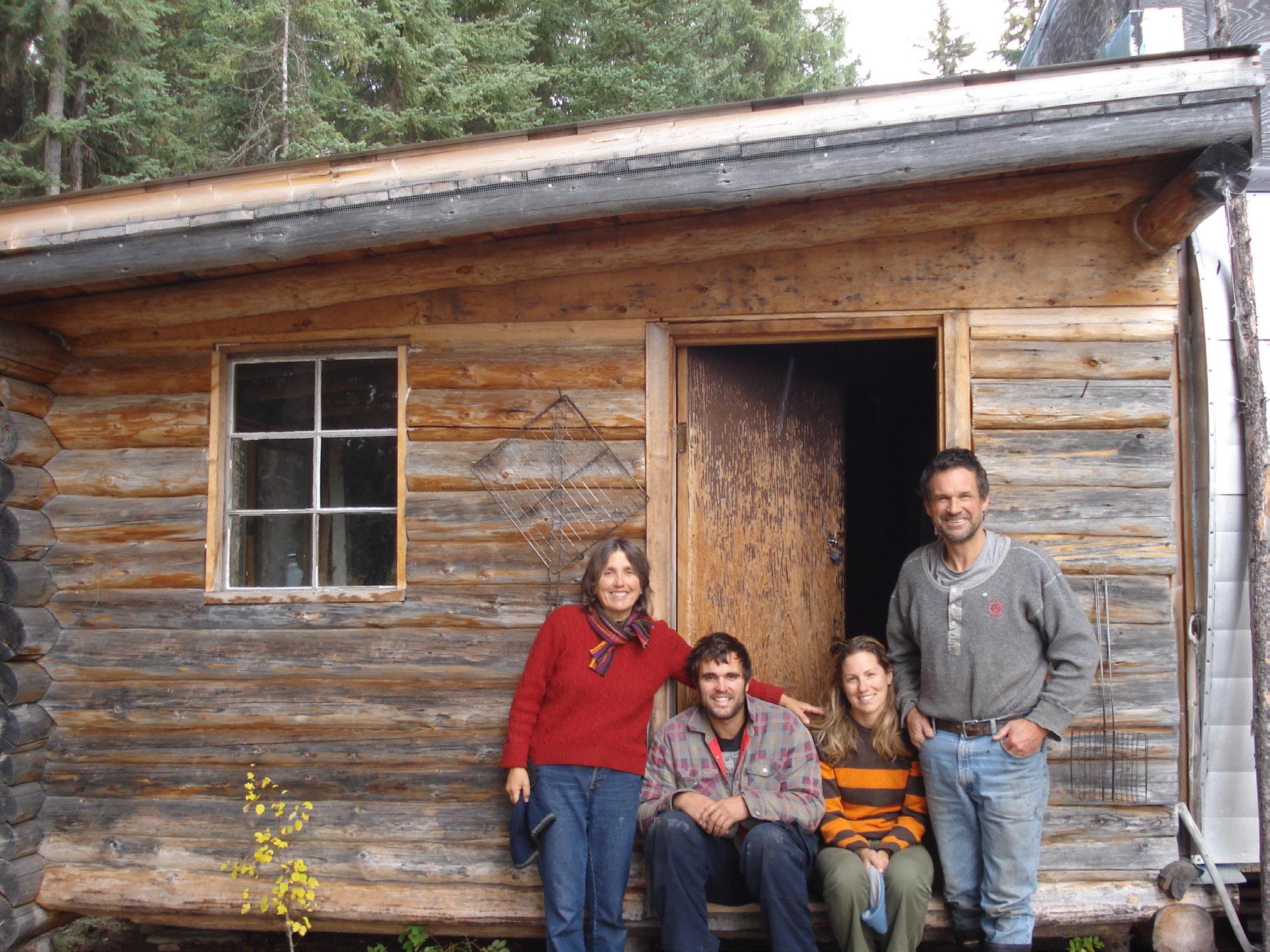
scientist, Bill Callaghan, “the master of bear poop,” stored jars with seed samples of any food bears might eat, and the hair of small mammals like voles and ground squirrels they swallowed whole, thereby providing a list of foods ingested.
The fourth method is “based on different ratios of stable isotope in animal tissue.” The weight of isotopes varies and, Bruce wrote, “isotopes ratios cannot tell much about what species of leafy greens, roots or berries a bear has eaten. However, these ratios can give us an idea of what proportion of their diet came from plants and what proportion from meat.” He added that isotope analysis can be done inexpensively in a lab using various tissues, including animal hair.
IN HIS LATE 60S, Bruce and Celine decided that some of the hard work of bear tracking, darting and collaring, along with the demands of wilderness
“Studying Grizzlies is complicated. They are solitary creatures, and they roam across vast areas
living, should be left to a younger generation. Today, during the winter’s coldest months, the couple camp near Loreto, on the east side of Mexico’s Baja California. I spoke with Bruce by phone; his truck’s battery was keeping it charged. As is their wont, he and Celine live in an isolated wild area down dirt roads, a half-hour from town. “It’s warm and we do everything outside, cook, eat and so on,” he said. “We only sleep in our tiny trailer.” He stopped our conversation when the sun made it too hot for him to stay in the truck. Although there are no bears to study at the shore, Bruce is still the researcher—he free dives and docu-
ments the health of reefs and fish in the Gulf of California.
The rest of the year, the couple lives on the farm Bruce’s grandparents owned in D’Arcy, about 150 kilometres northeast of Vancouver with a 2016 population of 43. “I bought out my siblings,” he told me. “And, with family help, we built a new log house. Our children, who both have earned graduate degrees in wildlife ecology, can bring grandchildren for their turn to appreciate rural life.” The couple manages a small vineyard and orchard on the acreage. “We make great, organic, no-sulfate cider,” Bruce said, “and bad red wine.” Wild animals are still part of their lives, however, and he’s installed electric fences to keep out the black and grizzly bears who like to eat the apples and grapes.
“I still like bears,” he said. “I’m not just talking about them. “I’m walking the walk. I live it.”
80 • BC MAG
PERSON & PLACE
Celine, Charlie, Michelle and Bruce McLellan in front of the log cabin they inhabited for decades

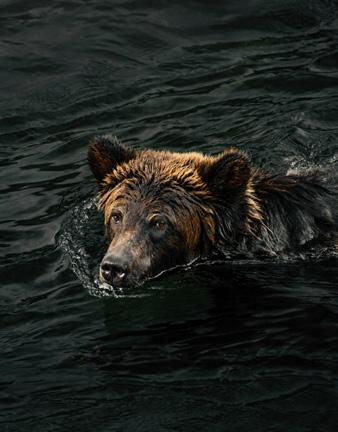

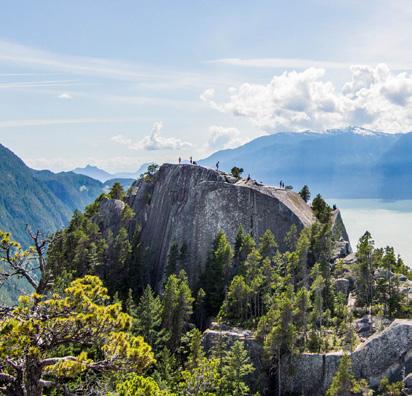
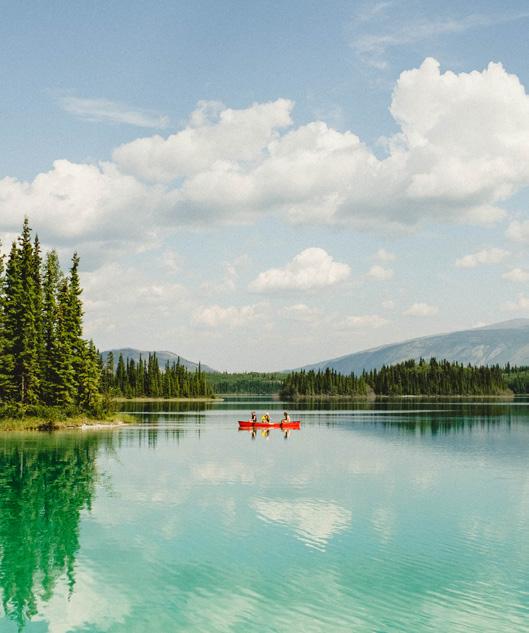
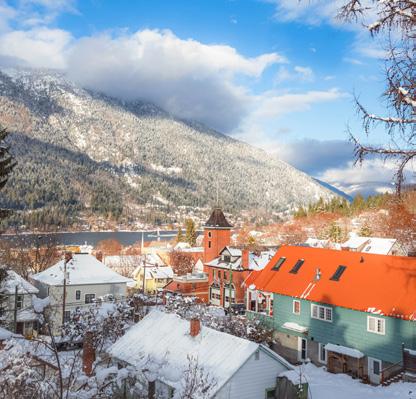
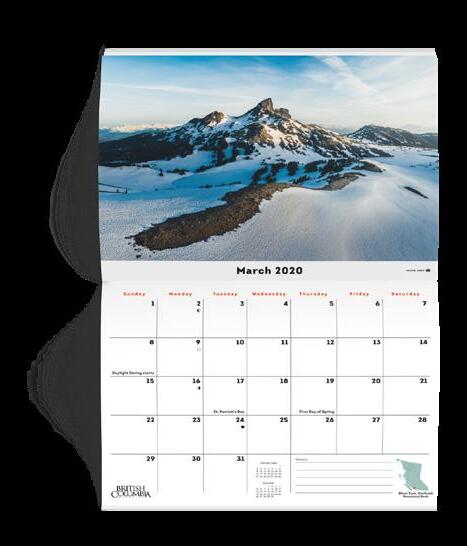
send the magnificent beauty back into the water.
Dogfish are a popular marine delicacy, the key ingredient of famed British fish and chips, but we are not here to find dinner. With our proximity to the city, the water our dinghy bobs up and down on doesn’t exactly have the best reputation for being a pristine waterway. A hundred years of unbridled industrialism dumped enough of Godknows-what into this body of water to keep anything caught here well away from my dinner plate.
As spiny dogfish number one splashes off to freedom, we give it our customary farewell:
“See you later, buddy.”
My son and I laugh and shout and high-five each other. What a rush of excitement! Our celebrations are cut short when my son’s rod bends nearly in half. Something has crushed his bait.
“Fish on! Fish on!” He yells.
It’s now my turn to man the net. spiny dogfish sharks get their name because, like dogs, they hunt in packs. To our incredible good fortune, my son and I have stumbled upon a pack. In just over two hours, the cry “Fish on! Fish on!” is heard 18 times. We are forced to retire only after all our bait is gone and our rigging smashed to smithereens.
As we nose our little boat toward home, Darve and I still shake with excitement. This little expedition in our backyard ocean pond is officially our best day of fishing ever.
BC MAG • 81
TALES OF BC SEND US YOUR STORIES! Have a funny or interesting BC story? Tales of BC is a reader-submitted column and we are always looking for another good yarn.
your
story and supporting images if available to editor@bcmag.ca
be featured in the next issue! Order Online at www.bcmag.ca or Call 1-800-663-7611 FALL/2021 DESTINATION INDIGENOUS TOURISM PADDLING IS ECOTOURISM HELPING BC’S BEARS? Photo Contest BC’S BEST DINERS, DRIVE-INS CAR HOPS NELSON DESTINATION A KOOTENAY WINTER WONDERLAND DESTINATION HOWE SOUND ÁTL’ K A7TSEM ESCAPE TO THE NORTH BEAR ATTACK UNESCO'S NEWEST BIOSPHERE REGION SUMMER/2022 DESTINATION PARKSVILLE QUALICUM BEACH BCMAG.CA PM 40069119 $8.95 The CLIMATE Issue Implications of the HEAT DOME Bringing FIRE Back to the Land Plus NOOTKA SOUND ADVENTURE CATS IN THE BACKCOUNTRY WANT MORE BRITISH COLUMBIA MAGAZINE? SUBSCRIBE TODAY REDUCED RATES ON ALL SUBSCRIPTIONS SCAN TO SIGN UP TODAY! FREE Calendar with all subscriptions
Send
600-word
and it might

A DOGFISH BONANZA
BY DENNIS WILKINSON
II feel the nibble, but years of failure and disappointment make me dismiss it. It’s probably a snag or a sea cucumber. Perhaps it’s a tiny crab trying to steal the bait. Surely, it can’t be a fish, can it? There it is again! This time, the tug is more substantial. The tip of the rod bends toward the water. Something down there is taking the bait. It’s impossible to tamp down my excitement now. I grip the rod firmly and
snap it backwards, setting the hook in the fish’s mouth. The fight is on! I can tell right away that this is nothing like the puny fish my son and I have grown accustomed to catching over the years. Adrenaline surges as the creature on the other end of the line yanks, tugs and pulls.
“Fish on! Fish on!”
I yell to my son. He instinctively grabs the net and begins scanning the water for the first glimpse of what we are up against. Only 15 feet from the boat, it breaks through the surface with a considerable splash.
“Shark!”
We both yell at the same time.
Our quarry is the Pacific Northwest’s spiny dogfish shark, a beautifully spotted and spirited creature abundant in
our waters near Vancouver. It is tiny as far as sharks go, weighing between two and 20 pounds, but for my son and I, as inexperienced and unsuccessful as we have been, it may as well have been a great white.
The real surprise is where we are when we hook into this thrashing ball of muscle and cartilage. We are only minutes from home and in as urban an environment as you can get.
The wrestling match between man and nature goes on for several minutes. At last, we have the exhausted predator beside our boat. Our net is smaller than it needs to be, but it will have to do. We clumsily scoop the big catch out of the water, trying to avoid the teeth and the two venomous spines on its back. I take the hook out, snap some pictures and
Mike Mockford
82 • BC MAG TALES OF BC SPRING
Continued on Page 81




Great 2.43 acre lot with 222 feet of oceanfront, private building site and site lines cleared, gradual slope to the oceanfront with trail access to the water. Shared well. Great sunrises and light from the south. Near Hamley Point Conservancy. Airstrip, swimming pond and island caretaker. Priced to sell. NOW! $449,500
RICHARD OSBORNE Personal Real Estate Corporation 604-328-0848 rich@landquest.com
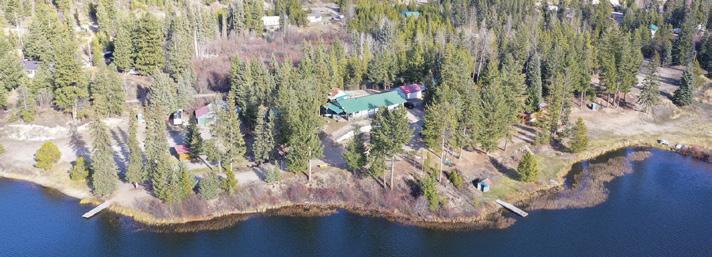
FAMILY
CAMPGROUND ON LINK LAKE PRINCETON, BC
Great lake front campground situated on 5.2 acres with over 1,800 ft of Southwest facing lake frontage. Backing onto the Kettle Valley Railway Trail, this property features 14 serviced campsites, bathrooms with shower facilities, two 1 bedroom cabins, a 1,600 sq. ft. main residence and three large workshops. $1,500,000
KEVIN KITTMER 250-951-8631

LAKEFRONT RANCH ON TATALASKA LAKE GRASSY PLAINS, BC
Idyllic 229 acre lakefront ranch with 1,726 acre grazing licence. 118 acres of hay fields. No zoning. 2 homes built by the owner, a 1,344 sq. ft. bungalow and a 4,110 sq. ft. Quonset style 2 level home. Water rights for irrigation and stock watering. Equipment list available on request. $849,000
SAM
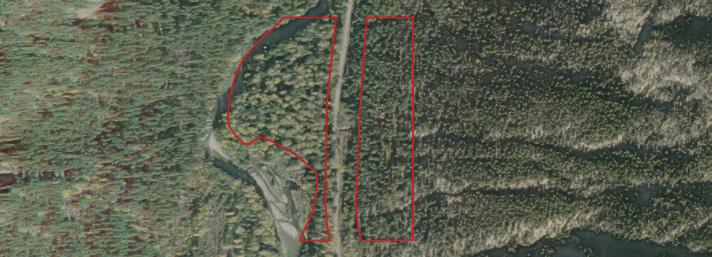
RIVERFRONT

ACREAGE ON THE SEA-TO-SKY HIGHWAY - PEMBERTON, BC
Just one hour north of Pemberton on Highway 99 sits this fully treed acreage at a bend in Cayoosh Creek. There are only 8 private parcels from Mount Currie to Lillooet on the Duffey Lake Road, this one has 2,165 ft of water frontage and spans both side of the road. $519,000
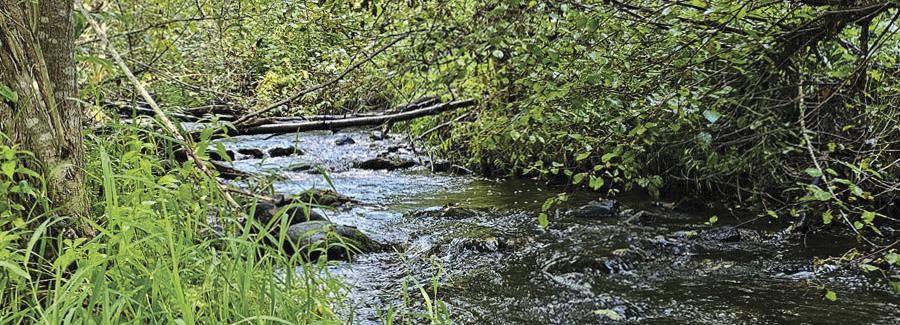
105 ACRES OF NATURAL SERENITY YEAR-ROUND CREEK! GREENWOOD, BC
105 acres predominantly second growth pine. Trails, natural benches, building sites and - no zoning! Opportunity abounds for the visionary. Year-round creek attracts wildlife and provides summer respite. Direct access to the Kettle Valley Rail Trail. Minutes from Greenwood. $499,000

158 acre farm just 15 minutes from the highway. Perfect mix of farming potential and natural charm. 50 acres of efficiently irrigated hay cultivation, modern livestock facilities, extensive grazing rights, delightful 3 bedroom home surrounded by a fenced yard and timberland. $1,299,000
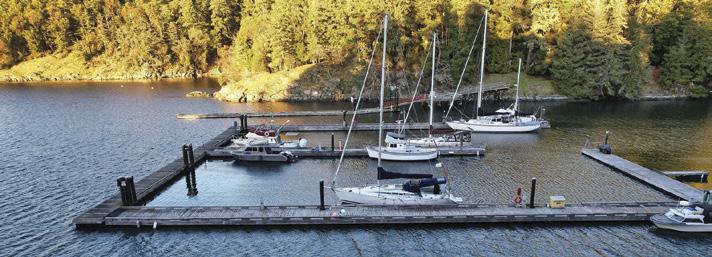
MUSGRAVE LANDING HOME AND MOORAGE - SALT SPRING ISLAND, BC
Oceanfront property with custom 3 bedroom, 2 bathroom home, separate studio / guest cabin. Private marina, moorage at your doorstep. Road accessible with services. Ideally situated in the Southern Gulf Islands with easy access to Vancouver Island. $1,250,000
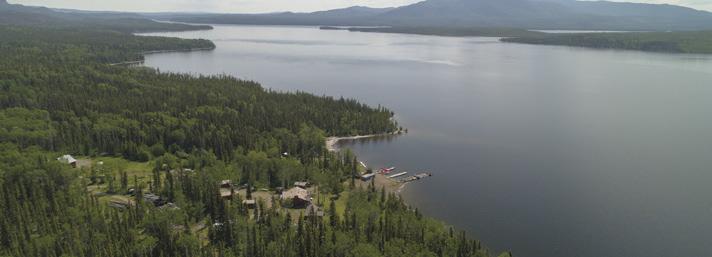
FISHIN’ HUNTIN’ AND LOVIN’ EVERY DAY NECHAKO LODGE - KNEWSTUBB LAKE, BC
The Nechako Lodge has six guest rooms, a commercial kitchen and large gathering area. There is also a two bedroom residence, four cabins and six RV sites. Solar and wind power the property. Includes a foreshore lease with docks, breakwater and boat launch. $795,000
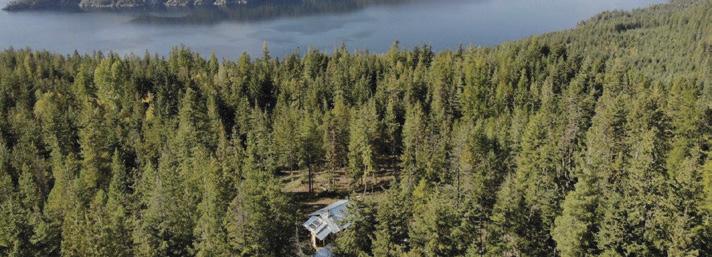
THE ULTIMATE
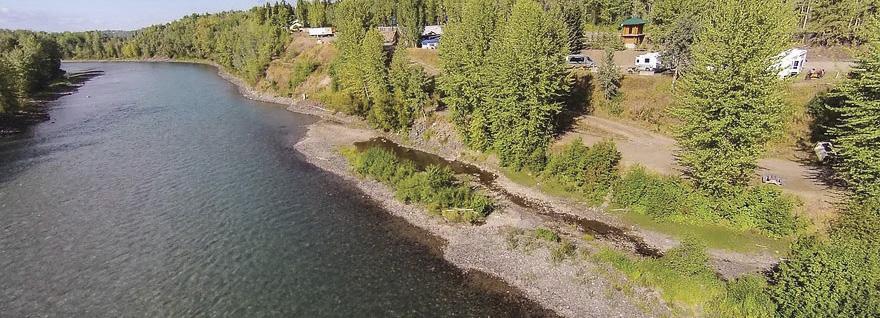
RIVERFRONT RV PARK AND HOME TELKWA, BC
Income potential! 7.14 acre riverfront home and RV park nestled along the shores of the scenic Bulkley River in Telkwa, BC. 34 serviced RV sites, laundry facilities, boat launch, 2 bedroom bunk house and 3 bedroom home with office. Convenient riverfront location renowned for its wood class fishing and haven for travellers. $730,000
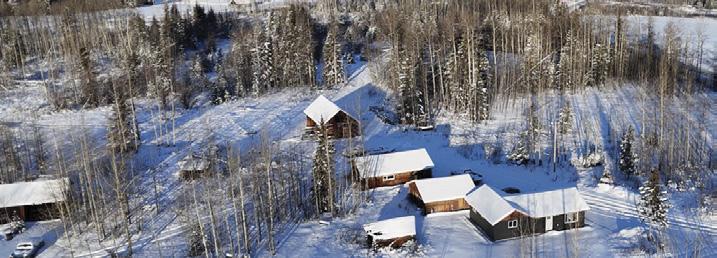
A picturesque 139 acre Francois Lake property, located just a short drive from the ferry terminal, fuses rustic allure with modern updates, featuring a recently upgraded home, functional outbuildings, and approximately 70 acres in hay, poised for farming or recreation. $429,000

5.4 ACRES IN 3 TITLES
LEVEL FORT ST. JAMES RIVERFRONT
Located just minutes from town center the nicely treed lots are located just as Stuart Lake becomes Stuart River. Build three residences or just keep a couple lots for an investment. Hydro, gas and Internet are available all along paved Sweder Road. Outdoor Life at its finest. $295,000
® Marketing British Columbia to the World® www.landquest.com Toll Free 1-866-558-LAND (5263) Phone 604-664-7630 Visit Us This 10 acre property has a mature forest perched above the East Shore of Kootenay Lake. 2 cabins each with solar setup, cell service, wood heat and a wood / gear shed. Fenced garden, chicken coop, well with lots of water, seasonal creek and a wood fired hot tub and bread oven! No zoning. $349,000 COLE WESTERSUND - WESTERN LAND GROUP Personal Real Estate Corporation 604-360-0793 cole @landquest.com MATT CAMERON 250-200-1199 matt @landquest.com KURT NIELSEN 250-898-7200 kurt @landquest.com COLE WESTERSUND - WESTERN LAND GROUP Personal Real Estate Corporation 604-360-0793 cole @landquest.com JOHN ARMSTRONG Personal Real Estate Corporation 250-307-2100 john @landquest.com JOHN ARMSTRONG Personal Real Estate Corporation 250-307-2100 john @landquest.com ROB GREENE 604-830-2020 rob @landquest.com JASON ZROBACK 1-604-414-5577 JAMIE ZROBACK 1-604-483-1605 BC LANDPRO GROUP FAWN GUNDERSON Personal Real Estate Corporation 250-305-5054 fawn @landquest.com
Personal Real Estate Corporation
sam @landaquest.com
HODSON
604-809-2616
kevin @landquest.com
BACKCOUNTRY HOMESTEAD GRAY CREEK, BC
158 ACRE FARM WITH GRAZING RANGE AGATE BAY VALLEY - LOUIS CREEK, BC
SERENE 139 ACRE HOBBY FARM SITUATED ON THE SOUTH SIDE OF FRANCOIS LAKE
Maxar
SIDNEY ISLAND OCEANFRONT STRATA LOT 57 - SOUTHERN GULF ISLANDS
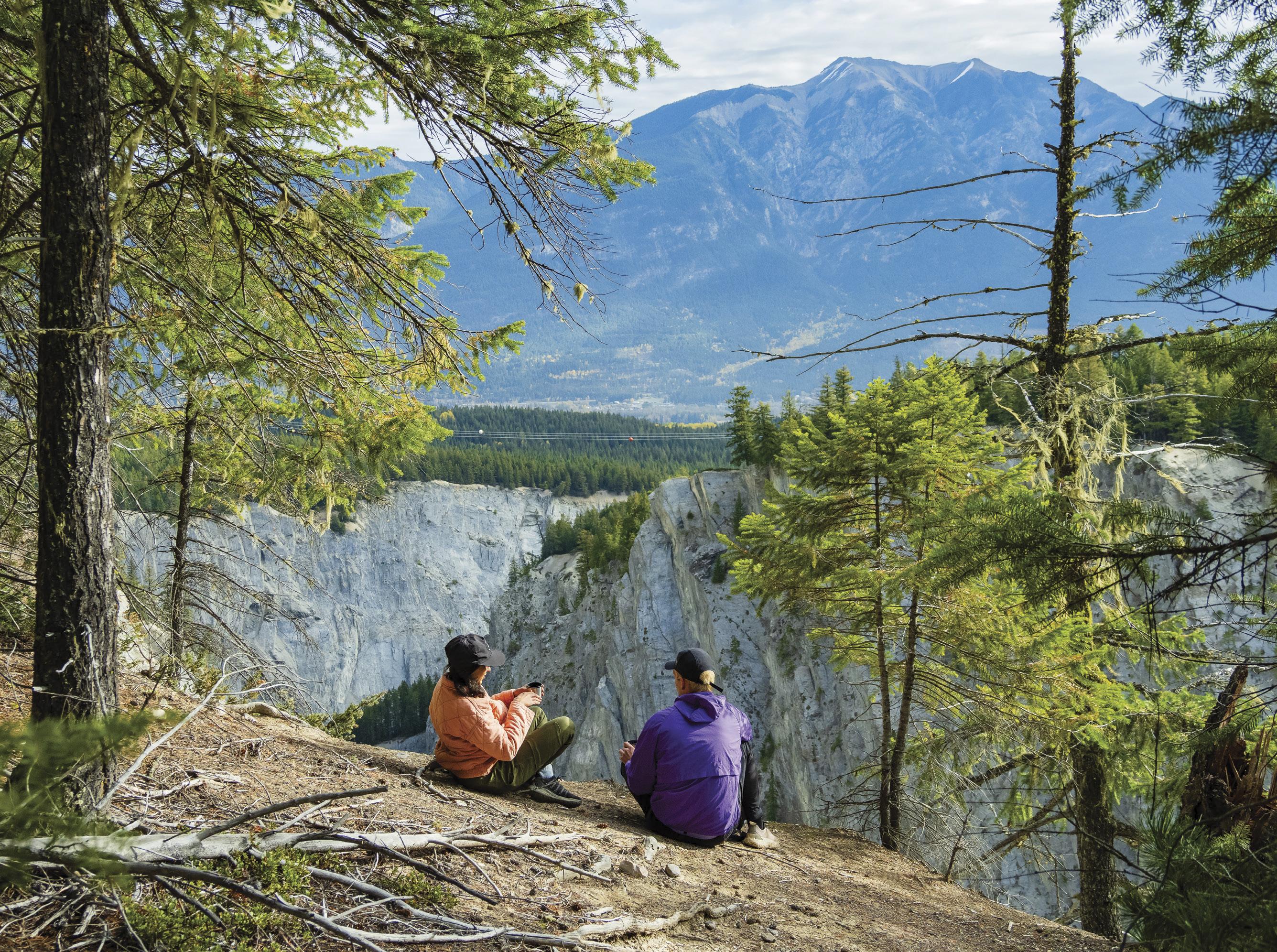
Stunning Spring in Golden BC
Surrounded by six of Canada’s most spectacular national parks and sitting at the confluence of two historic rivers, Golden is rich in heritage and awash with striking mountain scenery.
Visit Golden to experience an authentic mountain town and spend the day exploring world-class hiking, biking, rafting, wildlife watching, and other adventures.
Start planning: tourismgolden.com/goldenbc
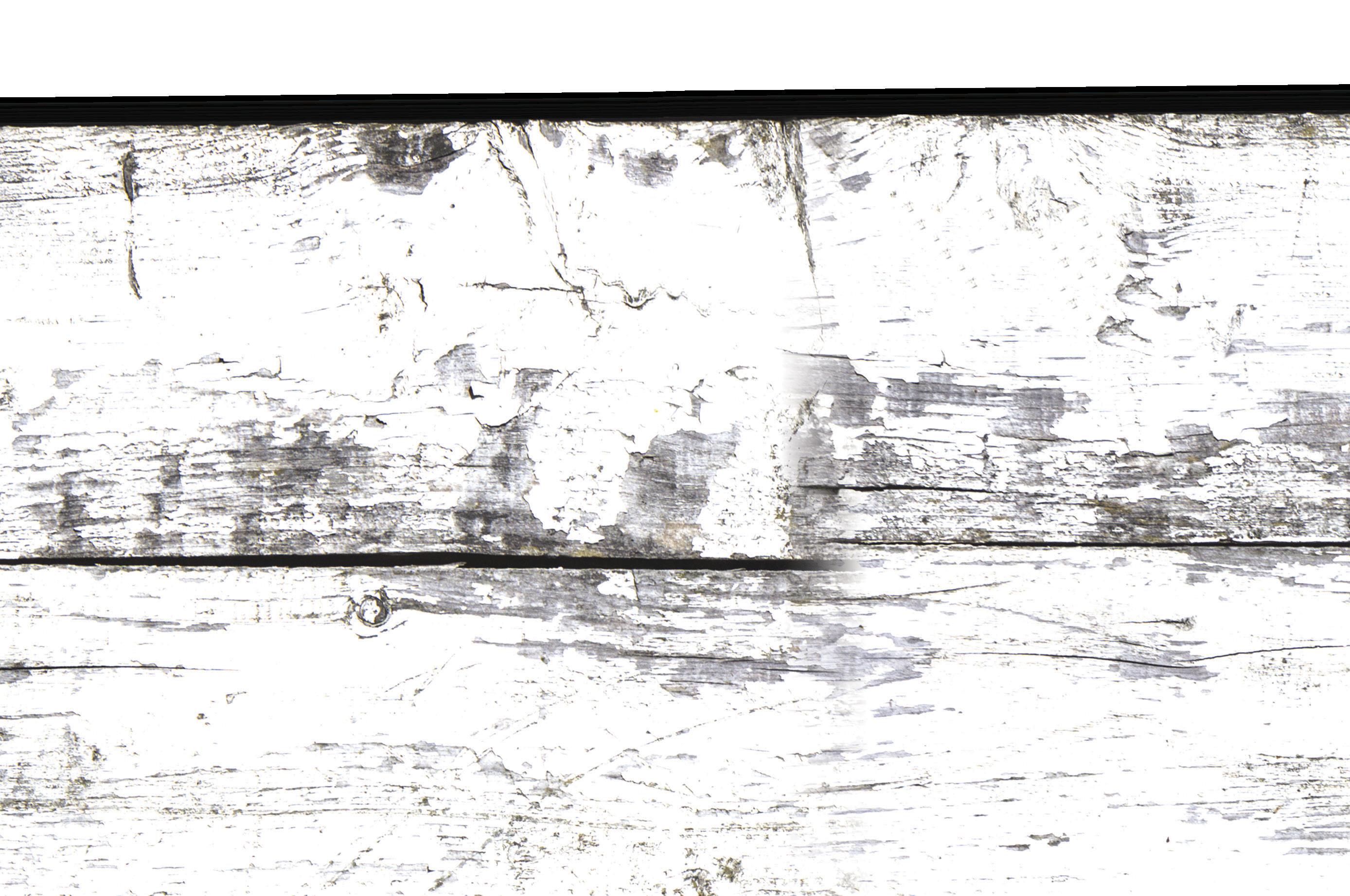
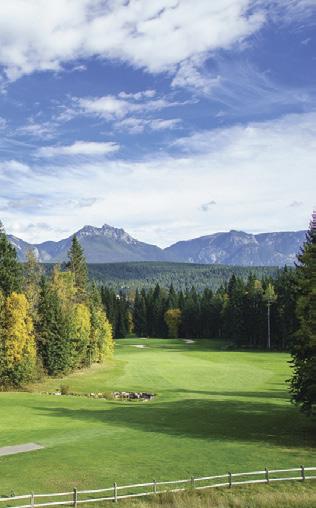
Golden Golf Club
We are located in a peaceful setting just minutes from Golden.
We offer something for everyone with our award winning 18-Hole golf course, 42-site RV Park, restaurant, and mini-golf course.
1-250-344-2700
www.golfgolden.com
Seek and you will find.
tourismgolden.com
Photo by: Maur Mere Media
Safety is your responsibility. Be prepared and always respect the environment. Find more hints and tips on travelling safely and responsibly at www.tourismgolden.com/travel















































 SPORTS
SPORTS




















 Copper Eagle Bakery & Cappuccino—a favourite stop on Copper Street.
Adobe Stock/edb3_16
Copper Eagle Bakery & Cappuccino—a favourite stop on Copper Street.
Adobe Stock/edb3_16












 BY Cherie Theissen
BY Cherie Theissen


















































 BY LESLIE ANTHONY
BLAKE JORGENSON
PHOTOS
BY LESLIE ANTHONY
BLAKE JORGENSON
PHOTOS







 Wear protective clothing while harvesting stinging nettles.
Wear protective clothing while harvesting stinging nettles.






















 STORY & PHOTOS BY ISABELLE GROC
STORY & PHOTOS BY ISABELLE GROC
 A male rufous hummingbird visits a nectar flower.
A male rufous hummingbird visits a nectar flower.

















































